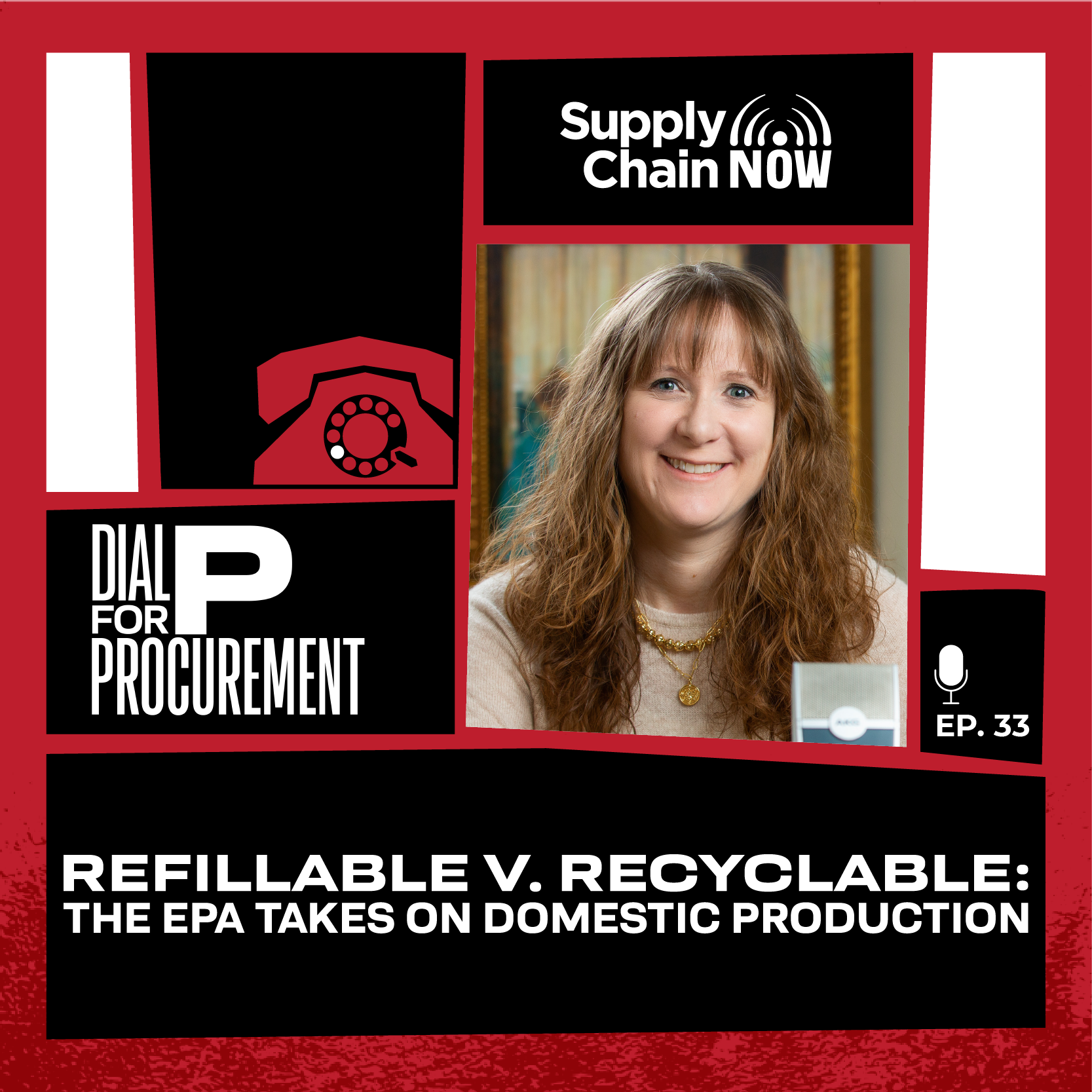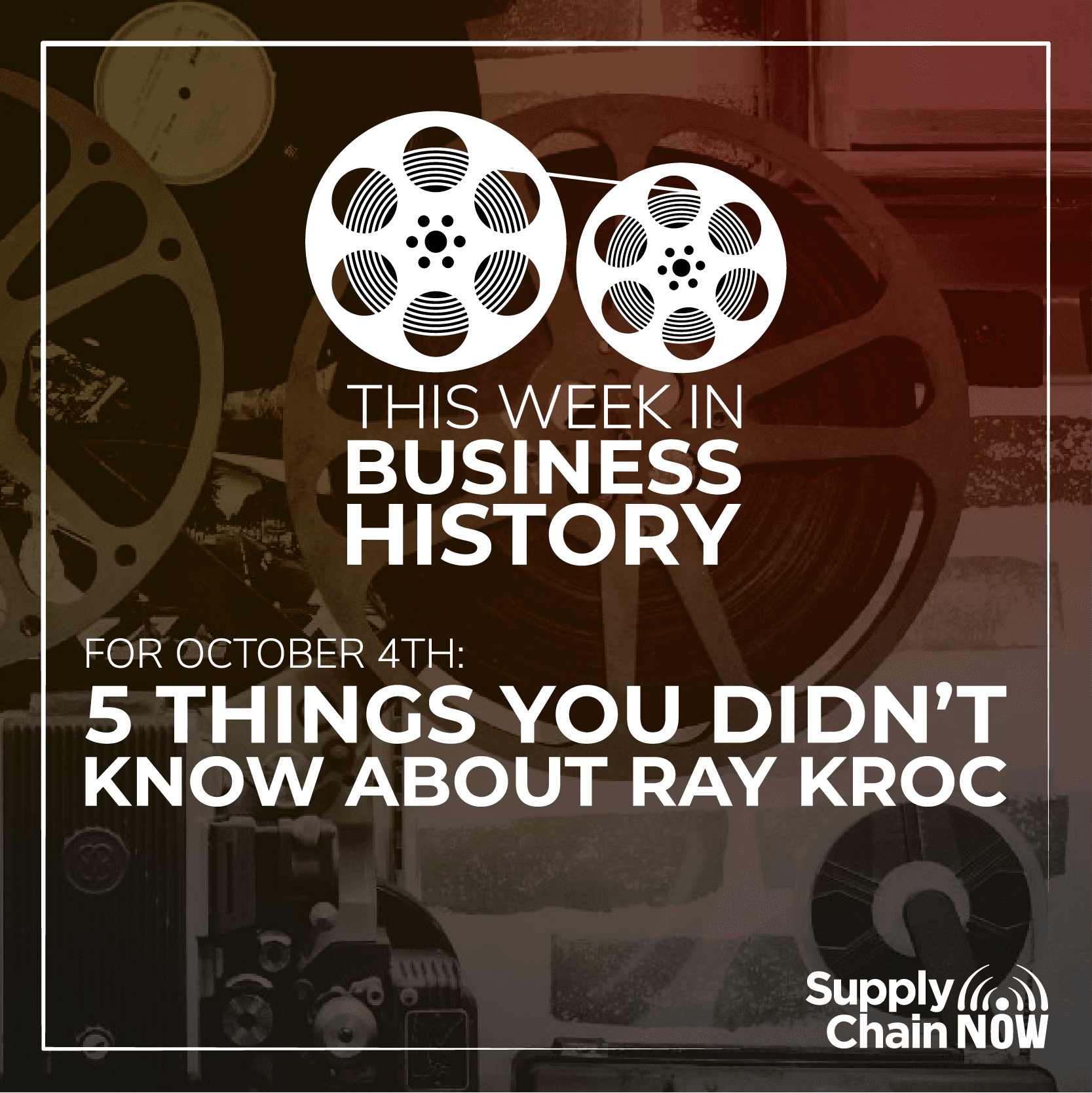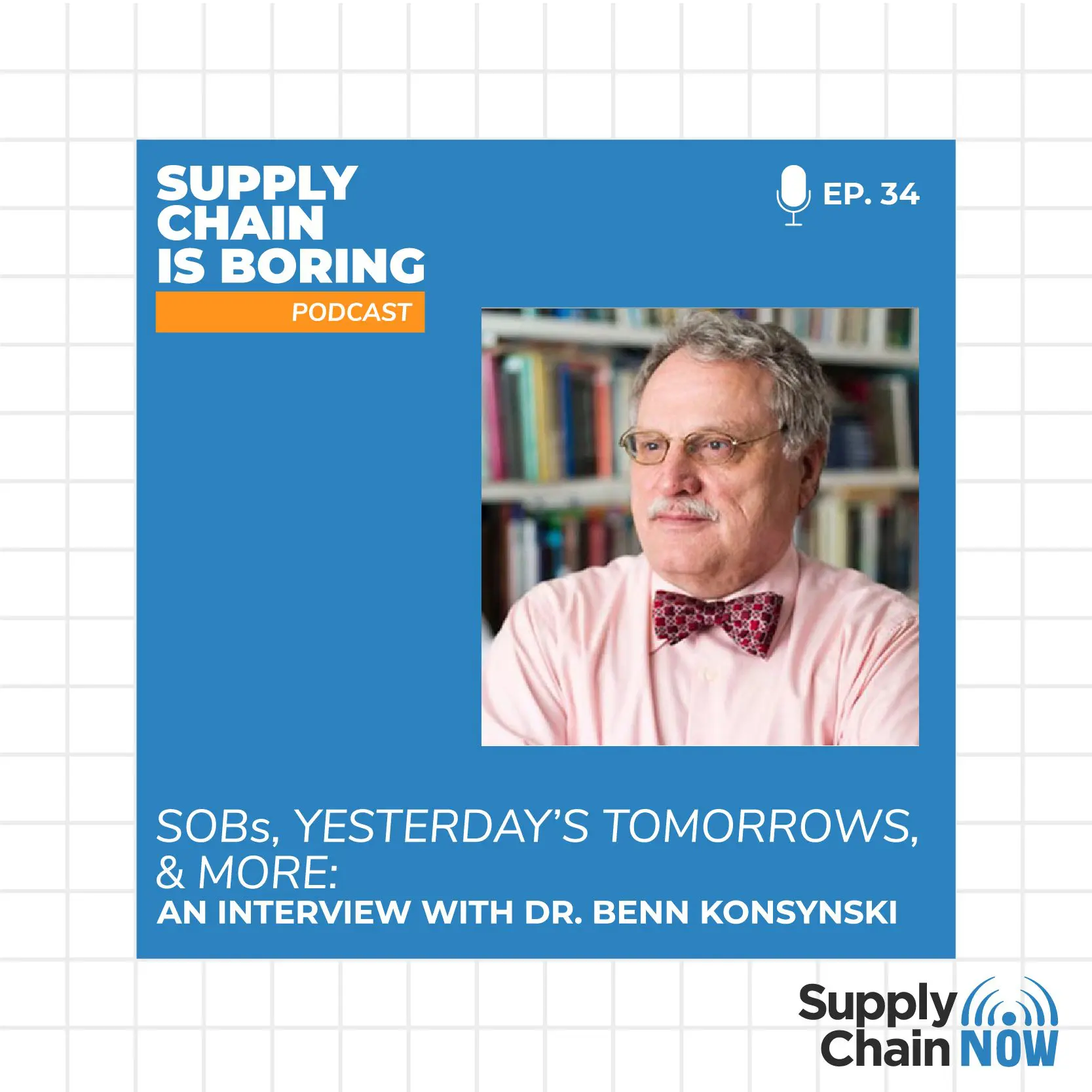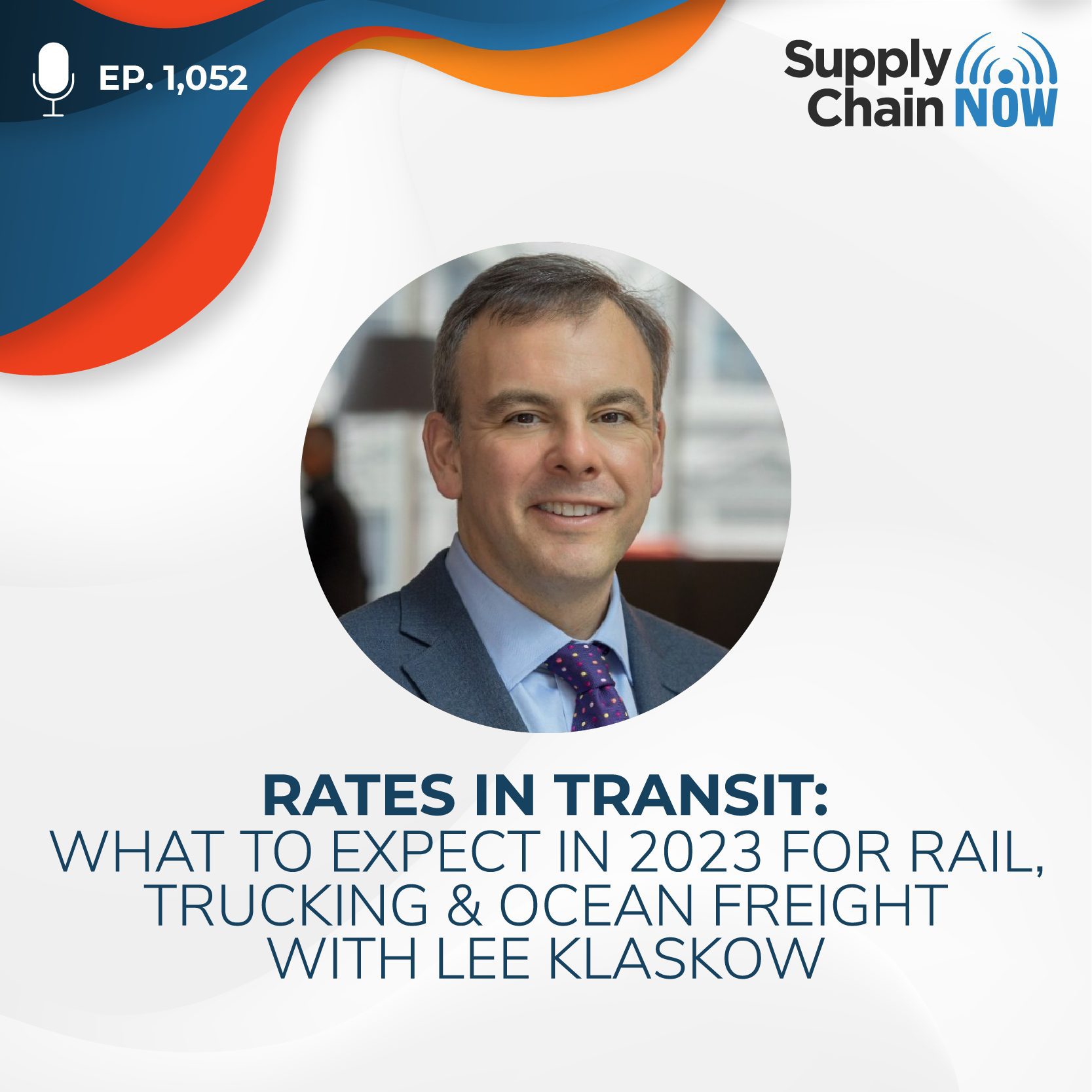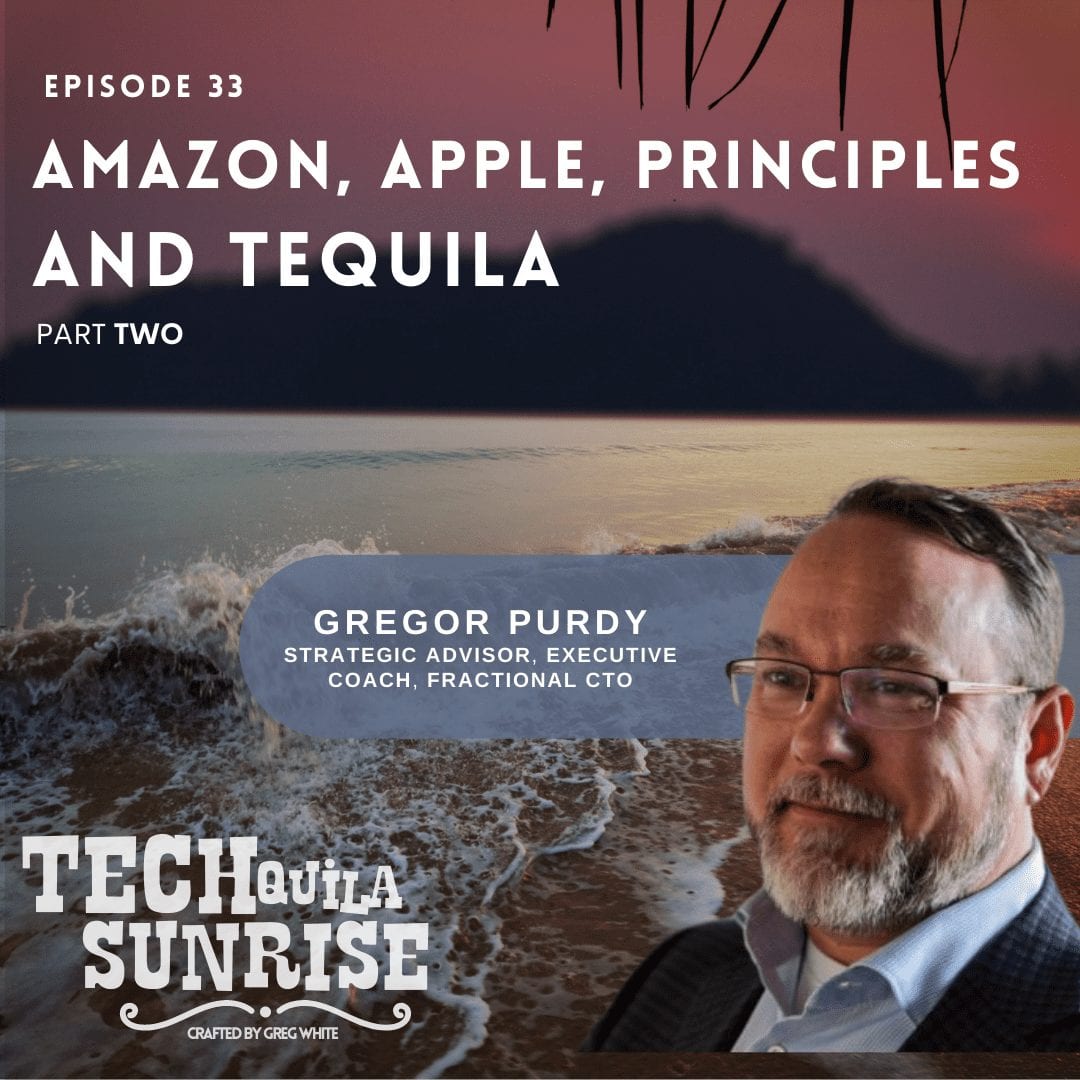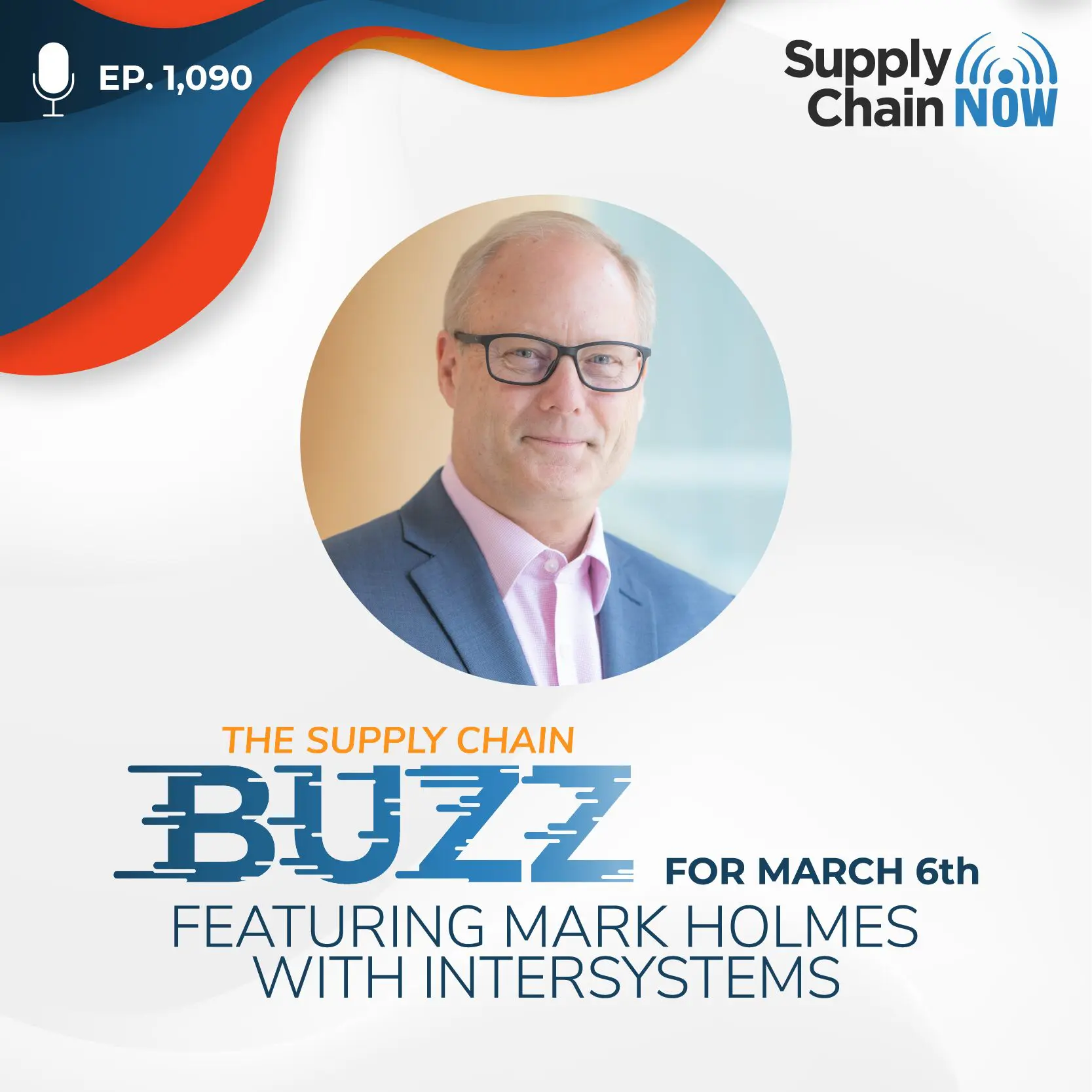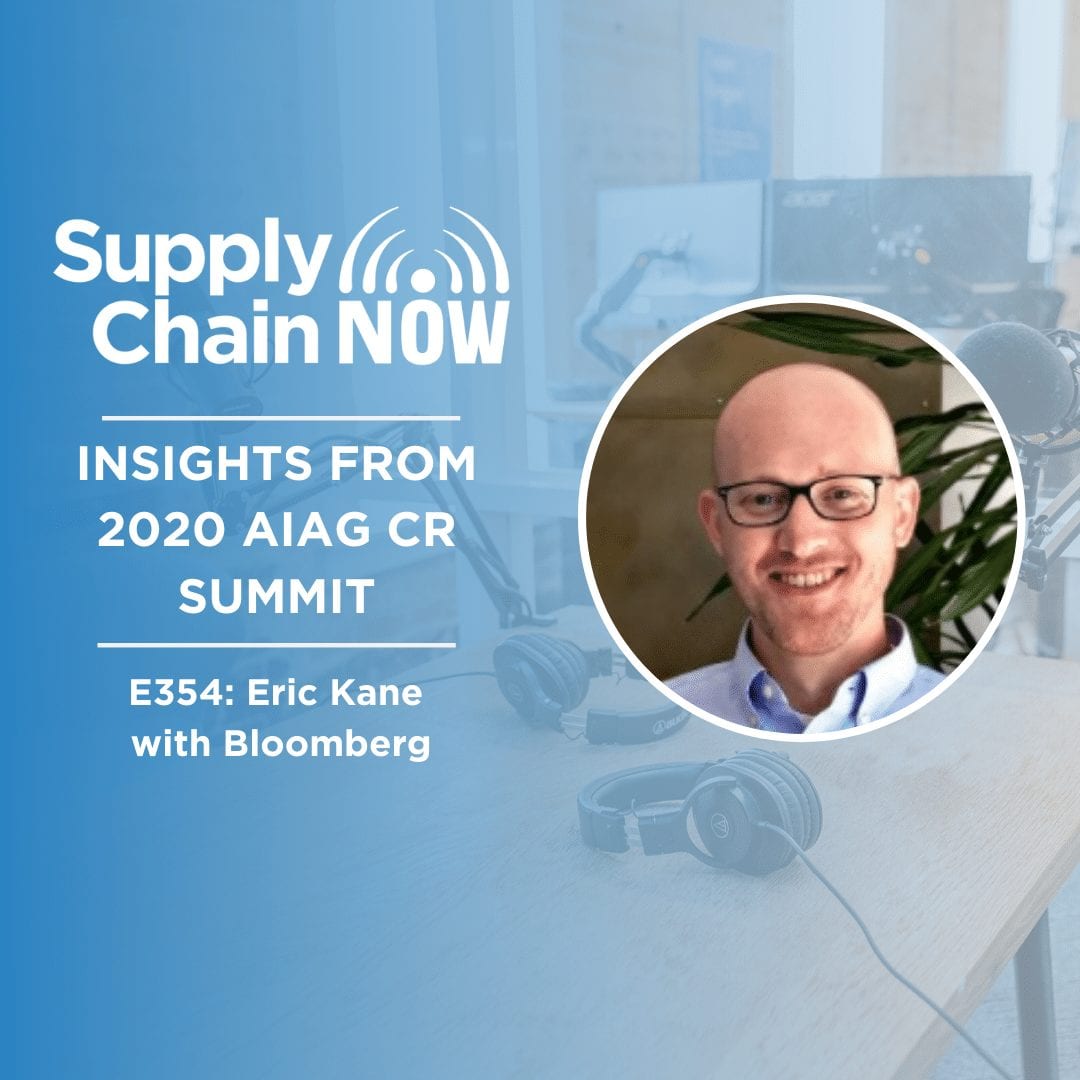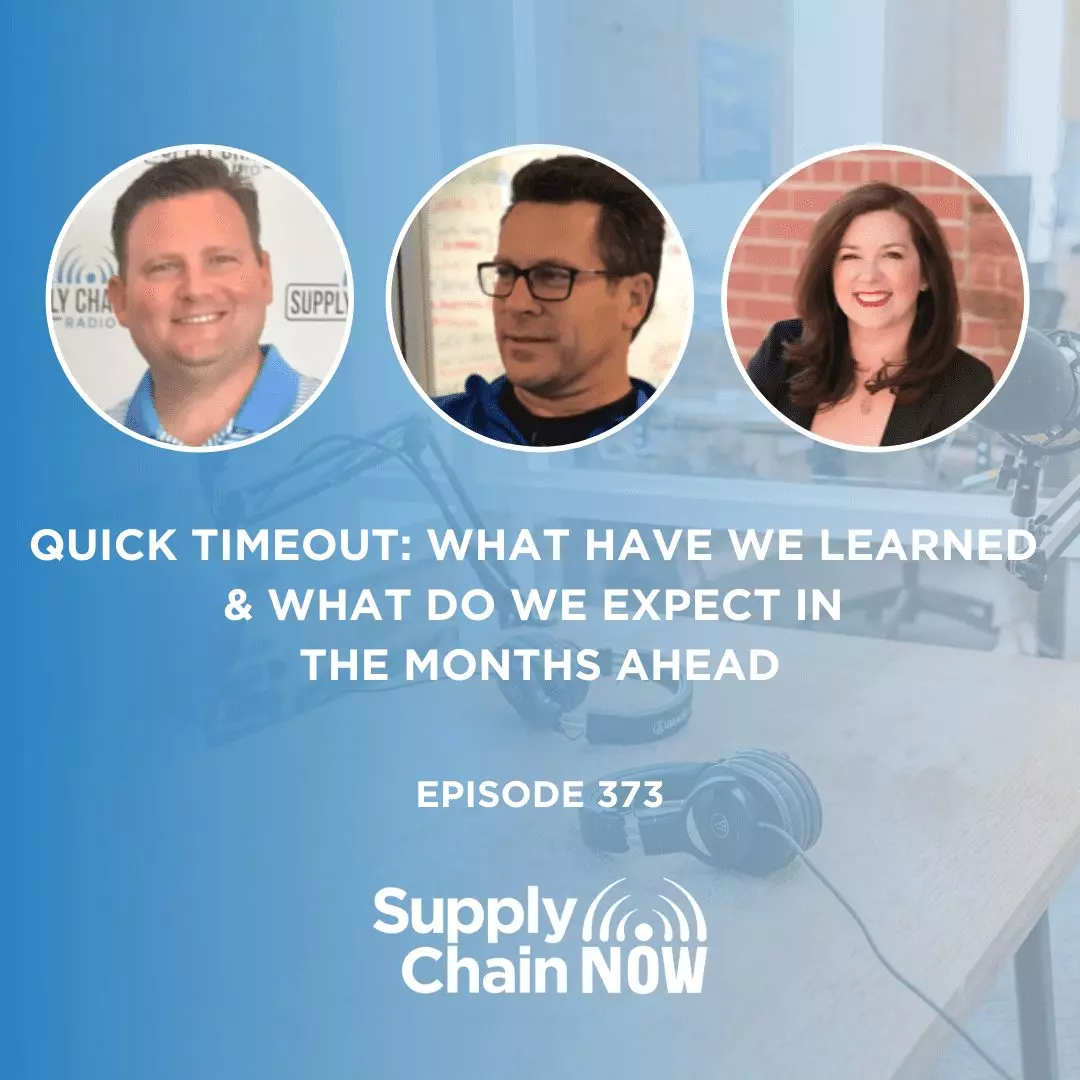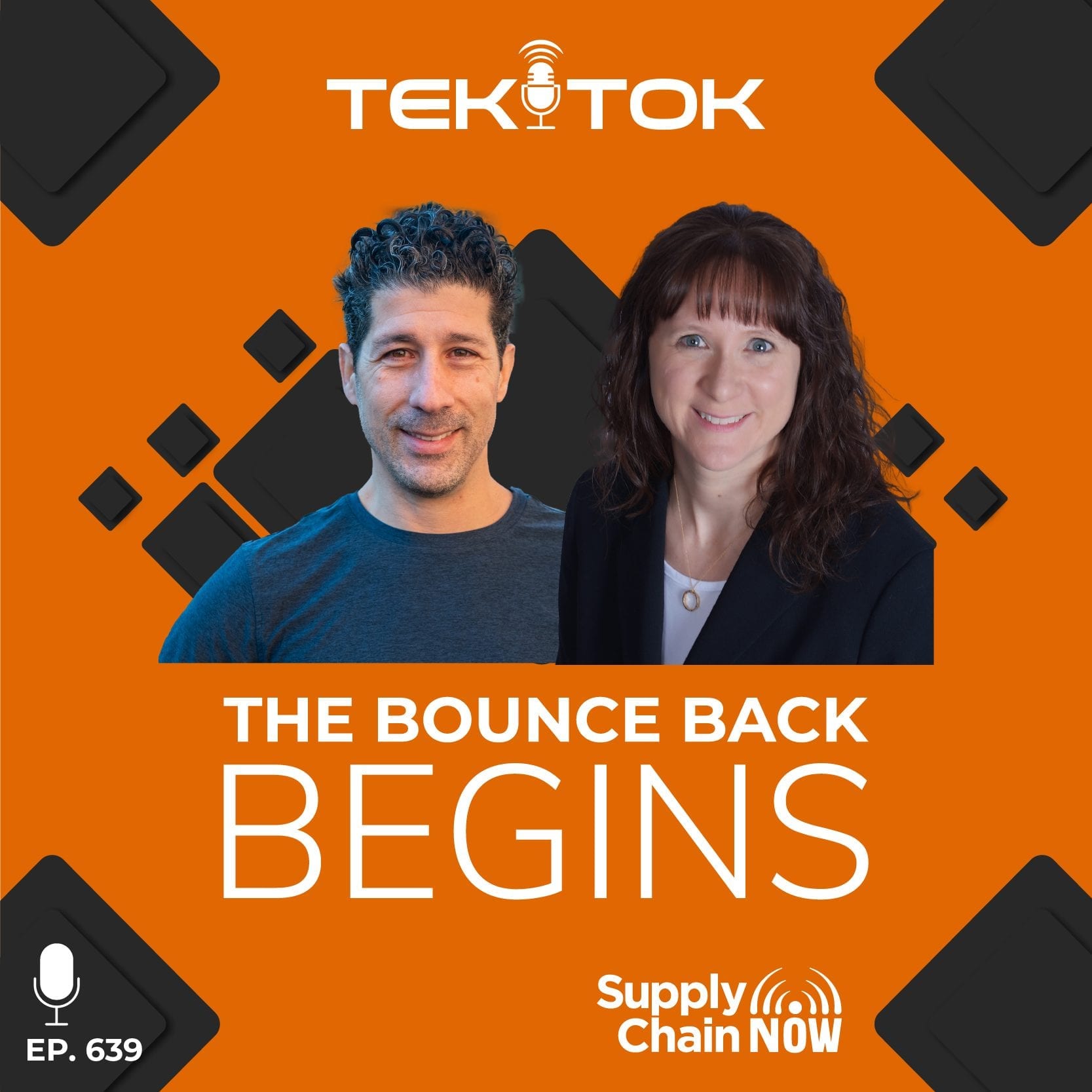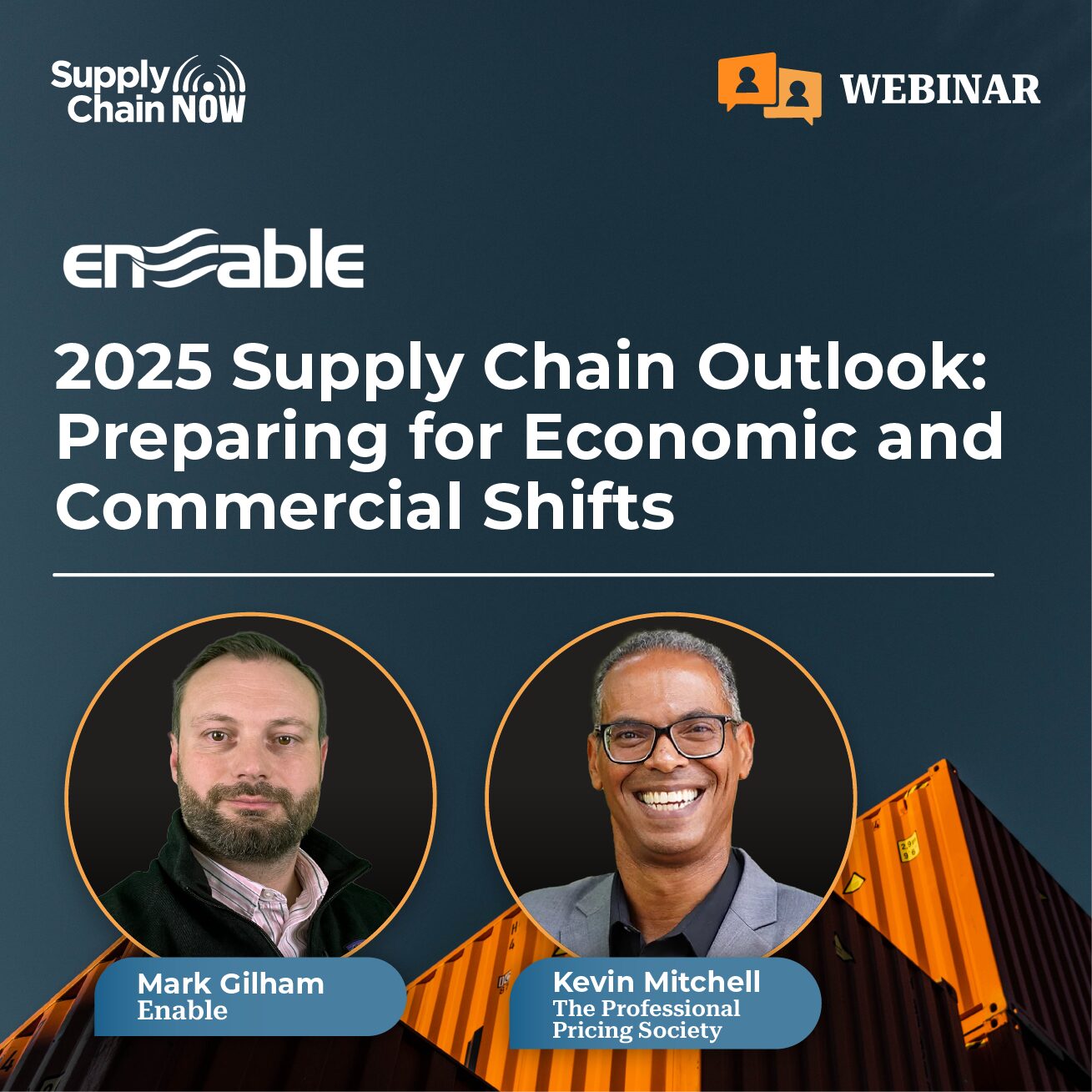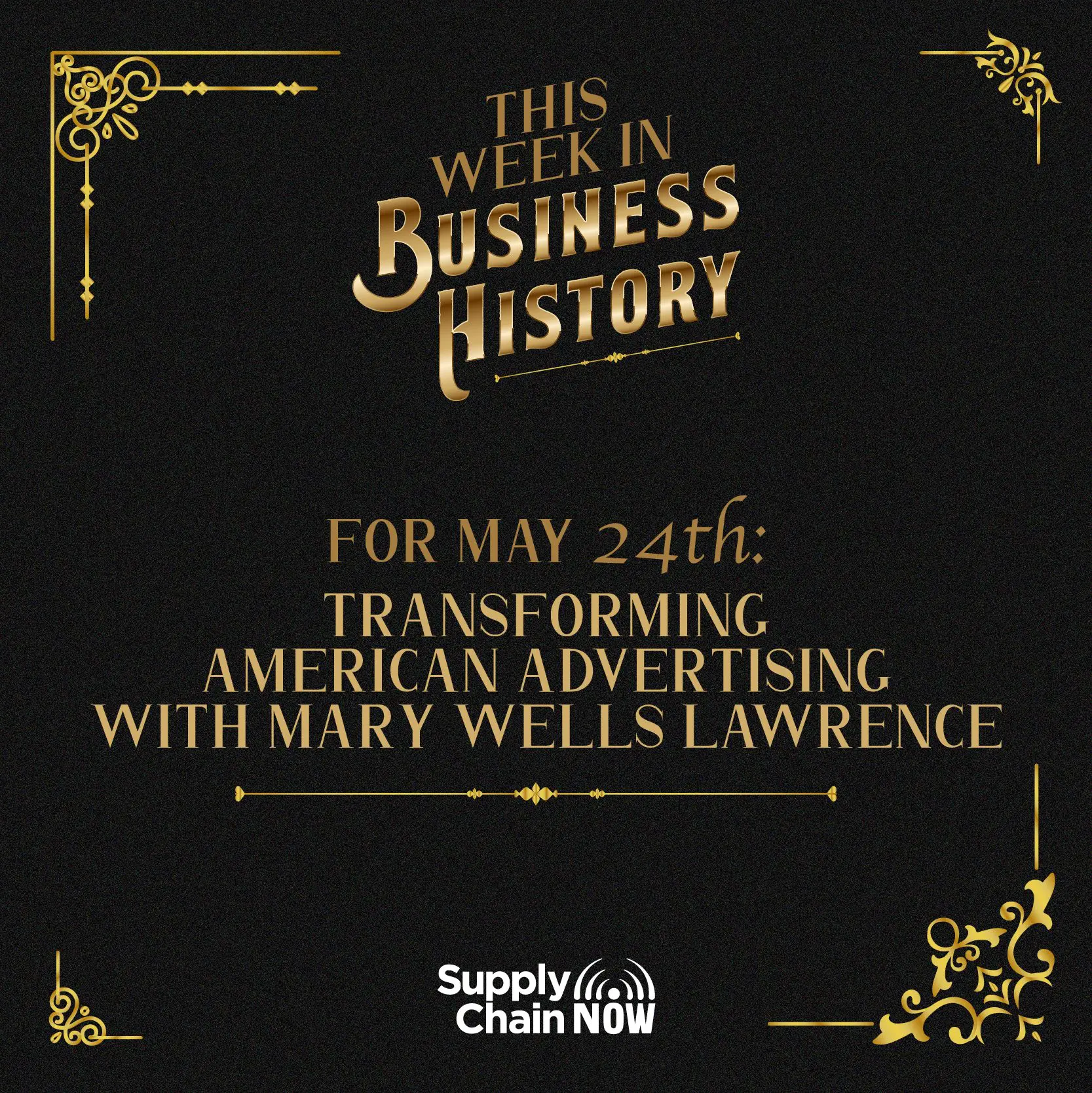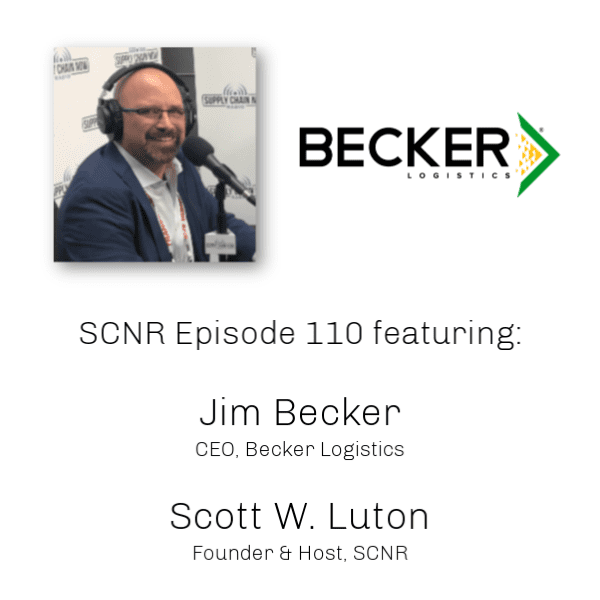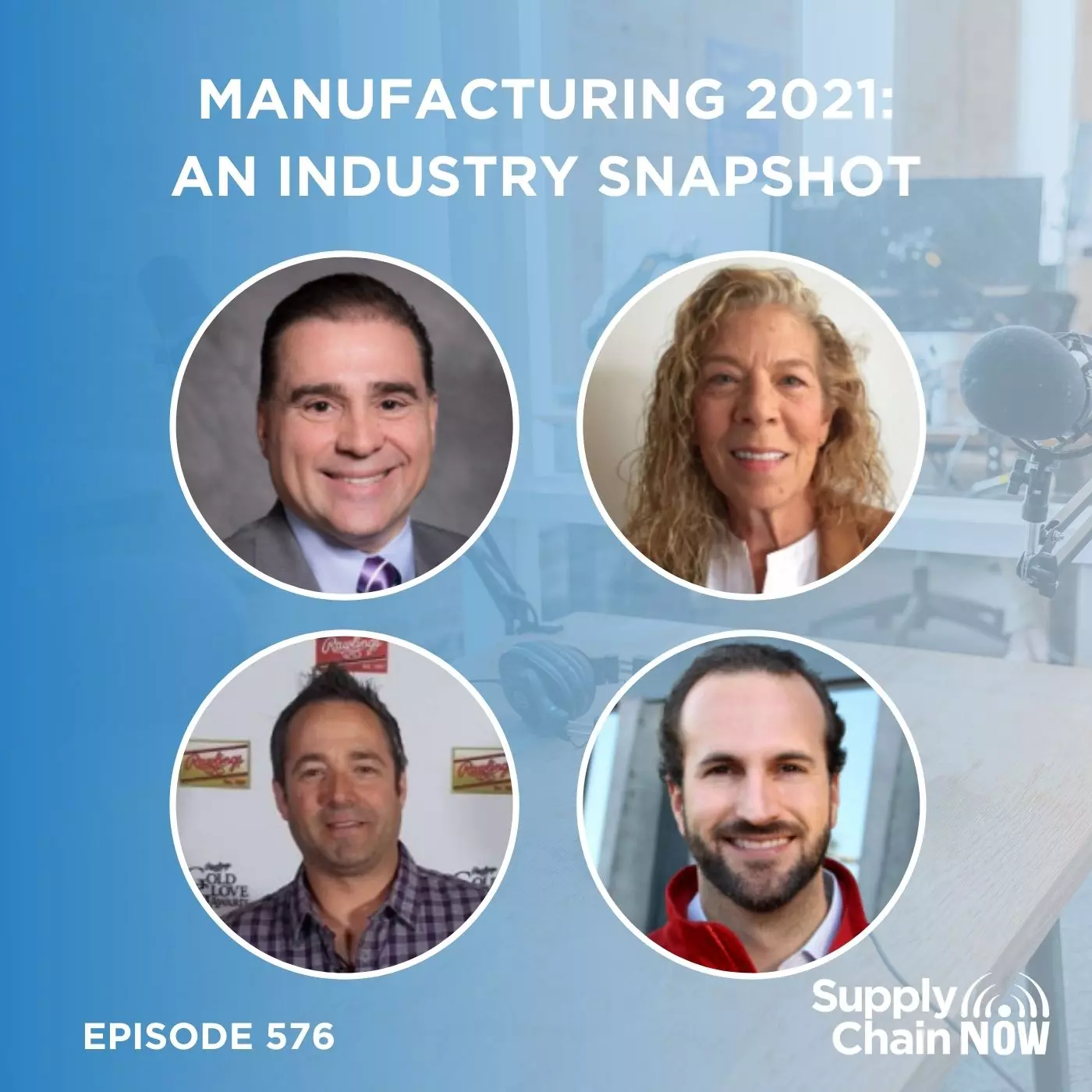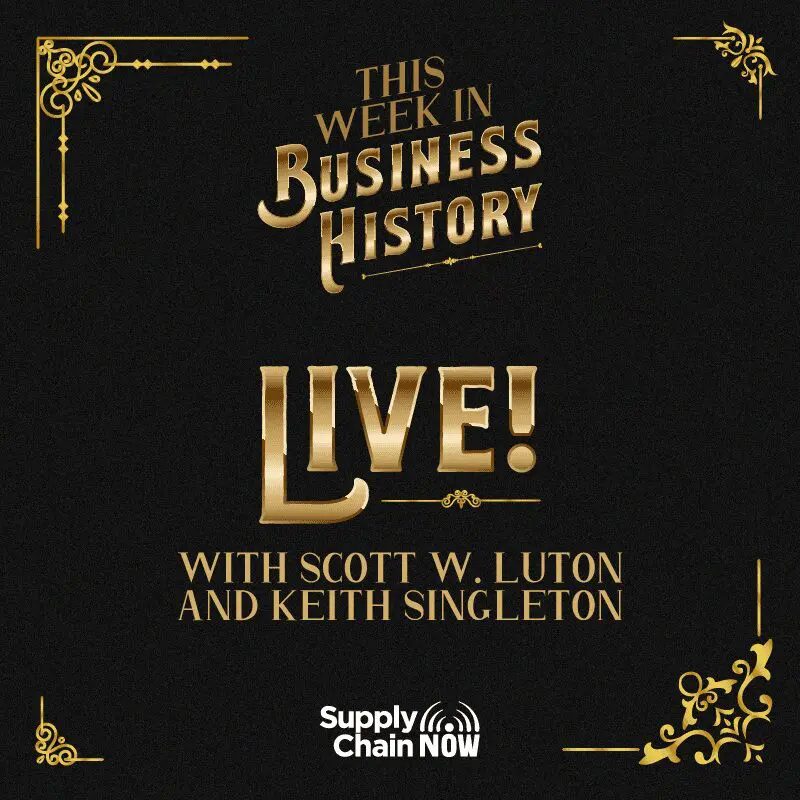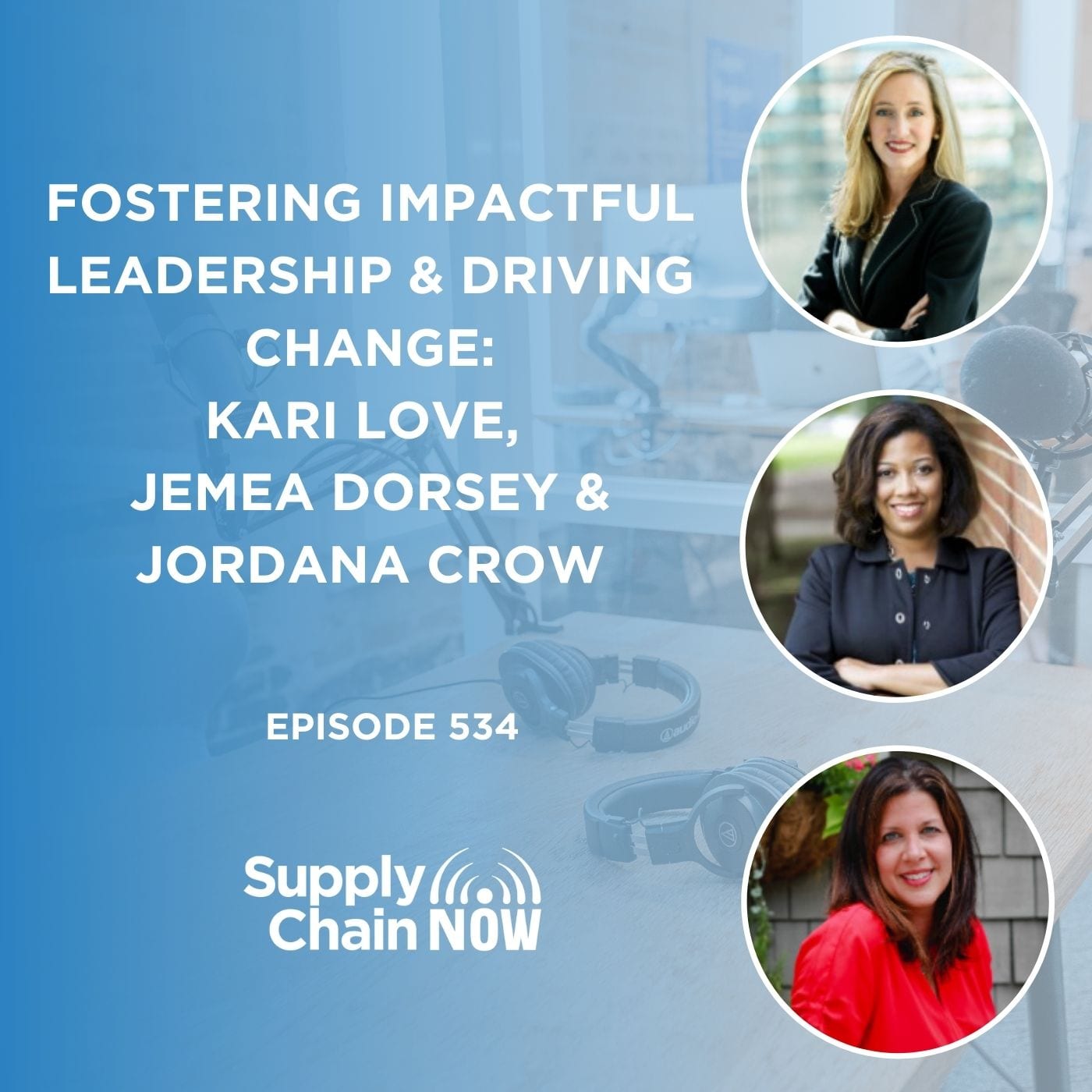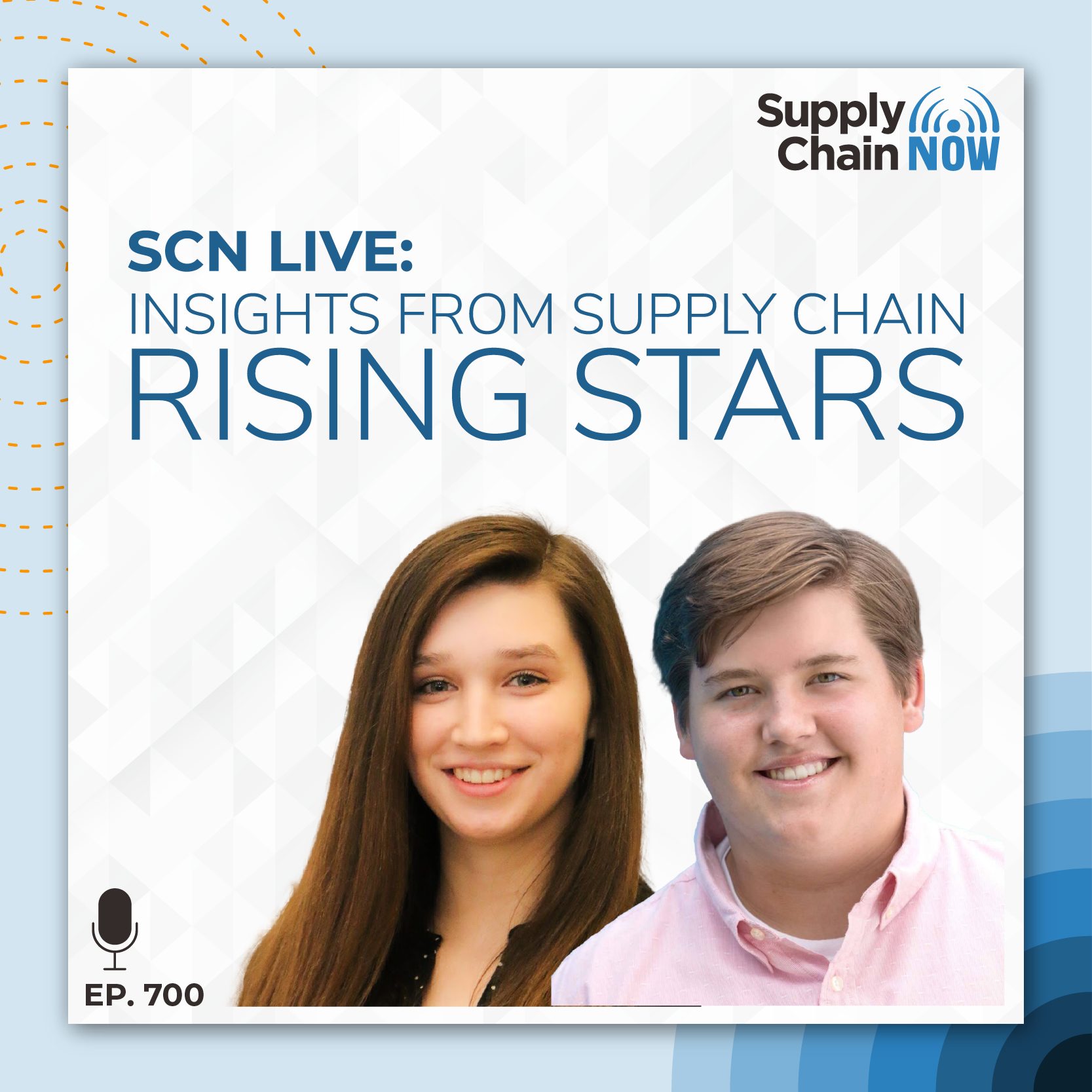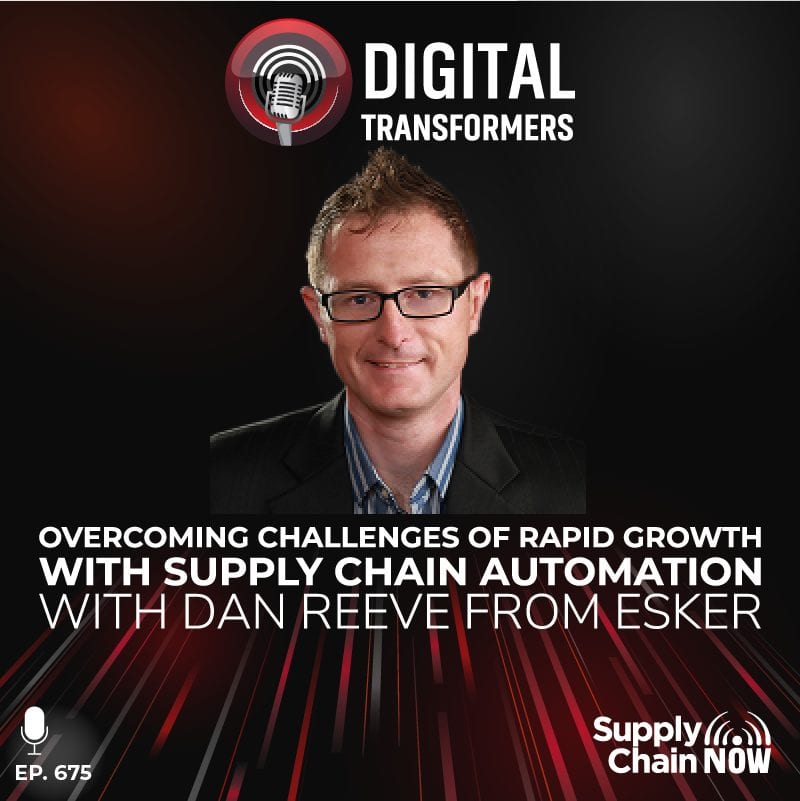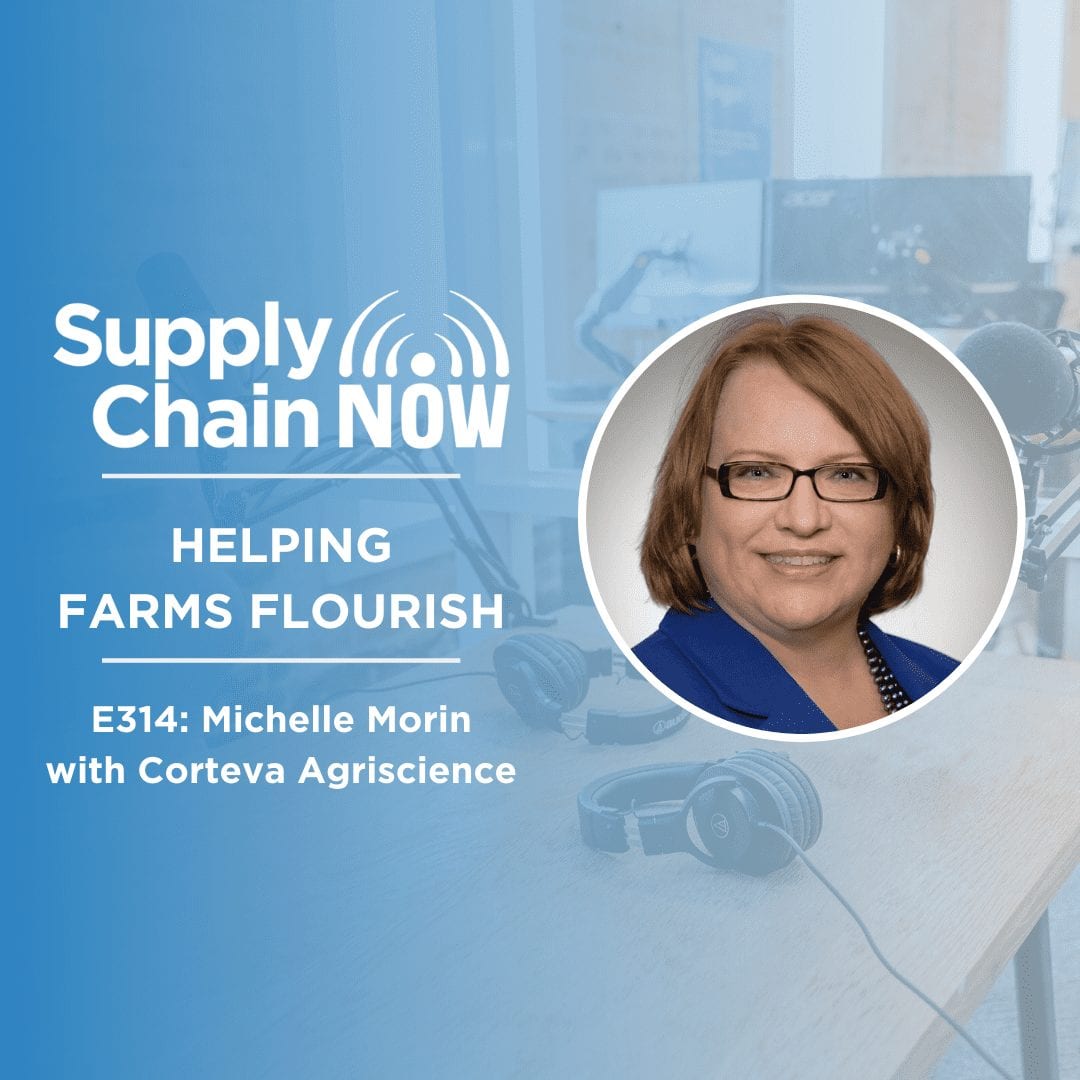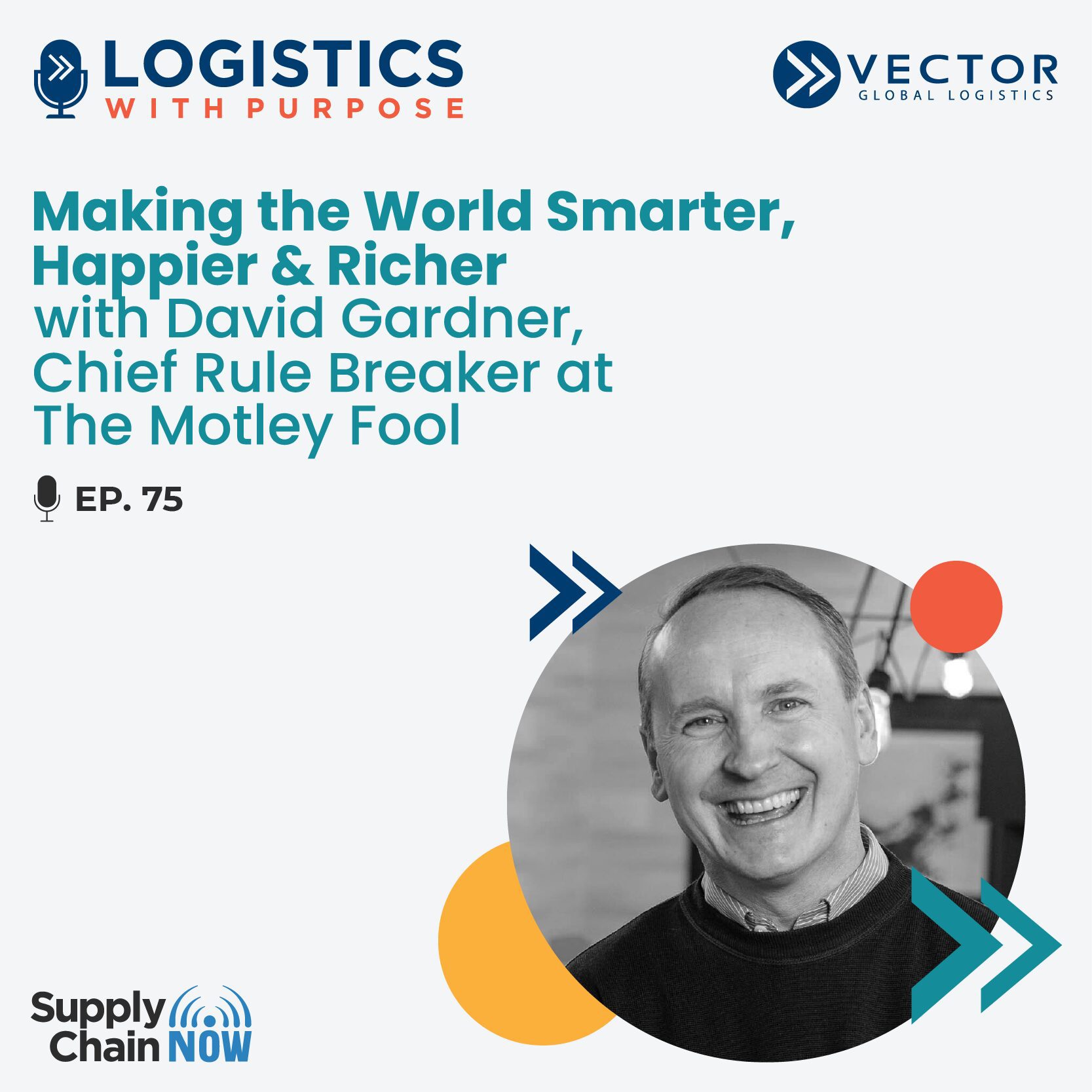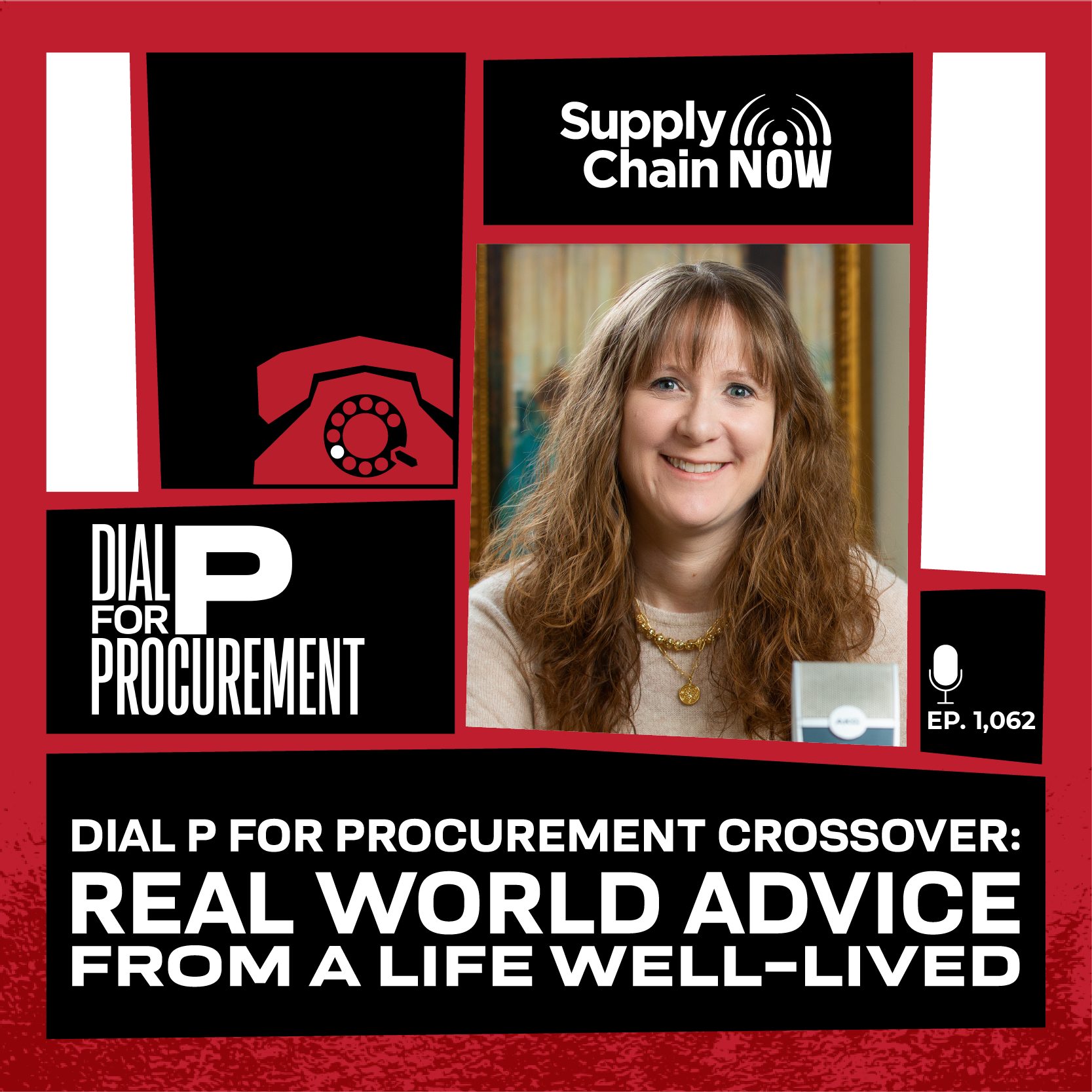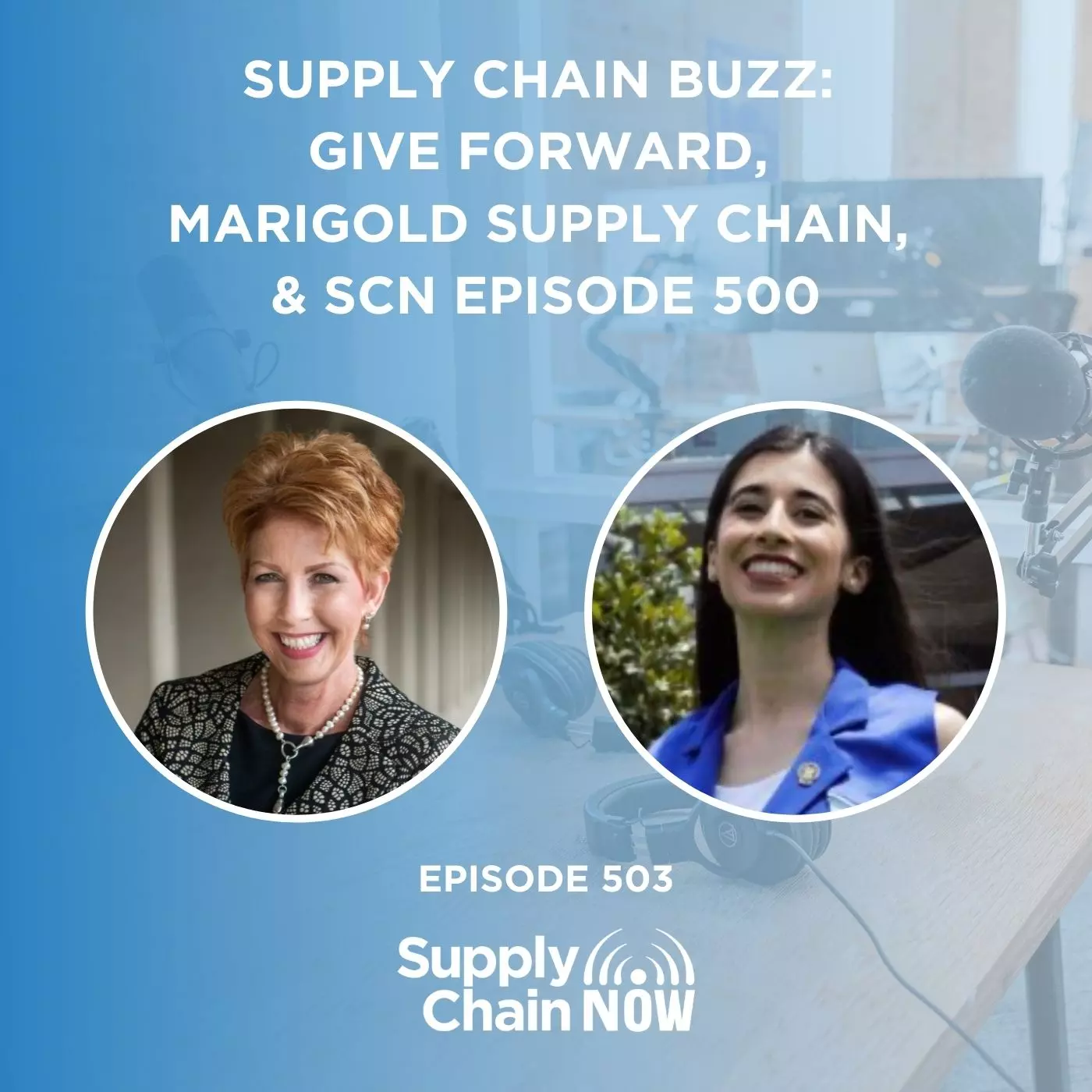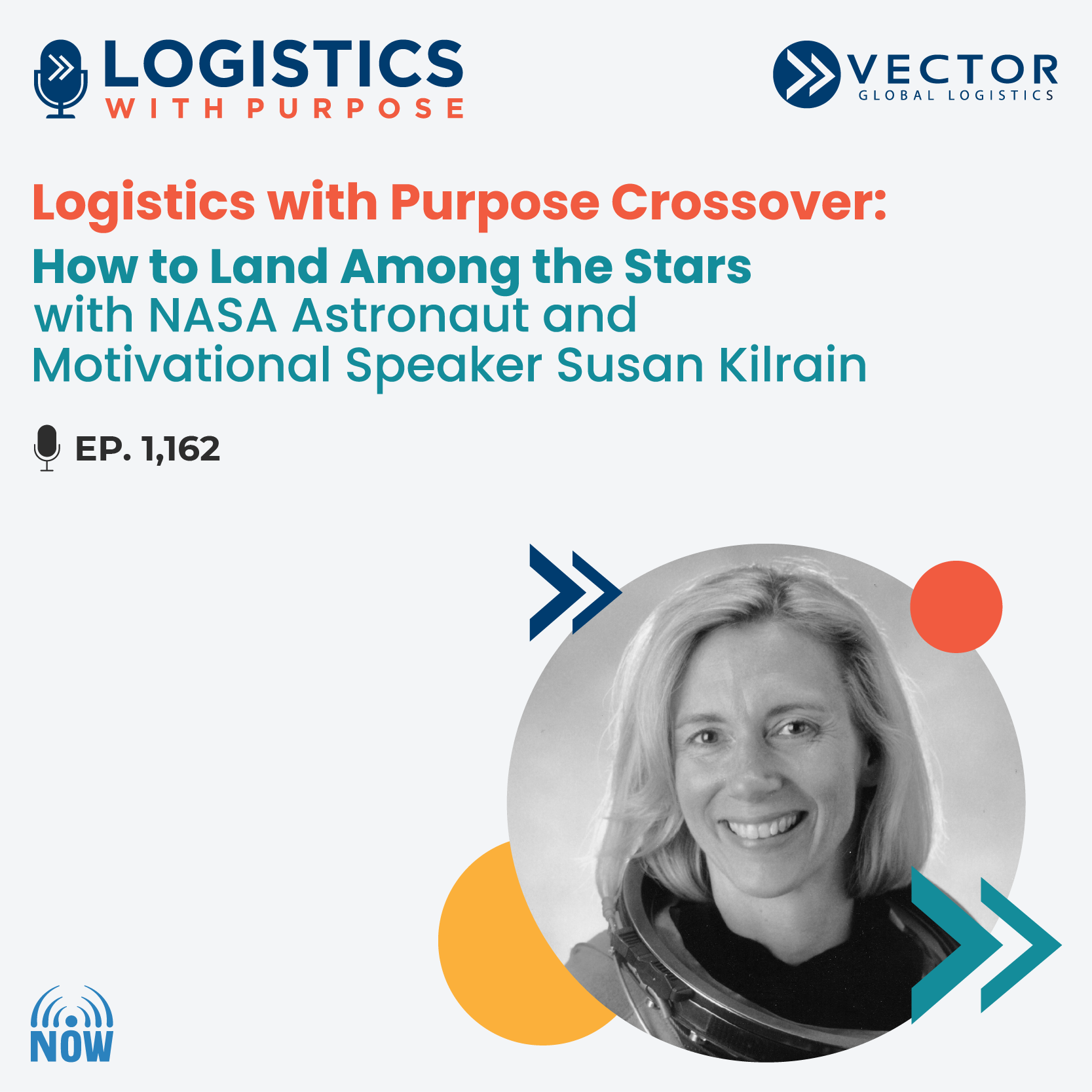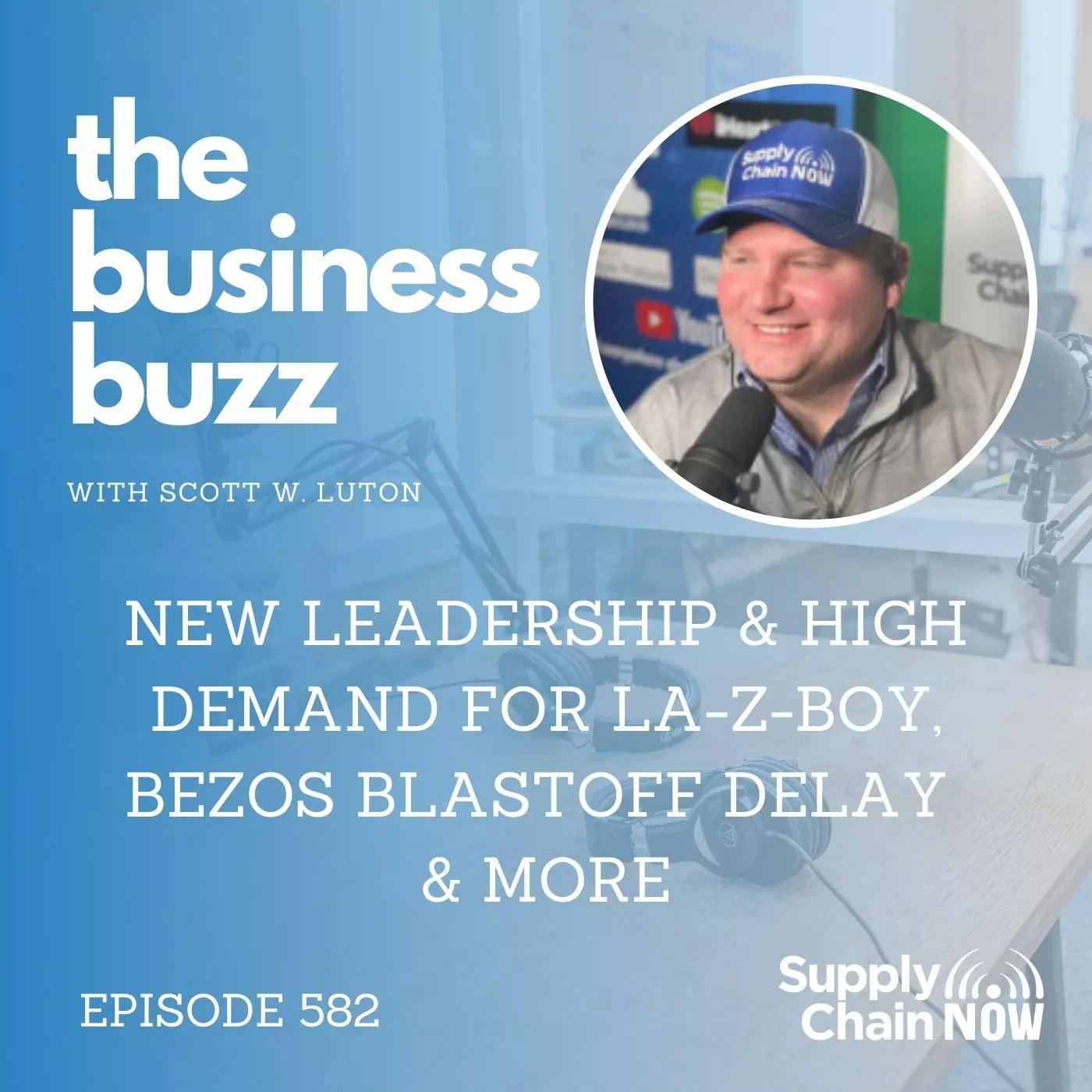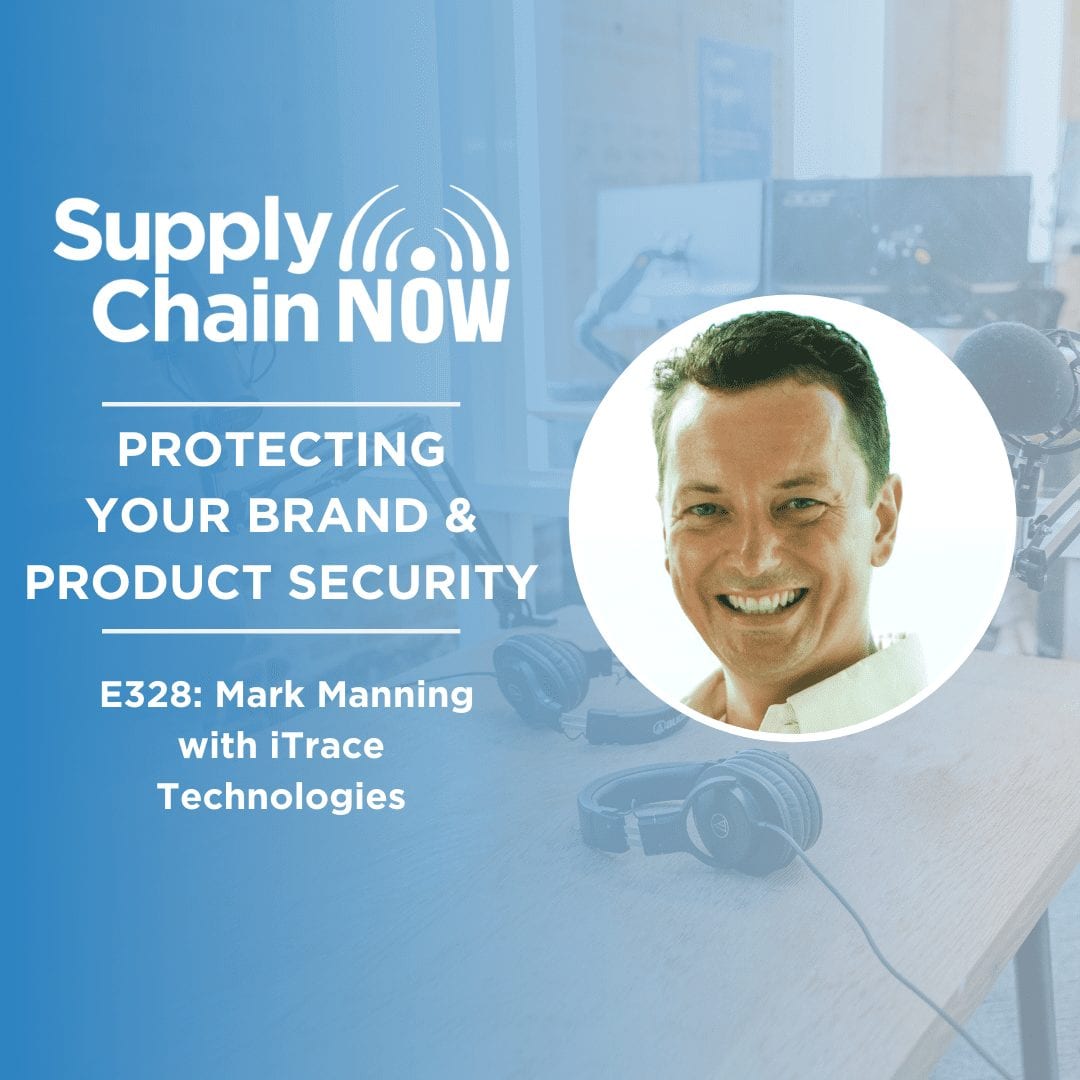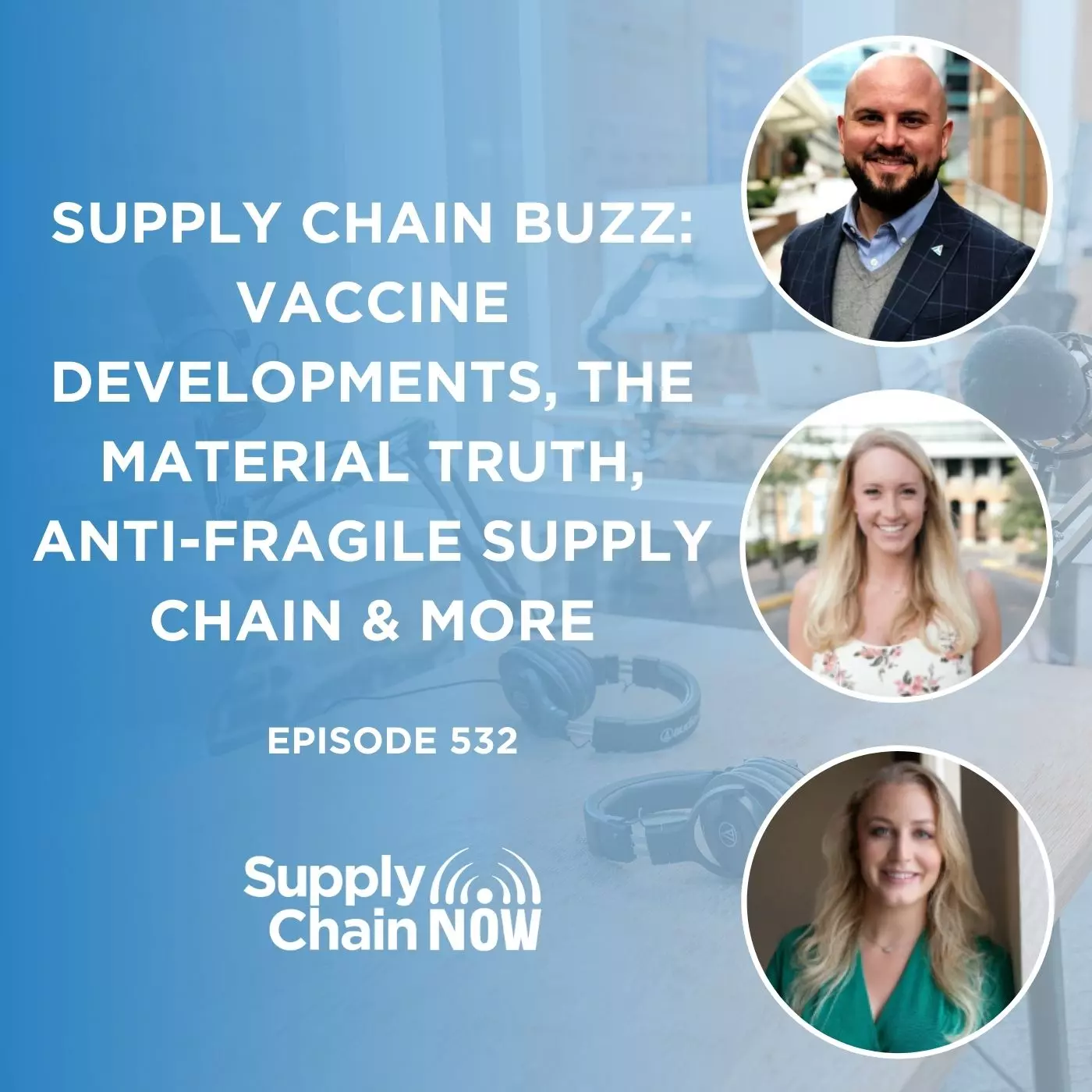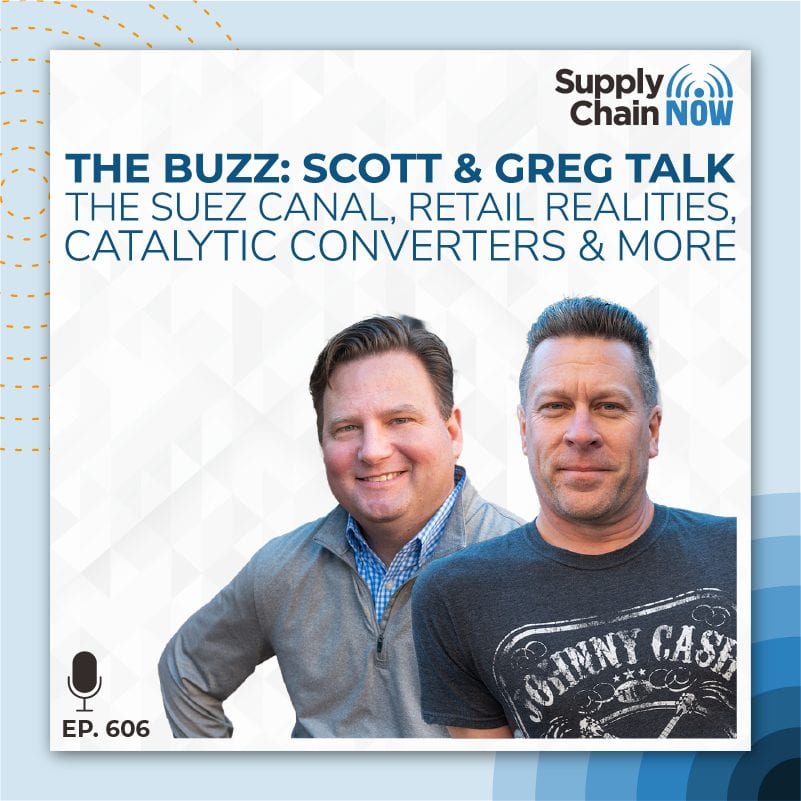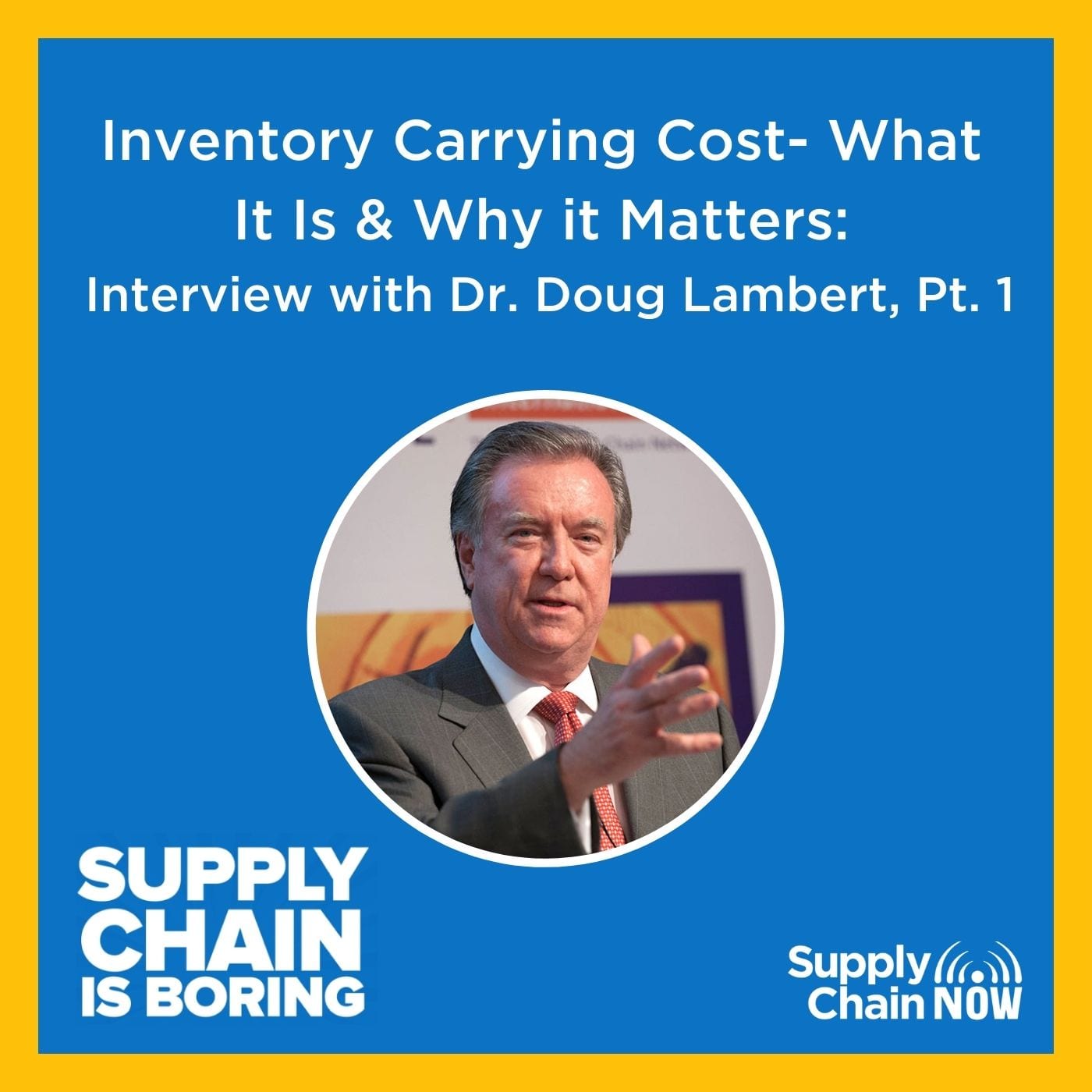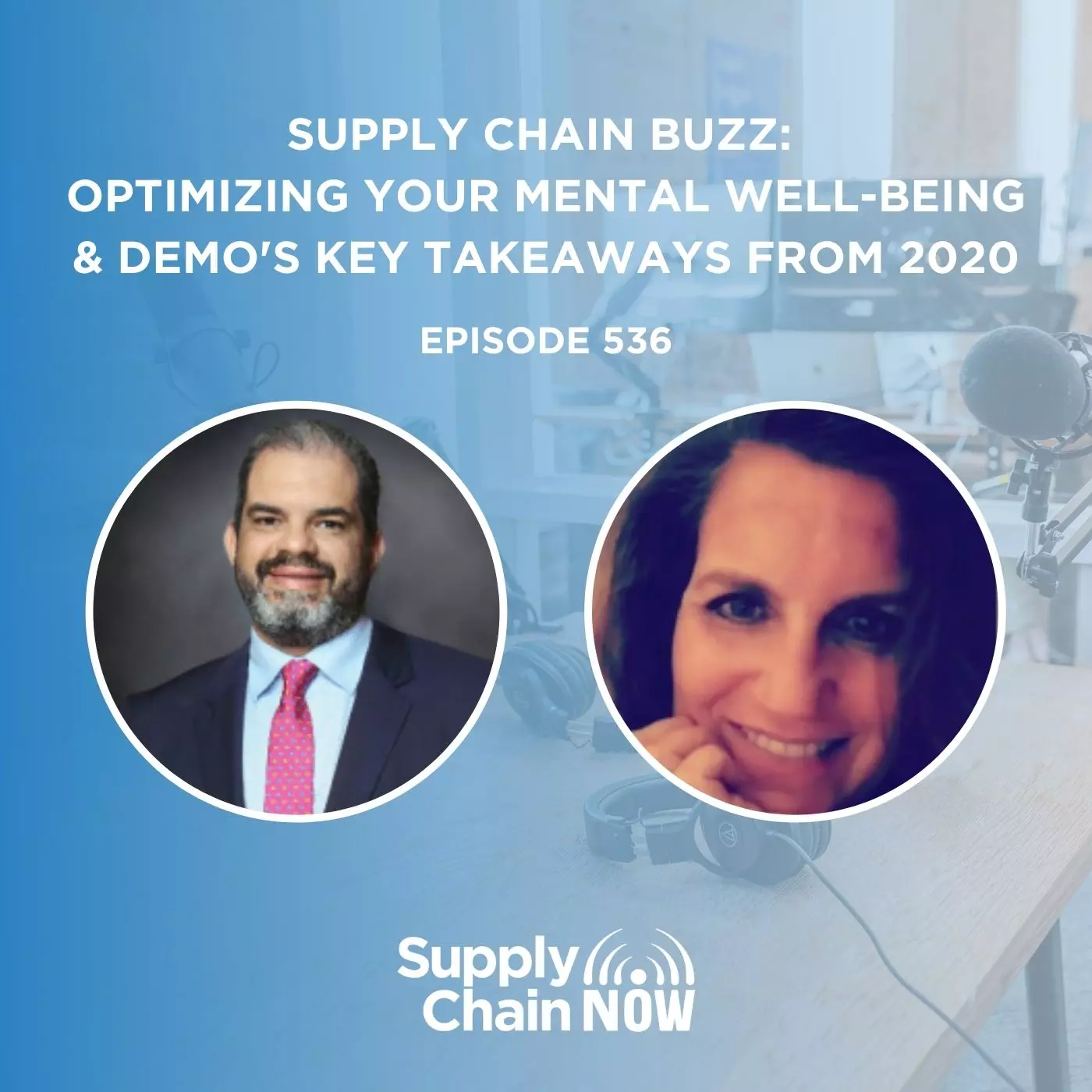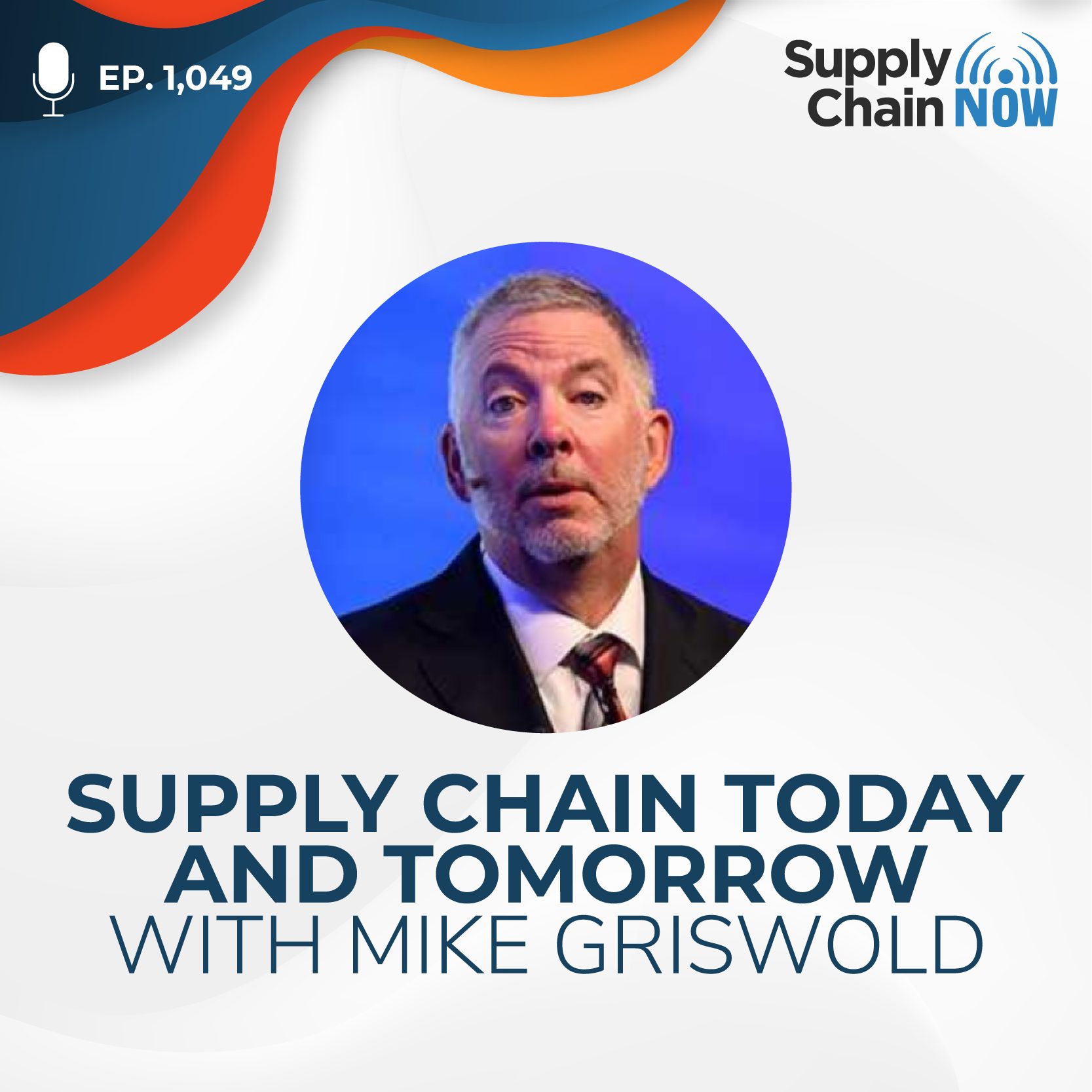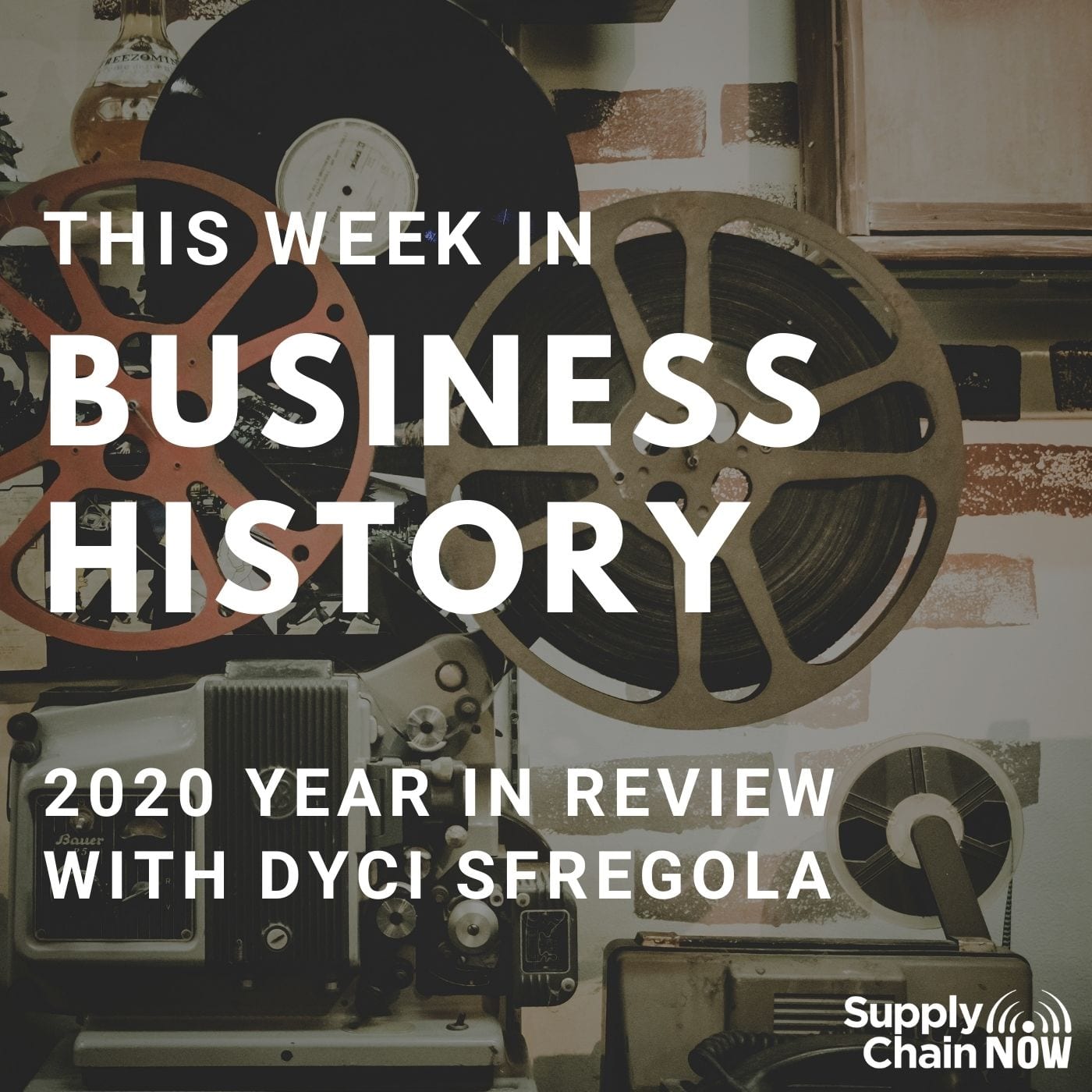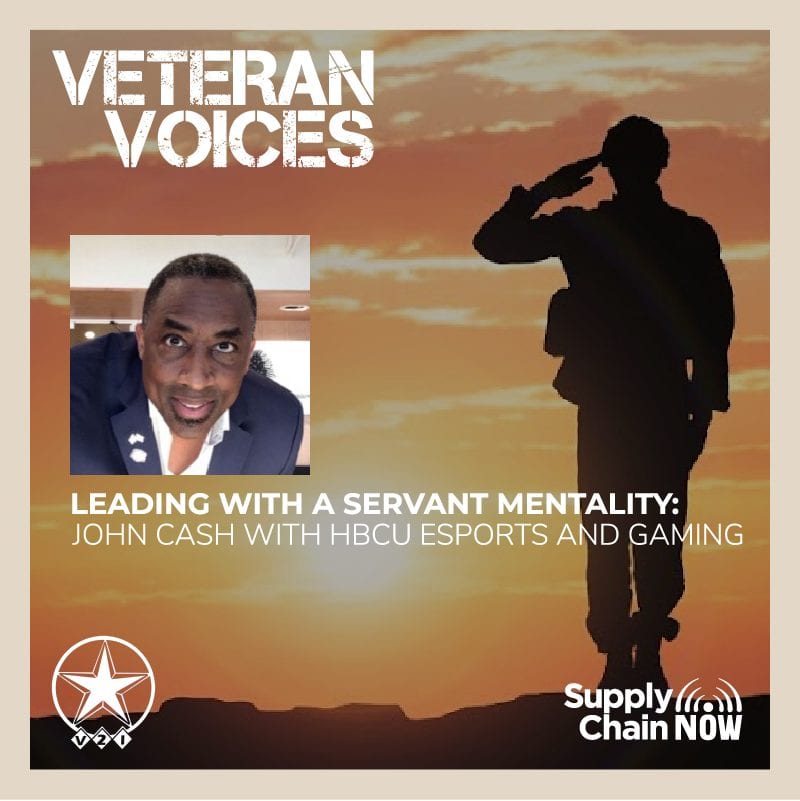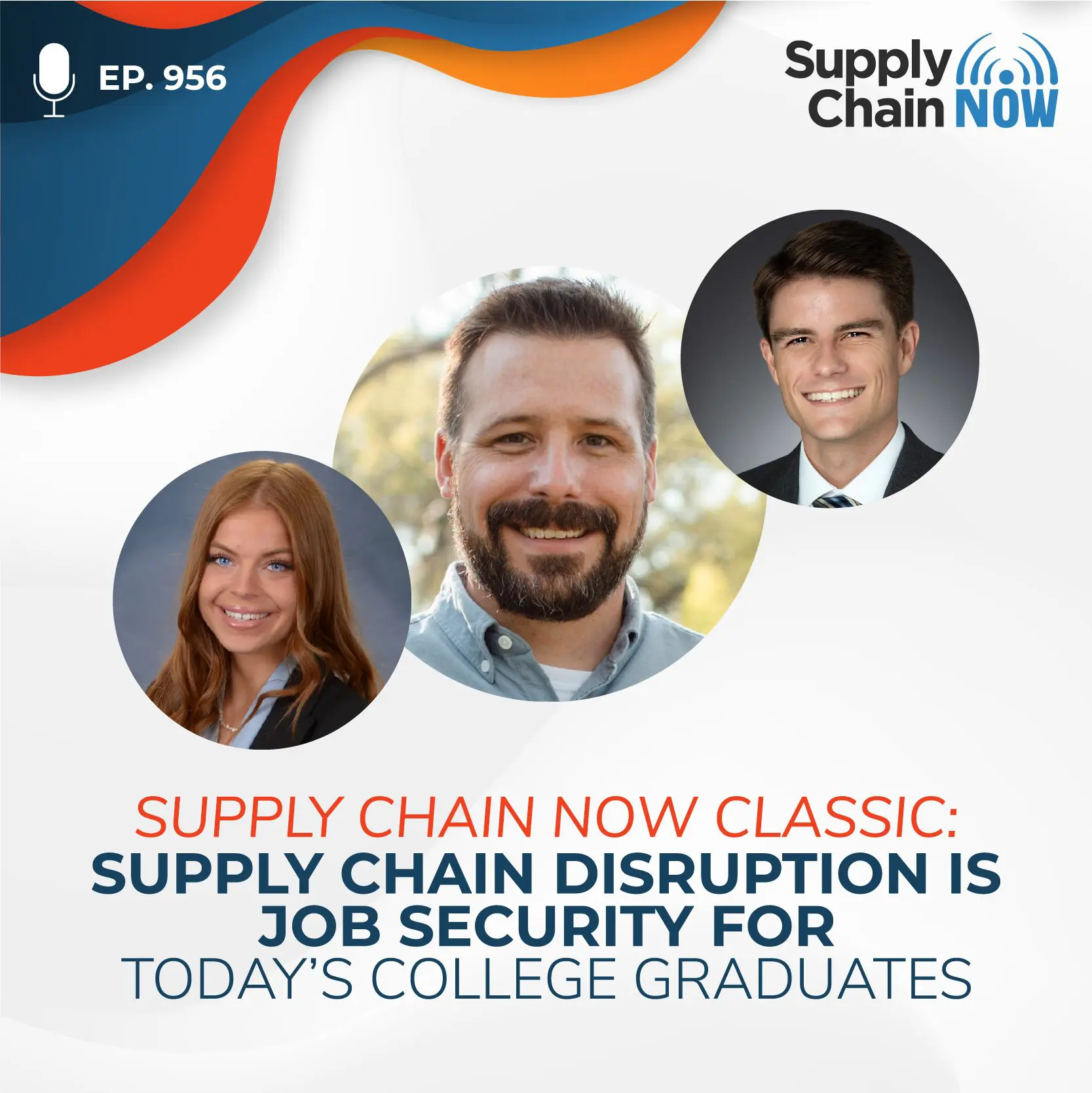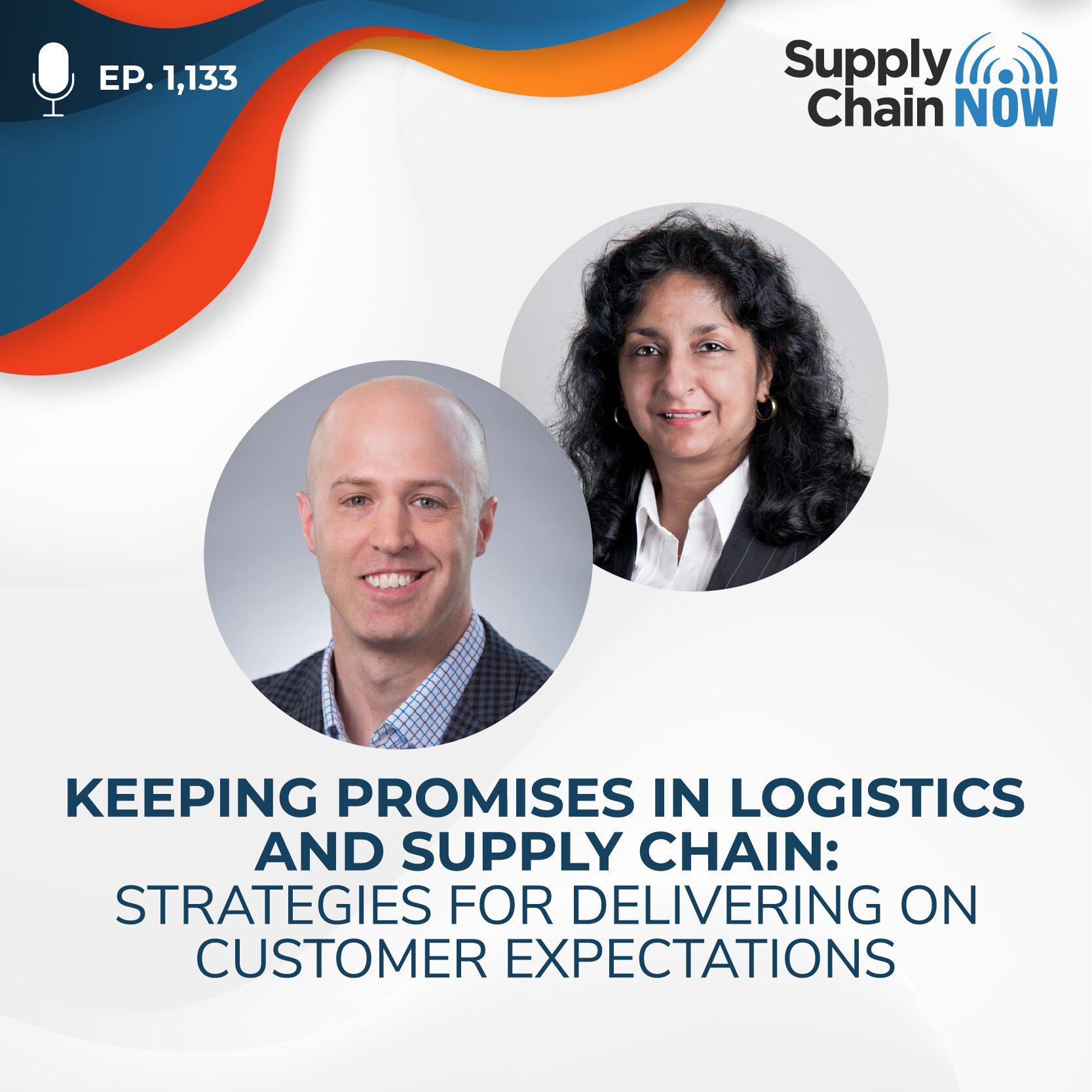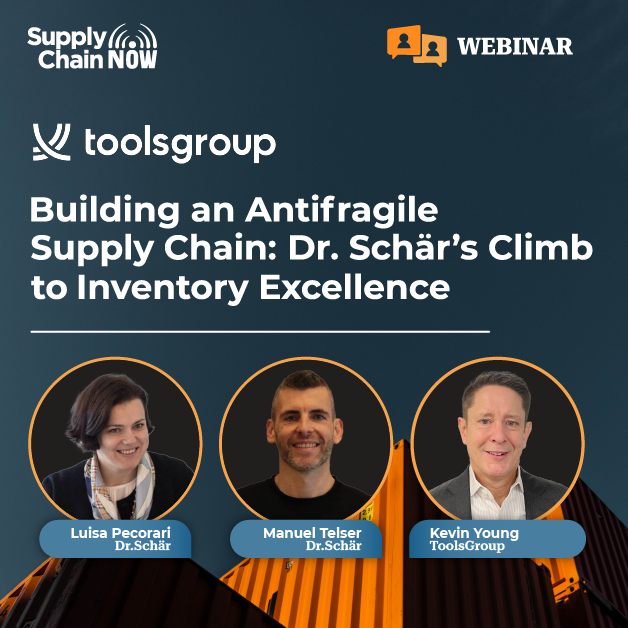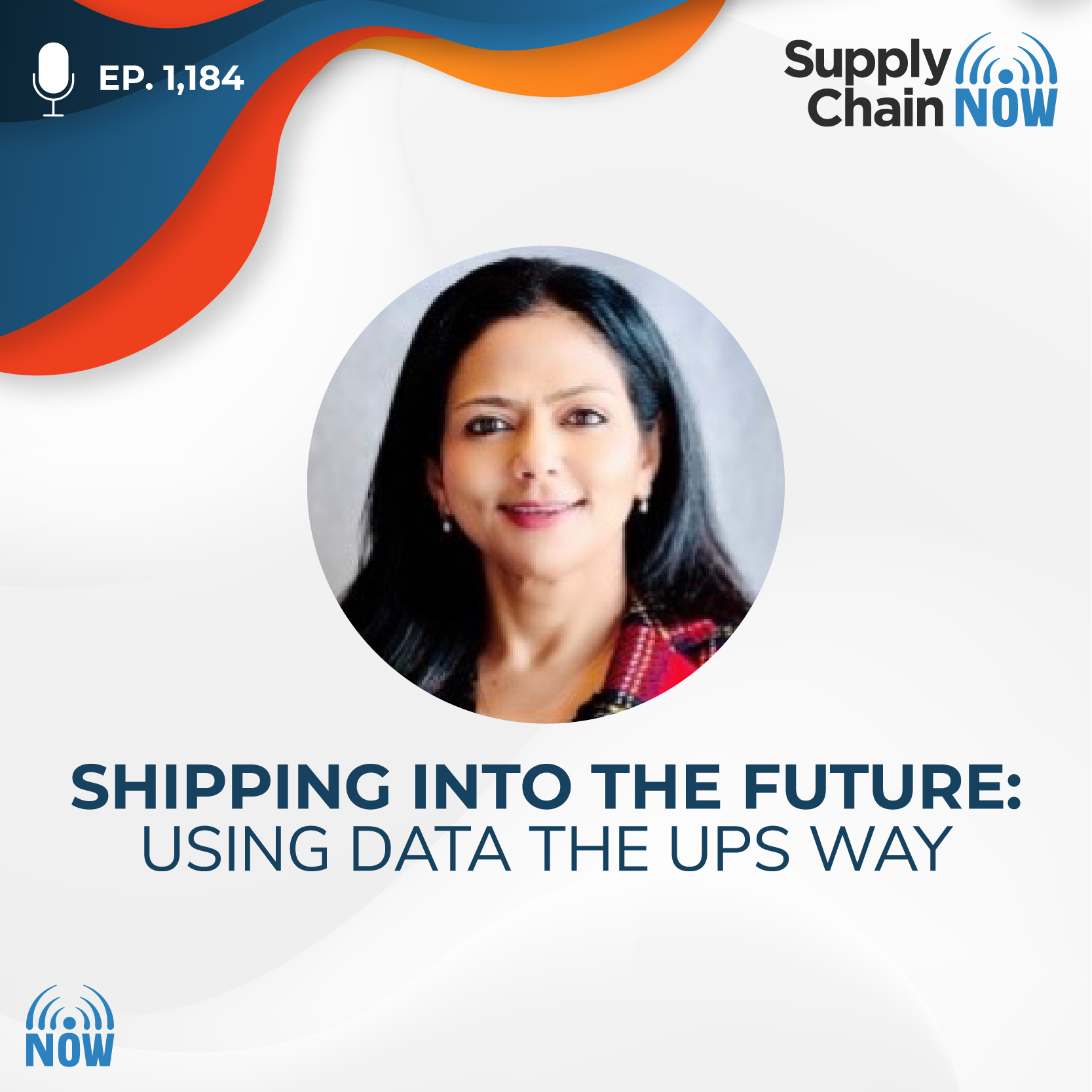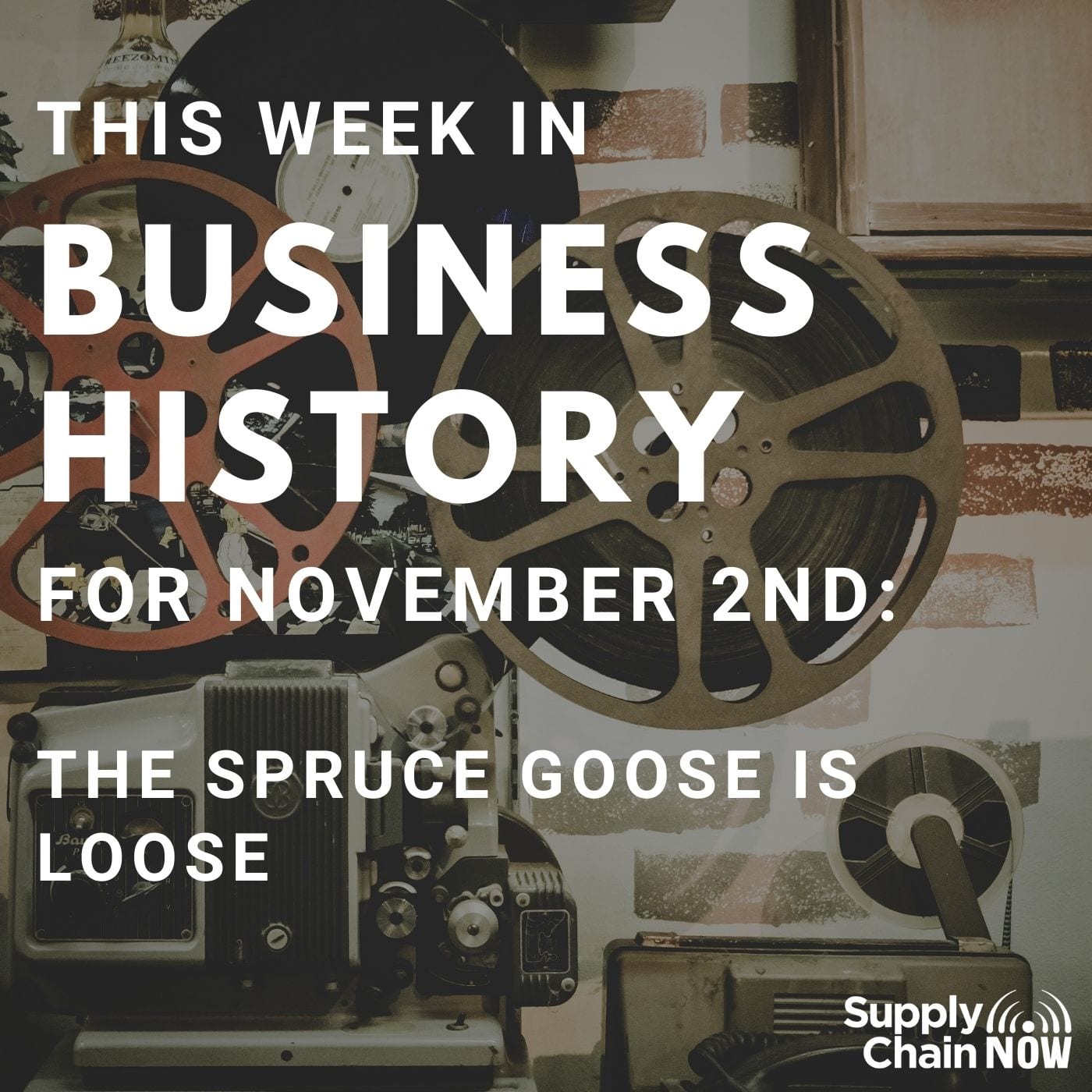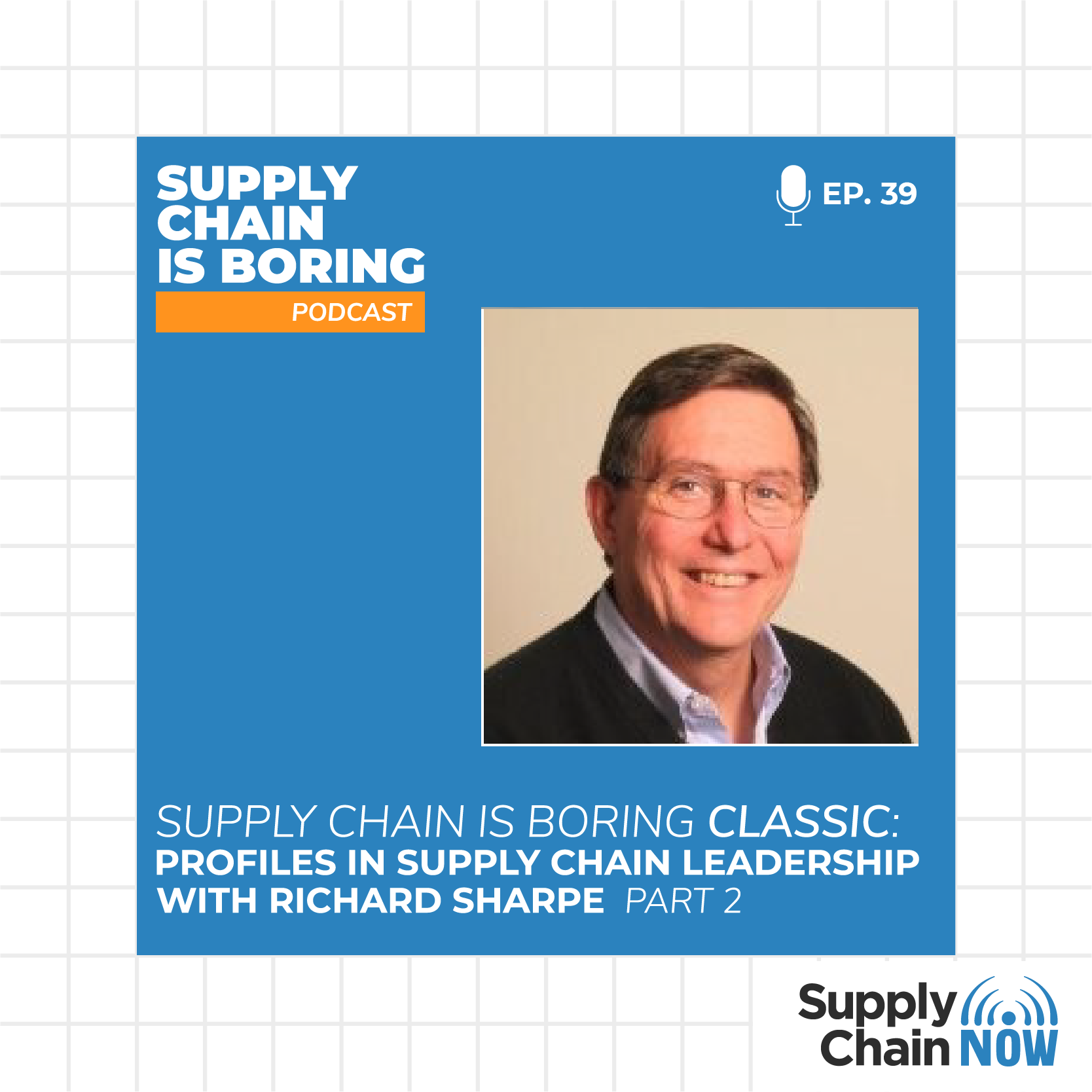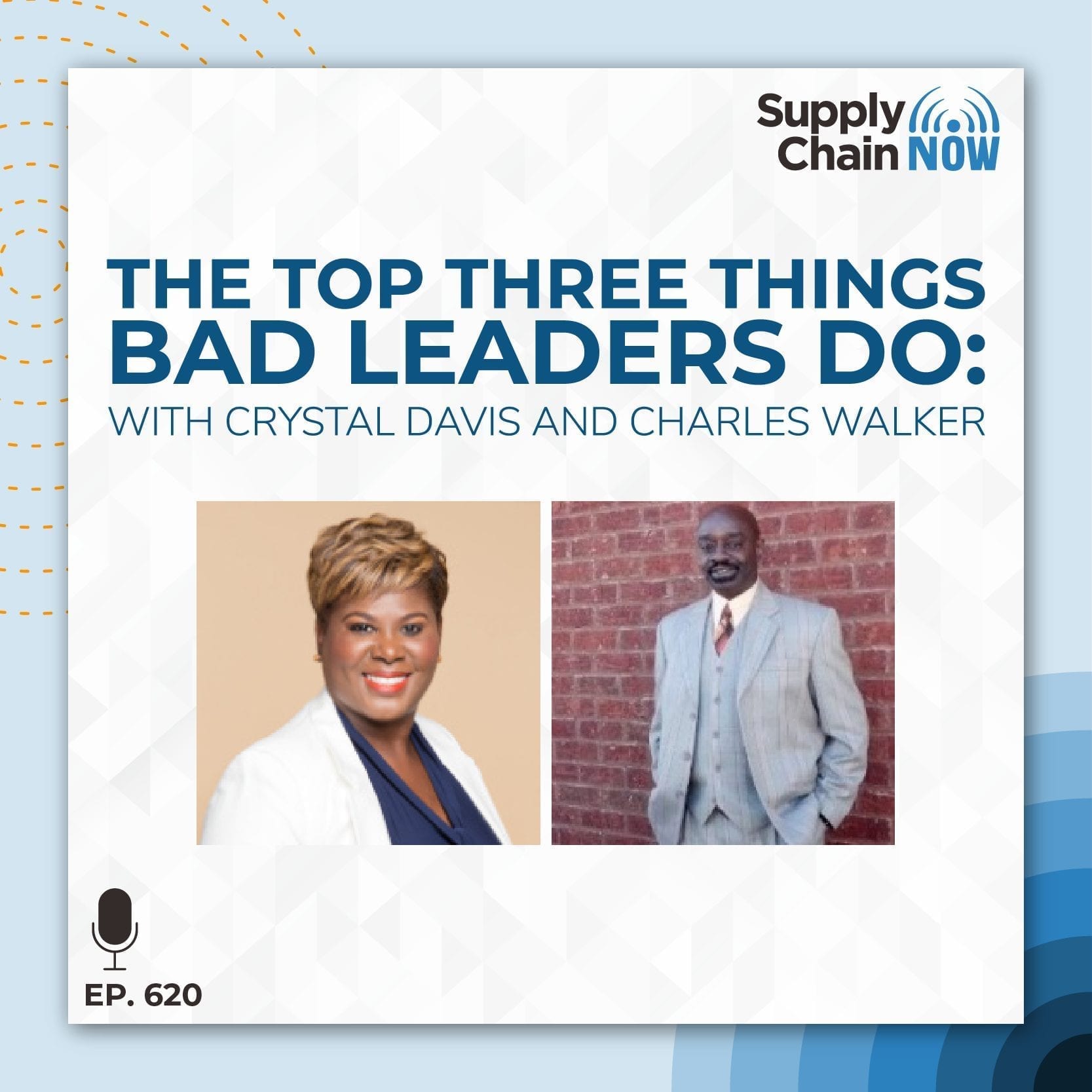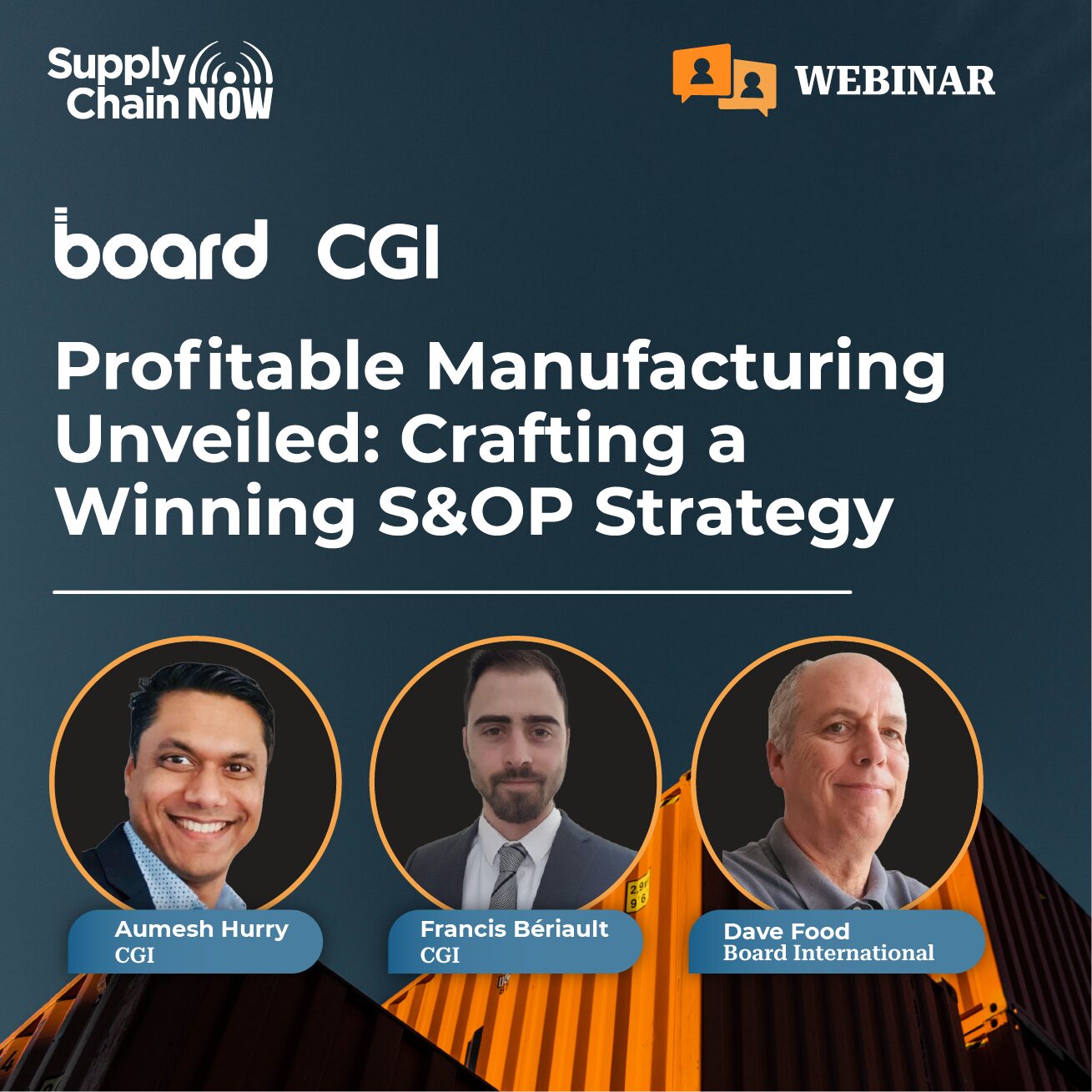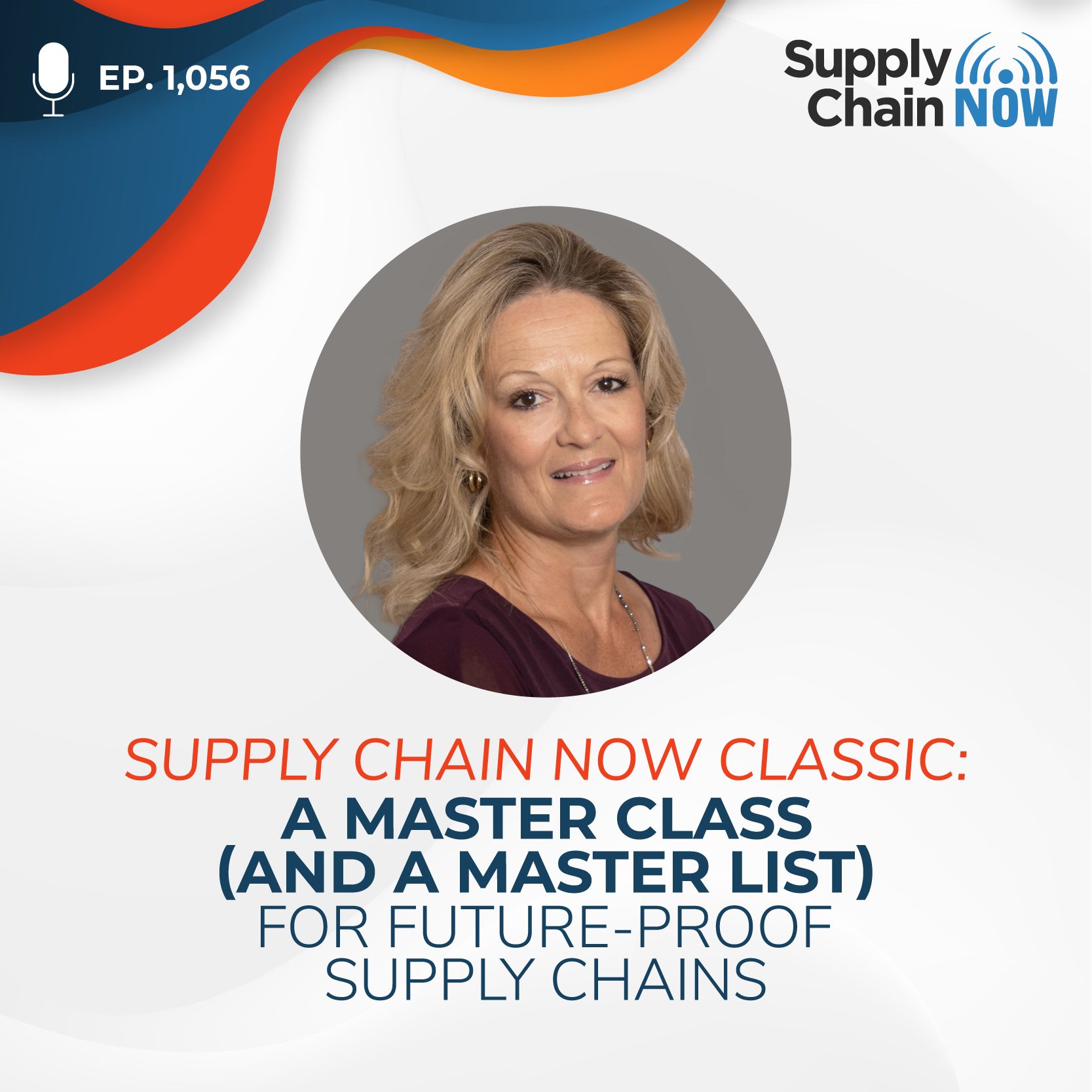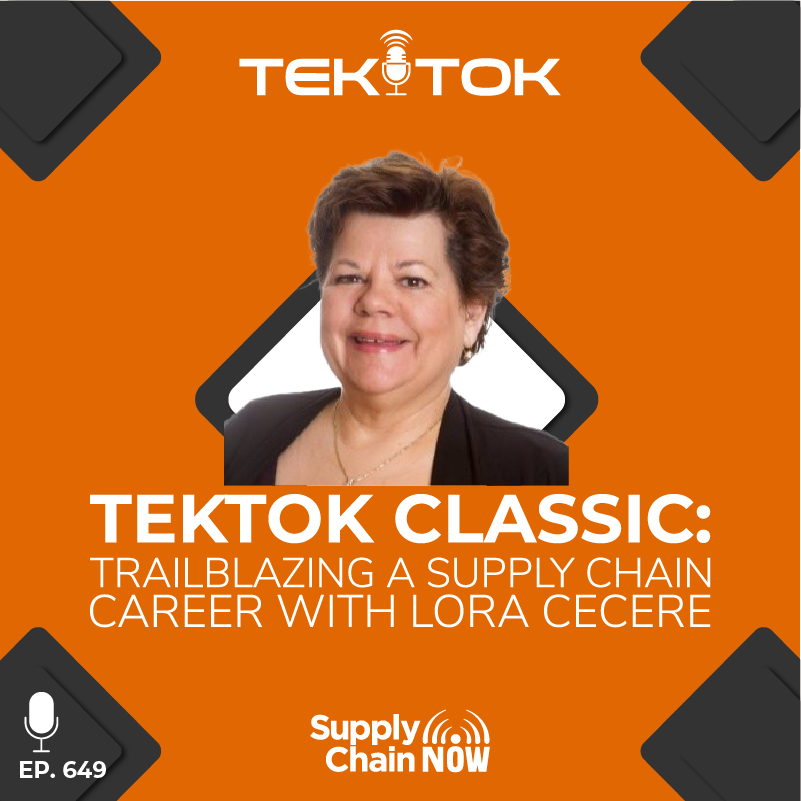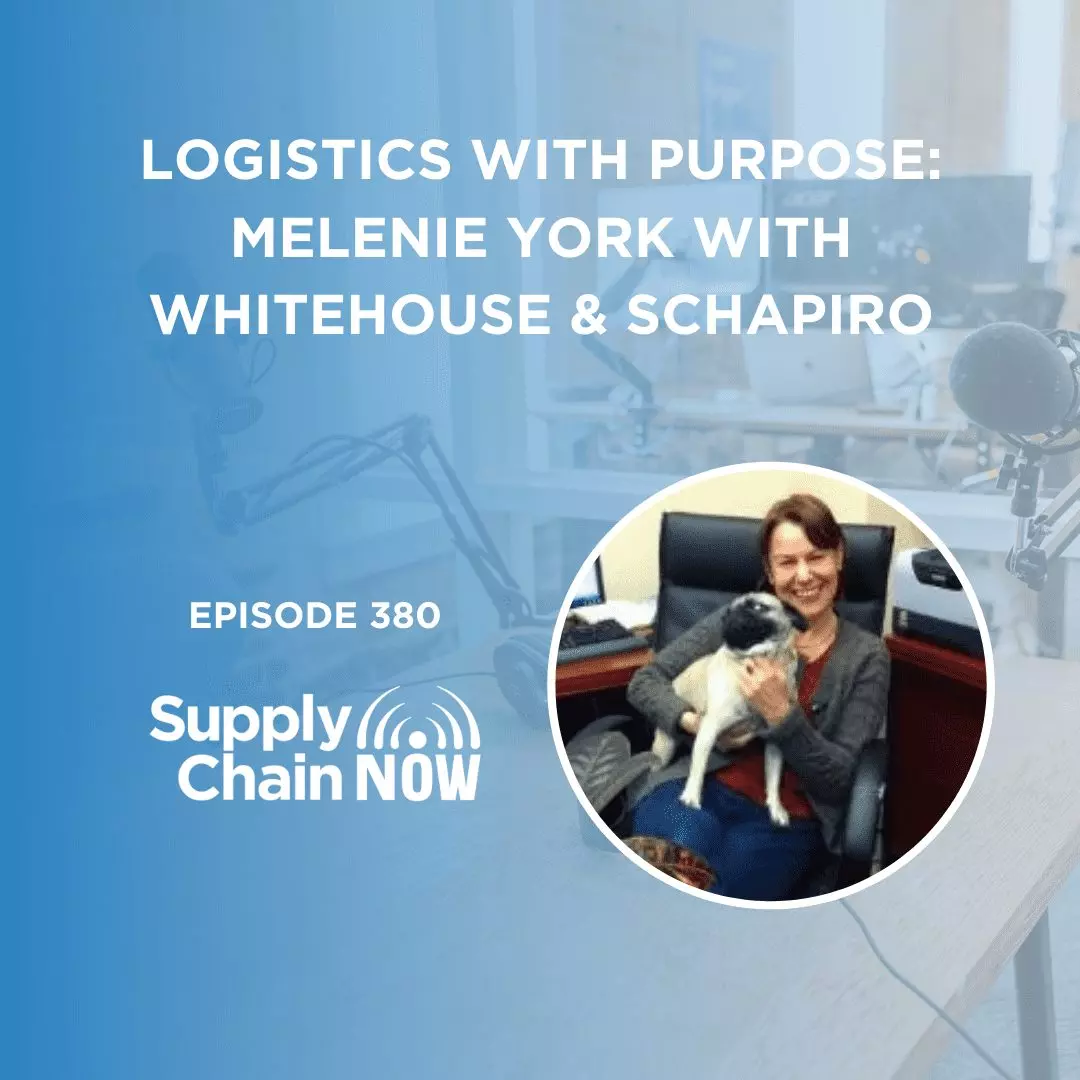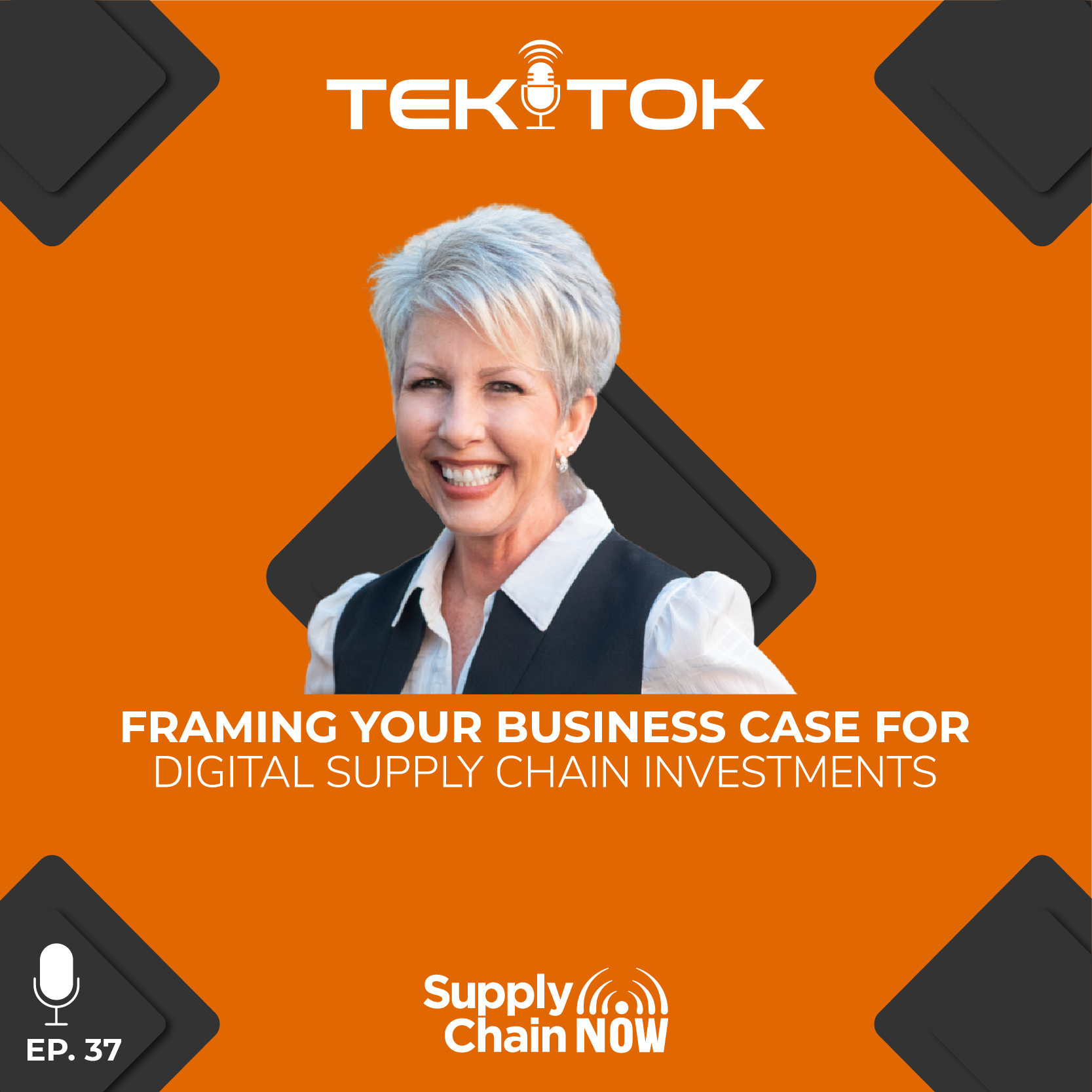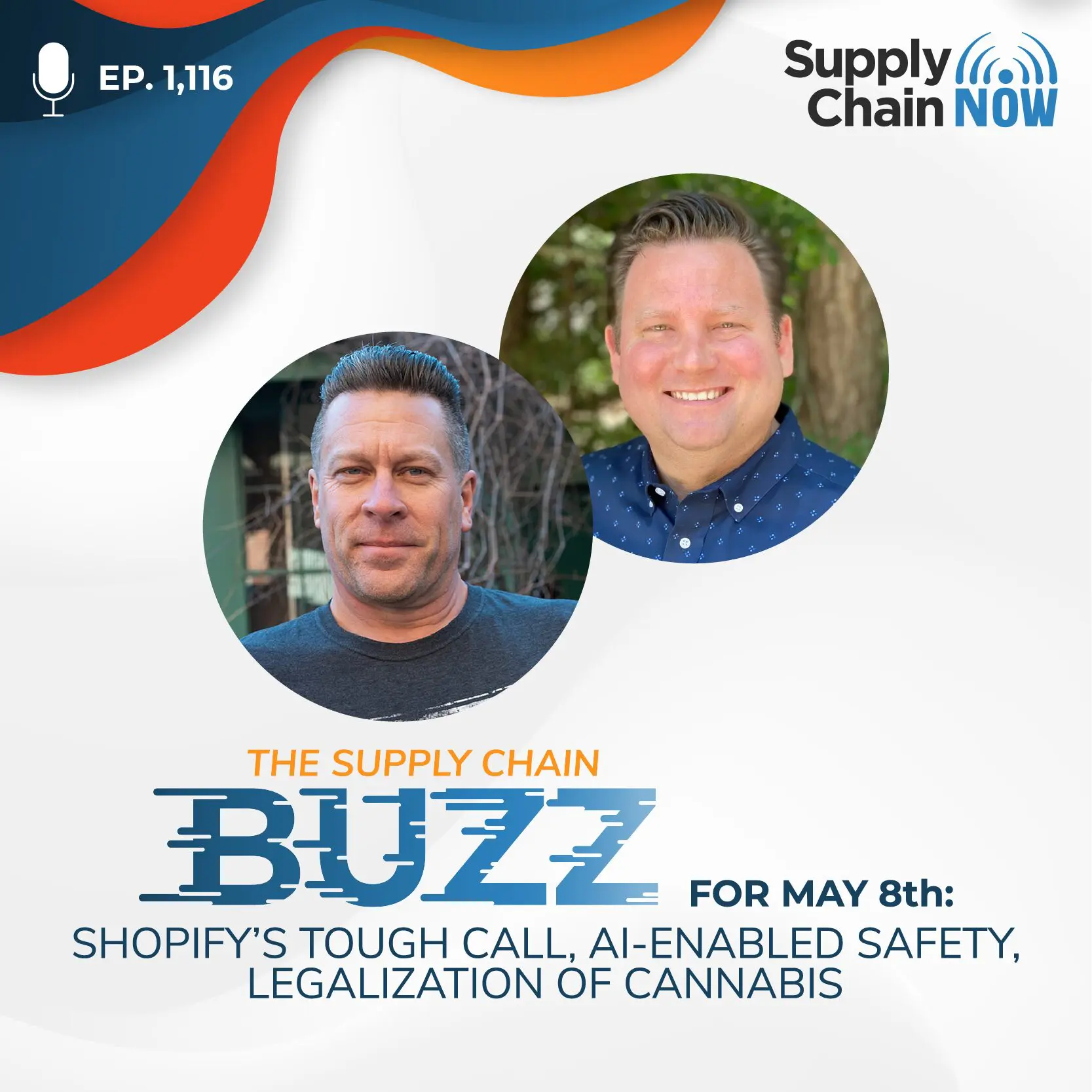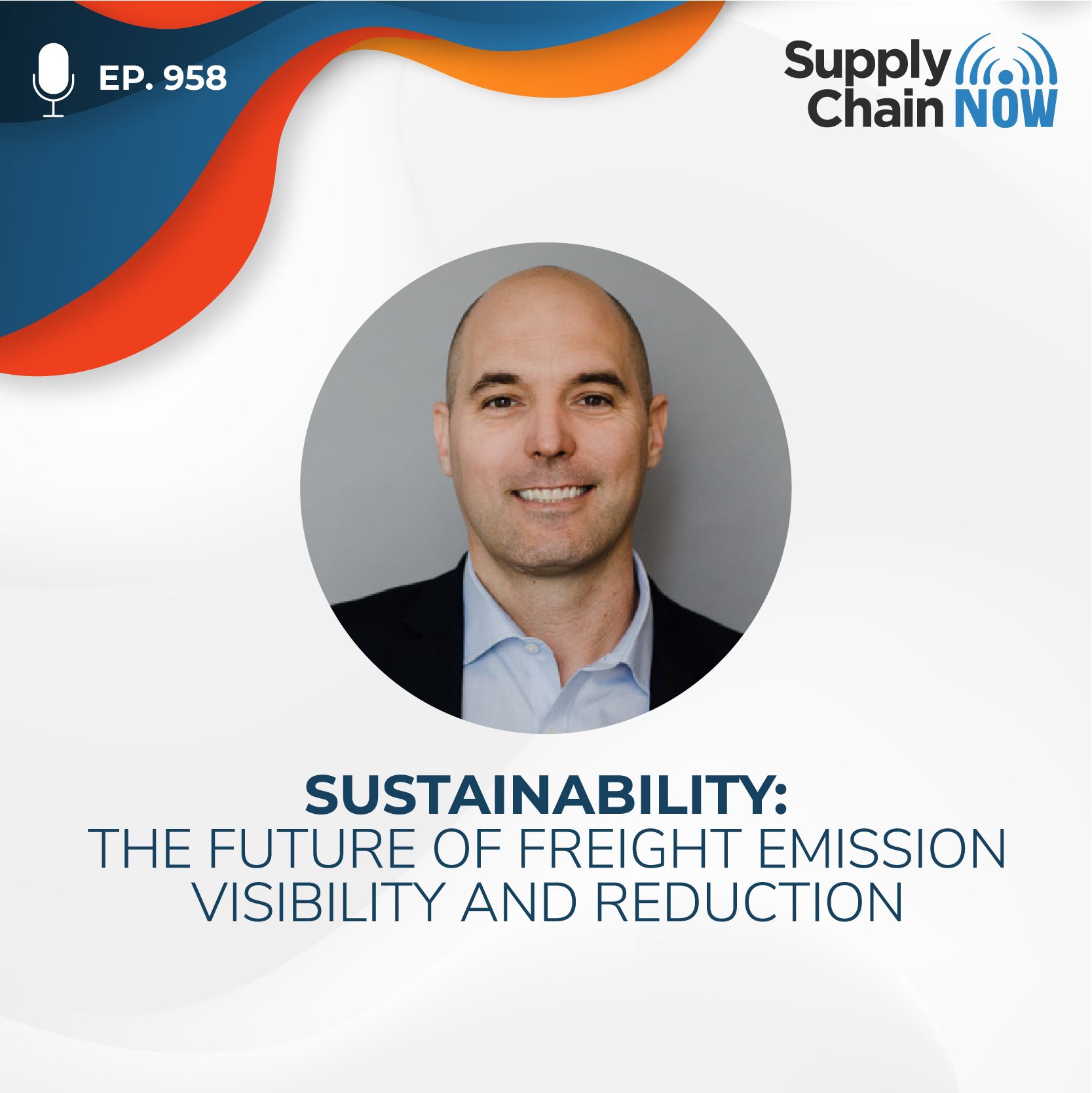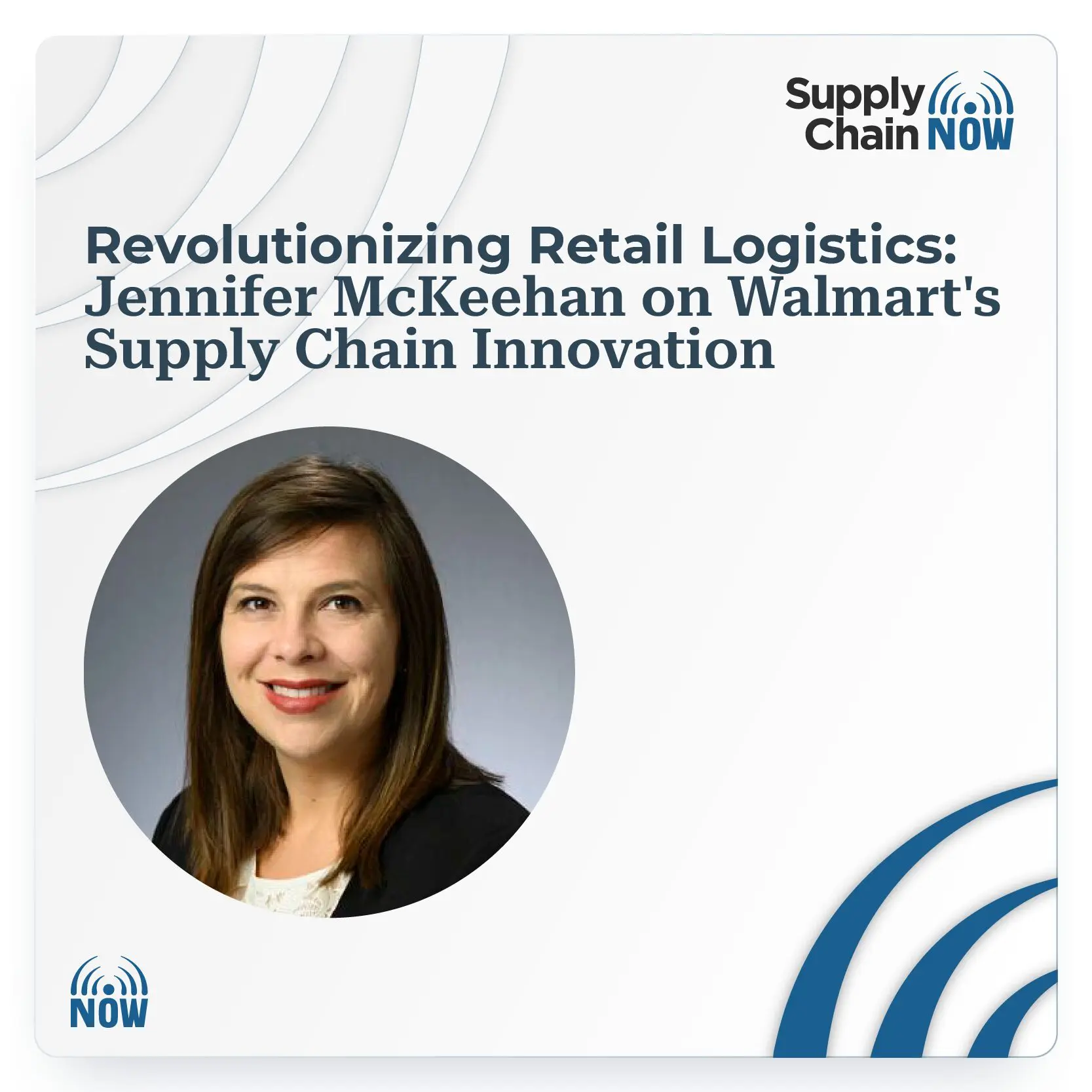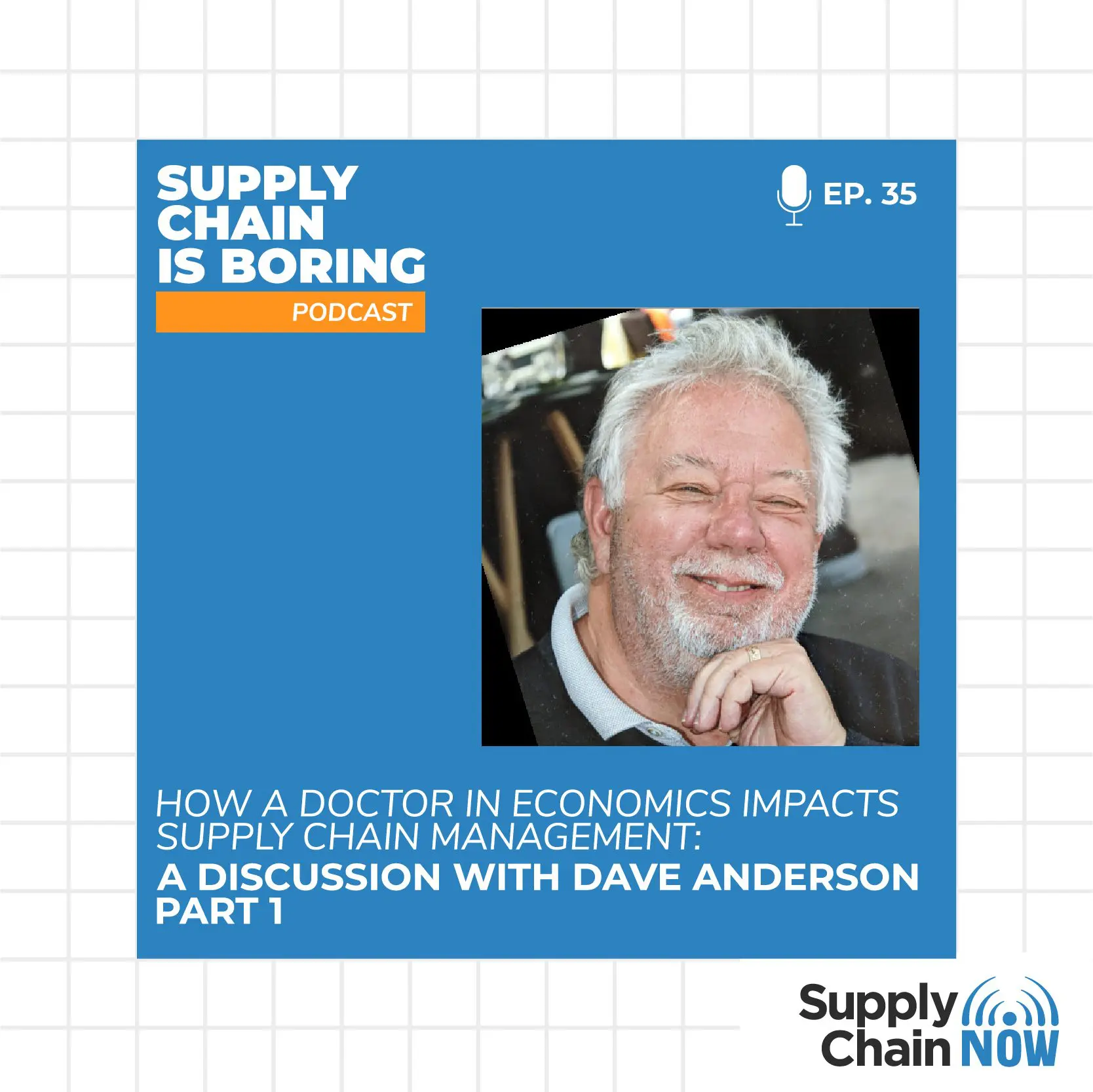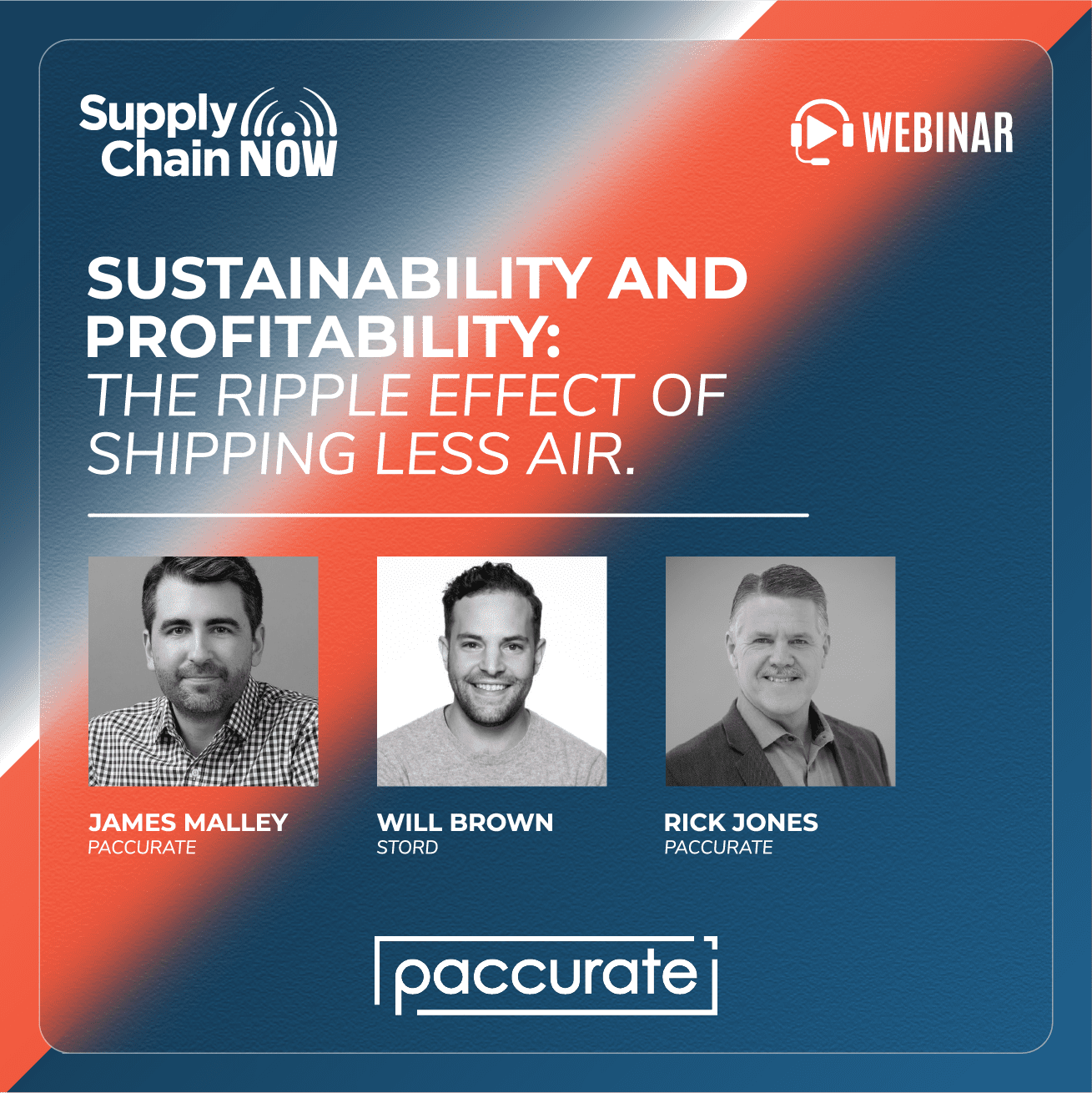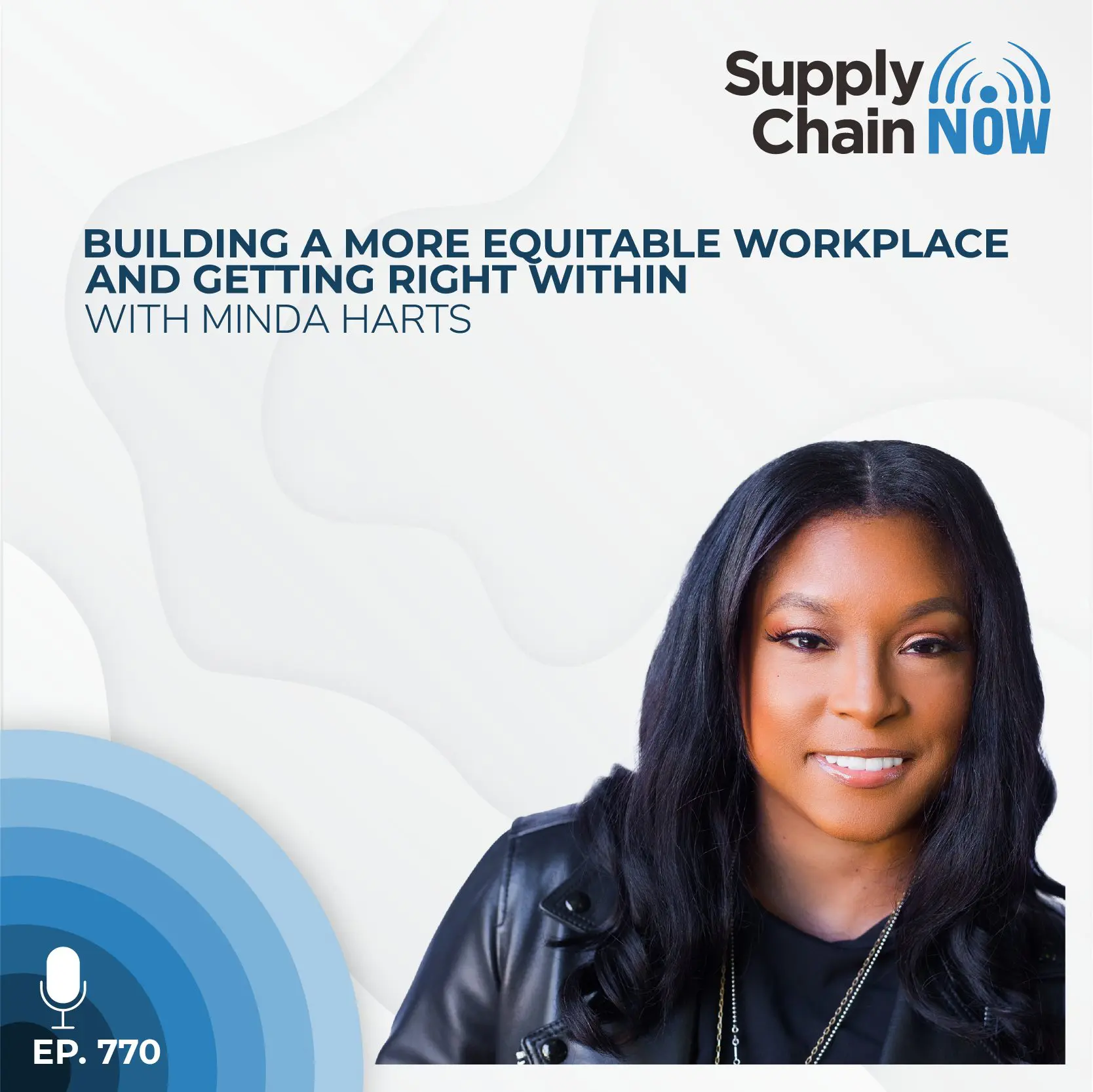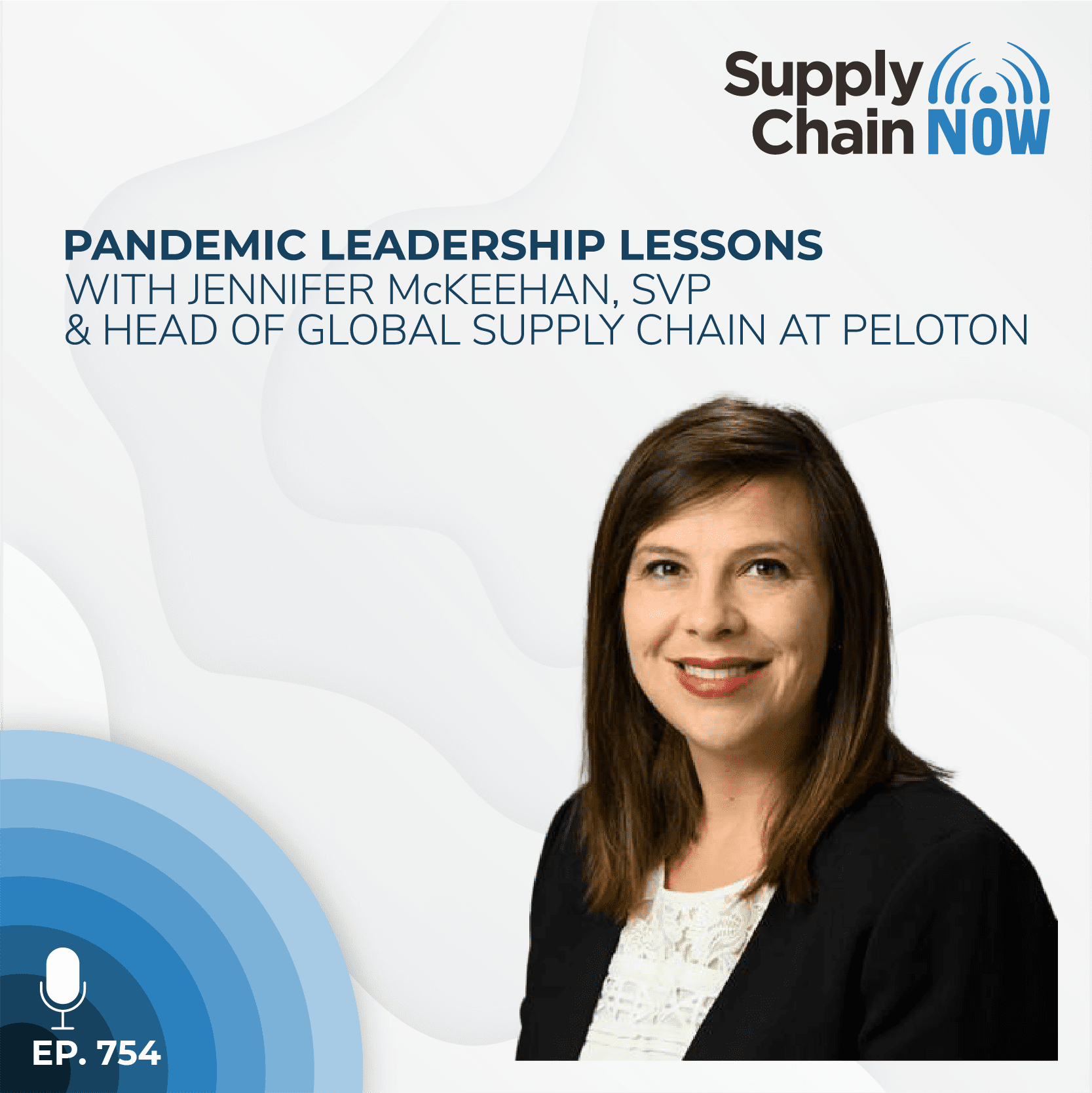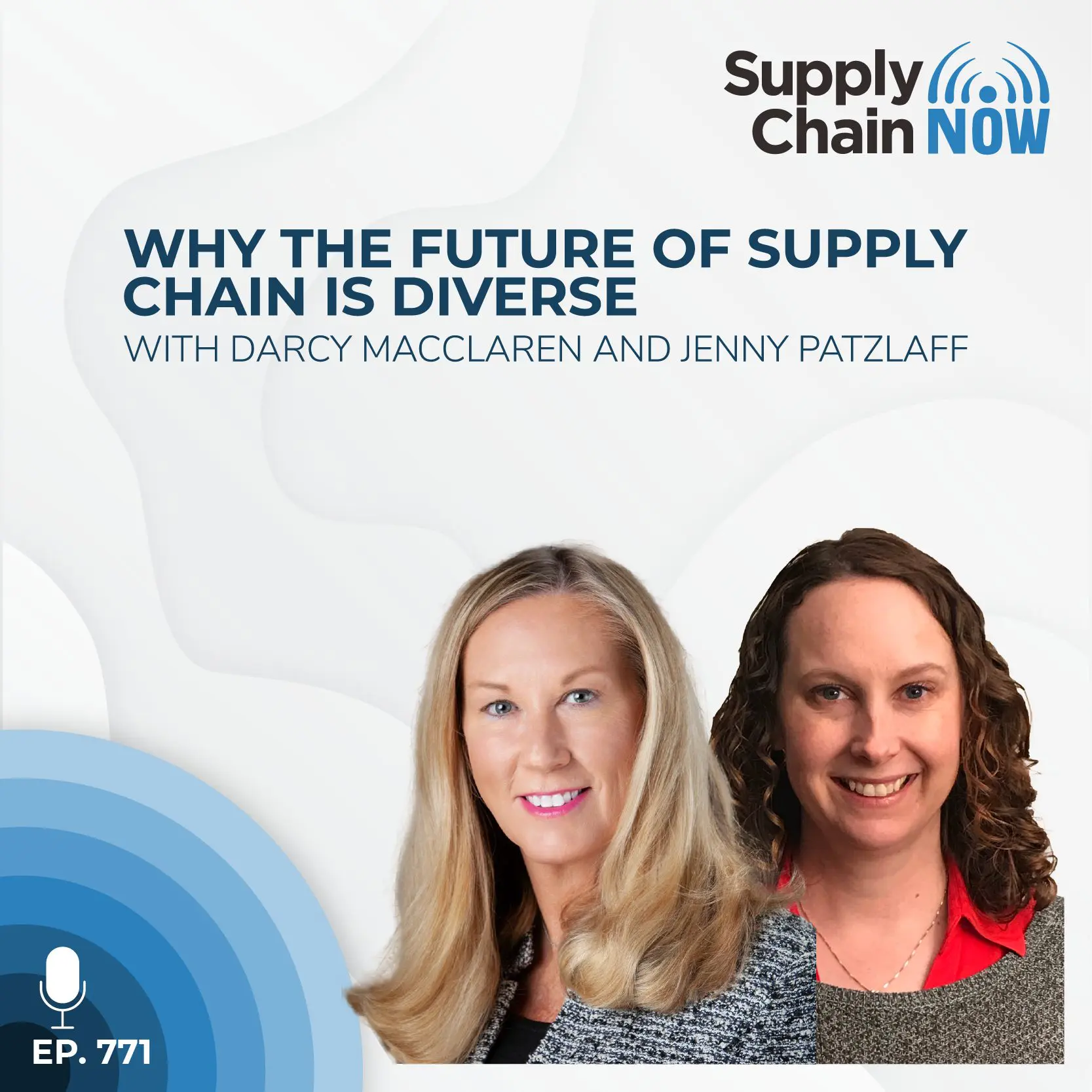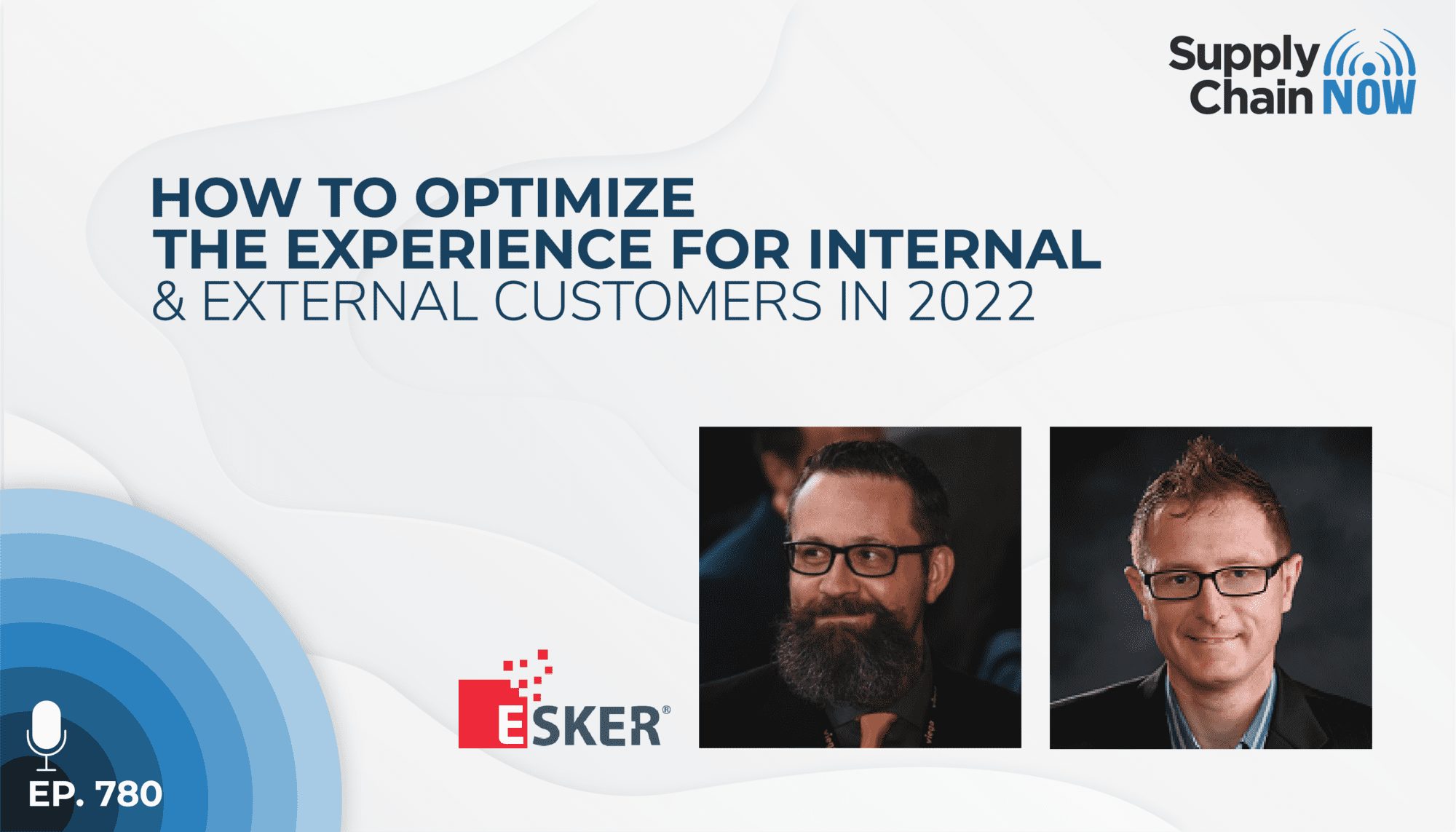
The one thing that kills customer service departments is bureaucracy. If somebody had a bad situation and you want to give them a $5 credit and you have to get that approved through the VP - you're doing something wrong.
-Chad Molen
Episode Summary
Between unpredictable disruptions, a lack of visibility and a whole slew of shortages, it can be pretty tough to deliver a positive customer experience these days. But don’t be discouraged: Dan Reeve, Director of Sales at Esker, and Chad Molen, Service Delivery Manager at NIMBL, have joined co-hosts Scott and Allison to break down what companies need to be thinking about, improving and protecting to up their CX game. Join them for a thoughtful discussion on the importance of prepping your people for new technologies, dialing into the right analytics, adopting more flexible processes and more.
Episode Transcript
Intro/Outro (00:03):
Welcome to Supply Chain Now, the voice of global supply chain. Supply Chain Now focuses on the best in the business for our worldwide audience, the people, the technologies, the best practices, and today’s critical issues, the challenges, and opportunities. Stay tuned to hear from those making global business happen right here on Supply Chain Now.
Scott Luton (00:31):
Hey. Hey. Good afternoon everybody. Scott Luton and Allison Krache Giddens right here on Supply Chain Now. Welcome to today’s show. Allison, how are we doing?
Allison Krache Giddens (00:40):
We’re doing good. How is it November?
Scott Luton (00:42):
How is it November? And how is almost halfway through November?
Allison Krache Giddens (00:45):
I don’t know.
Scott Luton (00:47):
Well, hey, you know, all that means is it gets us closer to Turkey day and lots of good food without the need to buy gifts.
Allison Krache Giddens (00:54):
Nice. Nice. And it’s a forgotten holiday. We often skip it, right? I mean, it feels like we go Halloween and then Christmas.
Scott Luton (01:00):
Oh, gosh. Yeah. The H holiday that we should never, ever speak of again. My kids love it, and so, you know, you got to be game for it, but it’s one of my least favorite holidays, for sure.
Allison Krache Giddens (01:13):
Why? It’s free chocolate and no obligation to house family.
Scott Luton (01:17):
True. But you got a bunch of randoms knocking at your door.
Allison Krache Giddens (01:21):
That’s a really good point.
Scott Luton (01:23):
All right. So, enough about our stirring holiday conversation. Today, Allison, we’re going to be talking about customer experience, CX is all the rage. And global supply chain has a lot to do with that. We’re going to be talking about how we optimize customer experience for both internal and external customers, because, Allison, you got to work hard to have one really big, happy family, right?
Allison Krache Giddens (01:47):
You’re right. You’re right. It takes a lot more than just hitting the button and hoping it all works out.
Scott Luton (01:53):
No kidding. Although, I think that’s a strategy some companies have out there. We’ve got our friends from Esker joining us once again, along with a leader from NIMBL Worldwide. So, stay tuned as Dan and Chad join us for what we promise to be an informative and intriguing conversation. Okay. So, Allison let’s say hello to a few folks before we swoosh in our guests. How about that?
Allison Krache Giddens (02:17):
That sounds good.
Scott Luton (02:18):
All right. So, we’re big fans of Sofia. It looks like Sofia is a big fan of “The one and only Allison Giddens,” as she says.
Allison Krache Giddens (02:25):
I had a check in the mail to her and it should be there any day.
Scott Luton (02:31):
Well, I’ll tell you, for as big of an ambassador for industry, and especially manufacturing, Sofia is a wonderful ambassador, and newly nominated recognized award winner for supply chain. And she’s already done a TEDx.
Allison Krache Giddens (02:46):
That’s awesome.
Scott Luton (02:46):
I tell you, Sofia has been on a roll. And I love her writing as well. Peter Bolle, all night and all day, “Best holiday of the year, Thanksgiving.” Peter I’m with you. That’s got my vote. Allison, what say you?
Allison Krache Giddens (02:58):
It’s high up there. It’s probably top ten.
Scott Luton (03:01):
Top ten. Arbor Day is top ten.
Allison Krache Giddens (03:05):
Yeah. A big fan Arbor Day.
Scott Luton (03:10):
So, seriously, Thanksgiving, for me, it probably is the top of the list because you can focus on gratitude, focus on food, focus on family, what you’re grateful for, and no gifts.
Allison Krache Giddens (03:22):
That’s true. See, I’m a fan of Christmas, but it’s because you know how they talk about your senses, kind of memory of senses. I smell pine and cinnamon and I love those smells. So, I think that’s why I think Christmas is high up for me. My birthday, I’m a fan of my birthday. That’s a magical holiday.
Scott Luton (03:42):
Okay. All right. Hey, a lot of emotions come out when we start talking holidays. But, Peter, me and you are on the same team. We have to start a lobby there. Bill Stankiewicz is with us here today. He’s on his son’s PC, so it appears as Doug. Allison, we both know Bill.
Allison Krache Giddens (04:03):
Bill. I haven’t seen Bill in forever.
Scott Luton (04:05):
I owe him a phone call, I do know that. And I’m really glad that you’re here with us today, Bill. We’re looking forward to your supply chain perspective. You’re helping to make Savannah a mecca when it comes to supply chain logistics, making all that happen. So, great to see you here, Bill. Okay. Let’s see. We’ve got a couple of other votes. Peter’s up to putting a final coat of plaster on the ceiling. Peter doesn’t get any sleep. He’s either doing big things in industry or he’s working on home improvement projects, Allison.
Allison Krache Giddens (04:36):
How is he doing that and typing comments? Like, how does that work?
Scott Luton (04:41):
On that poor computer.
Allison Krache Giddens (04:43):
Talk and text.
Scott Luton (04:43):
We’ll see. That’s right. Hey, Clay Phillips, Diesel Phillips, because the engine is always running is with us here today in the background. Fellow UGA fan like Allison. They’re having a heck of a season. Lamont Hardy calling in from San Diego via LinkedIn. Great to have you here, Lamont. Looking forward to your perspective.
Allison Krache Giddens (05:02):
San Diego is one of my favorite cities.
Scott Luton (05:04):
You know, I’ve never been. I’m ashamed to say that. But, Lamont, you have to send us some pictures. Let’s see. Mark Evans is with us here, “Looking forward to hearing what Chad has to say.” We are, too, Mark. And we’re going to swoosh them in, in a moment so that he can share his goodness with Allison, Dan, and I. Jonathan Phillippi – Phillippi probably – via LinkedIn, “Any tips for newbies in supply chain management?” Jonathan, that’s an excellent question. And what we’ll do, we’ll try to maybe drop in a few tips throughout the conversation. And if we don’t, because we’ve got a lot to get through when it comes to internal and external customer experience, maybe we can hook up after today’s livestream, and I’ve got some resources for you. Sofia, “I’ll be checking my mail, Allison.” All right.
Allison Krache Giddens (05:50):
I wish she had forgotten about it.
Scott Luton (05:51):
All right. And sorry we couldn’t get to everybody there. Looking forward to your perspective throughout this conversation. Allison, are you ready to introduce and bring in our esteemed guests here today?
Allison Krache Giddens (06:03):
Yes. I’m excited and I can’t wait to hear all about what they’re going to say.
Scott Luton (06:06):
Let’s do it. I want to welcome in Chad Molen, Service Delivery Manager with NIMBL Worldwide, and our dear friend, Dan Reeve, Head of Sales for Esker U.S. All right. Hey. Hey. Dan and Chad, how are we doing today?
Chad Molen (06:20):
Great. Hi.
Dan Reeve (06:21):
All good.
Scott Luton (06:22):
Well, you know, Dan, who always moves at the speed of a thousand gazelles, have you had a big busy, productive week this week?
Dan Reeve (06:31):
You know, I went to a tradeshow. The first tradeshow I’ve been to in, obviously, a while. If only all tradeshows where a ten minute Uber ride from your house, wouldn’t that be great? And, you know, I was tired. And I have to remember what it’s like to go and talk to 50 people in a day. You know, reinvigorating, nice to be back talking to people. Nothing wrong with doing what we’re doing right now, but nice to be talking to people in-person.
Scott Luton (06:58):
I’m with you. Breaking bread, shaking some hands.
Dan Reeve (07:00):
Yeah. Exactly. Yeah.
Scott Luton (07:02):
Well, we look forward to hearing more about that experience. And, Chad, I really enjoyed getting to you know a little better in the pre-show. It sounds like we’re supposed to spend some time in Wichita, but now you’re out in the beautiful Metro Denver area, and you’re getting out hiking and doing other things. So, great to see you here today.
Chad Molen (07:18):
Thank you. It’s good to be here.
Scott Luton (07:21):
Now, we’re going to go ahead and spill the goods. So, if your significant other is listening, Chad is taking you to dinner, I think, tonight or tomorrow night. I’m spilling the beans on you, Chad. Are you getting in a hike this afternoon before or do you do that mainly on the weekends or what?
Chad Molen (07:36):
Well, that would probably be a good idea so that I have more room for that big fat steak that I want.
Scott Luton (07:40):
Okay. All right. Well, again, pictures. Pictures or it didn’t happen. All right. We got one fun warm up question I’m going go around the horn. But really quick, I want to make sure I call out a few folks. Tsquared holds down the fort for us on YouTube. Great to see you here today. He’s looking forward to the Friday lunchtime supply chain management nourishment. I love that Tsquared. We’ve got a visitor from Greece here with us today via LinkedIn, Iordanis. Iordanis? Does that sound about right? Regardless, let me know if I butcher names. That happens from time to time. We want to make sure we get it right. But welcome. Looking forward to your perspective here. Steve is tuned in all the way from Kenya via LinkedIn. Great to see you here. Of course, Allie’s behind the scenes helping to make production happen. Big thanks to Allie, and Bree, and Matt, and Amanda, and Jada, and Clay. Okay.
Scott Luton (08:32):
So, let’s do this before we get down to the heavy lifting. So, today is National Happy Hour Day. So, there’s a couple of different groups that claim they founded happy hour. I found there was a U.S. World War I battleship, where it’s one of the stories where it originated. But regardless, happy hours are fueled by adult beverages. So, I’m going to go around the horn. Allison, I’m going to start with you this time. Give me your favorite adult beverage.
Allison Krache Giddens (09:01):
Okay. So, I get made fun of for this, vodka-Coke. I know that sounds weird and people say no rum goes in Coke. And I say, “No, it doesn’t. Vodka goes in Coke.” [Inaudible] try it, it’s good because you can’t taste the vodka.
Scott Luton (09:15):
All right. Vodka-Coke. Okay. That’s a new one for me. That’s a new one for me. And by the way, Helmut, great to see you here from the South of France. I think Dan was there earlier. All right. So, we’ve got one vote for vodka-Coke. You never know, that might be what Allison’s taken a sip of right there. Chad, I’m coming to you next, what is your adult beverage of choice?
Chad Molen (09:36):
I mean, you know, being from Colorado, it’d be wrong if I didn’t say that beer was my favorite, and IPA’s in particular. So, we have some of the best breweries in the country here in Colorado. And there’s nothing like finishing the day on a Friday and cracking open a really great cold beer.
Scott Luton (09:58):
I love that. I can almost hear that Busch Beer jingle in my head as you described that. All right. So, Dan, you’re the cleanup [inaudible] here today, your favorite adult beverage.
Dan Reeve (10:09):
You know, I get made fun of for this too. I’m not sure if this is right. But [inaudible] make fun of me for drinking. They said it’s more of a feminine or lady’s drink, I’m not sure if you’re even allowed to say that nowadays. But I like Baileys. Yes, I like beer. But I like to finish off the evening or a go-to cocktail for me is Baileys. And I think it’s because as a kid, my mum, that was her favorite tipple. Probably age eight, nine, or ten, I’m not sure what the right age was, I was allowed to start sipping a little bit of that as a treat.
Allison Krache Giddens (10:46):
You weren’t driving, it’s fine.
Chad Molen (10:49):
And that will help you to sleep faster.
Scott Luton (10:53):
Right. That’s true. All right. So, I got to share a couple here. Lamont has never heard of vodka-Coke either. Sofia says, “Tequila and grapefruit juice. Viva, Mexico.”
Chad Molen (11:06):
[Inaudible].
Scott Luton (11:06):
Peter, “Single malt scotch of most any type, Jack and Coke, followed closely by Crown and Coke.” Sheldon says a Brown Cow. I’ve heard of that before, Tia Maria and evaporated milk. Man, that sounds like a drink that will help you take little snooze as well.
Scott Luton (11:28):
I want to go back to something really quick and point out a couple of resources. So, you know, Jonathan asked about a newbie – in his words – when it comes to supply chain management. Sofia, you dropped a great resource here because our friend, Rodney Apple does great work. Formerly of the Atlanta area. He’s in Nashville now. But check out his Supply Chain Careers programming, and you’ll get a lot of tips. And, of course, if we can weave it in today, Allison, Chad, and Dan, a quick tip on folks as they’re kicking off their career and trying to advance and move right on up the ladder. One final one here, Mark says, “The Smokin’ Gun martini, vodka martini, slightly dirty, with a jalapeno stuffed olive, and a single drop of smoked chipotle Tabasco sauce.”
Allison Krache Giddens (12:14):
Wow. That’s artistic.
Scott Luton (12:17):
So, Chad, that can be your opening drink tonight at that nice steak dinner. We’ll see.
Chad Molen (12:24):
That locked it in. Absolutely.
Scott Luton (12:24):
Locked it in. All right. So, let’s get down to business. We love talking food and we certainly love enjoying each other’s company here today. But y’all have a lot to offer, especially when it comes to one of the hottest topics in the industry right now, I would say. So, we’re going to be talking about not only digital transformation, but also customer experience. And, Chad, I want to start with you. So, you led a digital transformation initiative at a company called Viega a few years back. So, if you would, talk to us about some of your primary eureka moments or key takeaways from that work, especially what you might think is timeless or related to what we’re going through now.
Chad Molen (13:04):
Sure. So, the situation I was in at Viega was very similar to what’s happening now. You had kind of this crucible of huge increase in demand. The team, basically, was kind of spread out, a pretty young team, entry-level folks. And the work was tedious to put it lightly. I love SAP and I support SAP in my role. But it can be a little daunting for folks that are coming into the company and working in an industry with a lot of complexity when it comes to orders and things like that. And in some cases, the orders, the quality of them is not the best. So, trying to sort all that out, working a lot of days overtime to get all those orders put in, it was a very difficult situation.
Chad Molen (13:59):
So, we had a high amount of turnover. We had people that just were frustrated with the work itself, with making errors, and things like that. So, that translates to your customers, which is never a good thing. So, we had a major issue. And with the growth that we foresaw, there was absolutely no way that we were going to be able to take that in with our current resources. So, I connected with Dan and we put together a review of different software that was out there, and got started on this digital transformation.
Chad Molen (14:36):
So, a couple of key takeaways for me, honestly, is, your people need to be prepared for it. So, you really have to look at what are their capabilities and, again, it’s entry level positions. But you’re looking for things like resiliency and change management, the ability to change quickly, ability to learn. And so, I think one of the aha moments that you asked, Scott, that I think is probably the biggest thing is, you can implement technology, but if your people are not ready for it, it’s not going to be as successful as you expect it to be.
Chad Molen (15:13):
And a perfect example of that is, with Esker, one of the things that I like about it is it uses machine learning and AI type technology. And you have to teach the system how to look at the orders. And so, I had a lot of folks that were using the system, but they didn’t understand the teaching part of it. So, one day I was walking around and I was looking at what people are doing and, basically, saw that they were just typing things in. And I said, “No. You’re supposed to teach the system that this means this.” And all of a sudden, that was kind of the big light bulb for me as you can bring the technology, but you need to lead the people to the technology and use it correctly.
Scott Luton (15:54):
I love that. And optimize it and customize it for what your operation needs. Rather than kind of using it right out of the box as the store delivered it. Teaching machines, I’ll tell you, it’s an amazing time we live in. But one of the things I heard there – and, Dan, I’ll come to you next based on what Chad just shared – I heard simplification, how important simplification is. But what was one of your favorite parts of what some of Chad’s takeaways were there, Dan?
Dan Reeve (16:22):
Yeah. I think it brings up an interesting point, which is, if you’re going to introduce a technology, you’re so much better served if you get folks, one, choose something whether they like the interface, because then they can’t use the interface as an excuse to not sort of go through the change. And two, exposing folks to the technology early and making them part of the decision-making cycle.
Dan Reeve (16:49):
In my role as a sales director, sometimes sales reps will take me and break me out of the case and take me on the road. Now, remember, a classic case with one of the largest gas stations in the U.S., so 500 or 600 gas stations they have – I won’t name them – they have a very large organization, and they were looking to transform their procure to pay process. And I have to tell you, I walked out of that meeting with 20 people in there and said, “I don’t think that’s going to happen.” You know, it seemed to be very disjointed. I know there’s some folks in the room that clearly want Esker but I’m not sure that’s going to happen. We got a call two days later and the folks had said, “Come on then. We want to do business with you, but let’s just negotiate a little bit.” I’m like, “Negotiate? You’re not even going to buy us. Here we are. We want you.”
Dan Reeve (17:35):
In 20 years, I thought I knew a thing or two about sales, maybe I don’t. I’m confused. What’s going on? They said, “The users. You engage the users. You ask them questions. You didn’t treat them as just users. You treat them as individuals, important viewpoints, and you let them happen.” And they said, “We like [inaudible]. We think we could adopt it.” So, that was an interesting learning. And since then, I’ve spoken to some other former customers of mine who said, “Dan, the thing that you guys do differently is, some sales folks will come in and they only sell to the executive.” Well, there’s other people in the room and they’ve got to go through this changed journey. You view people as equal, not just based on the title. So, I think change and giving everybody access and bringing the whole organization along versus just executives is pretty important.
Scott Luton (18:20):
We don’t want to steamroll anybody, right? Humans still make global business happen today. Of course, technology is a big part of that. I’m coming to you next, Allison. I want to share just a couple of quick things. Sibongiseni – Sibongiseni. I hope I got that right – Lewis from South Africa tuned in via LinkedIn, great to have you here today. And hey, Delano. You hit the right time to join us, because if it’s about CX and digital transformation, we’re talking about that a lot here today, so welcome to the conversation. Okay. So, Allison, as we kind of wrap this first bullet point and went to talk about Chad’s experiences there at Viega, what else did you hear there, Allison?
Allison Krache Giddens (19:01):
A lot resonated with me in my industry, which is really overlapping with everything that Dan and Chad are doing too. And that is the good information is needed to make good decisions, a friend of mine recently said that, a friend and colleague in some cybersecurity stuff I’m a part of. And then, the idea was to bring people into the conversation and get some buy-in from all the stakeholders. And, ultimately, it was about the exchange of ideas. And that’s what I’m hearing from both Dan and Chad, is, it’s not just about, you know, prescriptive solutions. It’s all about a little bit of feedback. Getting input from those that are going to be in the midst of it all. So, that’s what I’ve heard really predominantly between both Dan and Chad that’s solid.
Scott Luton (19:45):
I love that. You got to learn from the experts, the folks that do it. They’re some of your best resources there. Sheldon says, “The more change requires change in human behavior, the greater the risk of failing to meet the success criteria.” Well said there, Sheldon. And, Stephanie, great to have you here today via LinkedIn, so welcome, welcome. Okay.
Scott Luton (20:05):
So, we’ll do some level setting. We’ll do some level setting beyond what Chad shared. And I think Chad’s story is a great starting point because some of the factors there and the conditions were directly relevant to what we’re seeing now, just a lot more of it. He touched on the burnout that is taking place really across global business. We got to find which and then we’ll touch on – because Dan always talks about this – we’ve got to find ways of liberating and making it easier for folks to do more rewarding work. You’ve got all this talent in these organizations. But before we get there – Dan, I’ll come to you – because I want to level set with some of the things that are part of the current state, so where do we want to start there, Dan?
Dan Reeve (20:51):
Well, I think you’ve talked about the Great Resignation on your previous shows. I also have shared that the finance, the supply chain, the customer service leaders that, like Chad, have engaged with Esker often say, “Yeah. There’s a big picture initiative for digital transformation.” But what are we really trying to do? We’re trying to be easy to deal with. And that means, be easy to deal with both for your suppliers and your customers. And right now, taking care of your suppliers is important. I know a lot of people are focusing on what can we focus on, and that’s cash control and spend control. But, ultimately, right now you probably can’t afford to be bottom of the rank when it comes to that supply. You’ve got to, maybe, make sure that supply can remain liquid and pay them early. Because if you want to get your goods and services on time as possible right now, well, you can’t leave those folks hanging.
Dan Reeve (21:39):
So, you know, one of the things I heard from the IOFM, Institute of Financial Management, tradeshow last week, the executive editor there is Jess Scheer, and he said, “Look. Look around the room, 75 percent of the audience is gen-Z or millennials. I can tell you, you’re not going to be able to hire folks to come in, for example, the accounts payable departments.” The same story for receivables or auto management and planners. You’re not going to be able to hire folks to go and take care of suppliers. If you’re going to ask them to do sort of the manual tasks yesterday, these folks have all been through what we’ve been through, and they’re reconsidering the type of work they want to do. Many organizations are struggling to hire or retain staff.
Dan Reeve (22:20):
And he say, “Well, I think people are interested in doing is coming in, using the customer service, their creative analytical skills. And, yes, that might mean in payables, the ability to transform the department into a profit center.” Because you pay the supplier earlier and then you engage in supply chain financing – which we might cover later, Scott – or maybe there’s other mechanisms to make sure that you’re protecting your organization from spending in the wrong area or Maverick spend or fraud. But you’re still earning early payment discounts. He says, “Millennials will see that as an opportunity.” Just as servicing the customer, like when Chad freed up his staff to go and be rock stars and better serve the customer. And, therefore, one more business and more loyalty. I think there’s a lot of pressure to put people and putting technology in just for the sake of it. And putting it to sort of enable outcomes.
Scott Luton (23:13):
Enable outcomes. But to your earlier point, there is a ton of pressure out there, tons of pressure. Chad, I’ll come to you next. Based on the great resignation or anything else that Dan shared, and there’s a couple of things that we want to kind of lay out for the current state, what we’re experiencing, what sticks out in your mind, Chad?
Chad Molen (23:30):
A note of caution, and that is that, again, if you put in technology and you try to automate a bad process, you’re going to end up worse off than when you started. So, that’s a real key thing. And the thing that frustrates me that a lot of companies that are really stuck in right now is that, if you remember Stephen Covey’s analogy of the sharpening the saw. You’ve got a lot of people that are trying to cut down trees with Dole sauce, and basically every time you talk to them about, “Hey, what about this or what about that?” They’re like, “I can’t get away from this tree I got — at it.” So, you know, the reality is, you’ve got to take time, step back, look at your processes, and map them out. And then, you look at a combination of people and technology to resolve those issues.
Scott Luton (24:24):
Well said. And a lot of folks are sharpening, working with some world-class sharp saws, but they’re taking down the wrong trees. They’re taking down their neighbor’s trees. You got to make sure we’re attacking with technology and innovation, the right things. Allison, what else would you add to this first kind of what we’re seeing?
Allison Krache Giddens (24:42):
I liked what Chad said, fed into a lot of what Dan said. And I’m going to give a shout out to Deborah Dull, the all-knowing guru of circular supply chain, and it is about engaging your customers and vendors and suppliers. I think it’s really easy in industry to prioritize our customers and kind of forget about the employees and kind of forget about the vendors, because – gosh – they’re lower on the totem pole. No. If we think of things more as circular, and if we can get the contributions from the vendors and the employees and the team in general, then we know whether or not this is the right tree to be cut down in the first place.
Scott Luton (25:20):
I love that, Allison. I love that. And Deborah is a guru for sure. Circularity and inventory is one of her favorite things to talk about.
Allison Krache Giddens (25:27):
Don’t tell Deborah I’m suggesting we cut down a tree. That is not part of the circular supply chain.
Scott Luton (25:32):
All right. I want to share a couple of quick comments from the audience. Sofia is dropping the newest McKinsey podcast, talking about some of the reasons behind why people are quitting and how to retain them. And some of what we’re talking about today goes right to that. Sheldon says, “The Great Resignation is a battle between the past and the future between employee values and firm values is the great realignment.” I like that.
Scott Luton (26:00):
Well, I don’t want to get ahead of us, so we’re going to talk about how we can beat some of these market conditions. I want to circle back to you, Dan. What’s the second thing you’d share about the current state?
Dan Reeve (26:11):
Well, I think probably more disruptions are likely. And I was reading something the other day and it was talking about how, you know, you still got pockets of COVID popping up in different areas. You’ve got companies in Europe – give me a second to pop my notebook – there was a company in Europe who provides one-third of the plastic that goes into the majority of automobiles. And they were saying, “Hey, we’re buying lots of parts. We can’t sell because the key components we need to, therefore, meet the demand that we have we cannot fulfill.” So, we’re actually sitting on a huge amount of inventory. We’ve got orders. We’re sitting on a lot of inventory. We can’t turn that cat. We can’t recognize an invoice. And we can’t actually supply the whole combined unit. So, a really difficult situation.
Dan Reeve (27:01):
So, I think it’s likely we’re going to see continued disruption, continued frustrations. And, therefore, if we’re going to talk Stephen Covey, we’re going to have to focus on what we can control in our circle of influence. What can we control ourselves? In our world, a lot of the finance leaders are saying, “Okay. We better focus on cash. We can at least make sure we’re fishing with cash. We can at least try and collect on time or early payment discounts.” And I realized that another part of that is inventory. Now, I’m not an inventory expert, but I realized that there’s there’s companies like, “Well, if we could turn inventory faster or minimize it, that might be another way to improve working capital.”
Scott Luton (27:46):
One quick follow-up to that. And then, Allison and Chad, I’m coming to y’all next. But on a related note, we’ve talked about this before, we’re talking about it pre-show, that drain on customer service teams. Because if we are making it harder for our customer service, our inside sales teams, you name it, the internal customer, it’s going to be much tougher to control the cash flow and, to your point, optimize those things that are more within our control, because we know there’s more things out of our control coming. So, speak to that for just a quick second, Dan, you know, really reducing that strain on internal customer service, inside sales, you name it.
Dan Reeve (28:26):
Yeah. I think, the organizations that engage with us, often, what they are trying to do is make sure that they can free their stuff up. And we’ve said that can be through automation, AI, and other technologies. Marisa Brown from AQPC talked about this, she says, “You know, in the future, what you’re trying to do is free up your staff to go and do real value engineering. And, therefore, they’re more likely to stay.” So, that might mean, “Hey, I have so many payables that we’ll go and work with procurement and breakdown silos.” Or, “I have so many customer service who can talk to sales, and procurement, and the customer.” You might even give them a little initiative or a pet project to work on where they can go and use those skills and they can feel that they’re making a difference. So, Marisa sort of talks about the value of deep work.
Dan Reeve (29:19):
I think the problem is, right now, how do you sort of free people up when it’s just the volume of questions and queries and email is overwhelming. You know, I think many of us have perhaps looked at and said, “Work-life balance, that isn’t going to happen. So, instead, how do I make sure I’m at least getting some balance or some grounding of what I need to do for me, my health, and my family, and all the rest of it? It’s an interesting time. It’s like, you know, push and pull in so many different directions.
Scott Luton (29:48):
All right. So, a lot there to kind of unpack a bit there, Chad. But out of everything you heard Dan just shared there, what immediately comes to mind as a priority?
Chad Molen (29:58):
So, first and foremost, unfortunately in a lot of companies, customer service tends to be the most mistreated and non-valued part of the organization. So, first and foremost, I would say, please take care of your customer service people. Do crazy things to keep the motivation and the energy. One thing that I did that I absolutely loved during the height of the quarantine was, I would walk around my neighborhood and I would video myself talking to the staff. And I would talk about just random topics or different things. Or sometimes it was just being honest and saying, “Hey, the situation that we’re in right now really sucks.” And some of you are, like, single parents, and dealing with a lot of things that typically is not a part of your general work environment. So, that is what I would say first and foremost.
Chad Molen (30:56):
Secondly, I would say that, this is really where your good customer service people can play a huge role and the analytics that Allison was talking about. So, if you put analytics to play with your backorders, with orders that are coming in, and you have people who know the products well enough and know the customers well enough, they can call them and say, “Look, you ordered these things, but we don’t have them right now. So, we have these other things,” and maybe they’re like a bulk item, so they’re like the same exact item, but that it’s a bulk item so that you buy more, or it’s a different color, or different things like that. That stuff is invaluable because nine times out of ten, I mean, in the industry that I was in before with plumbing and heating, if it’s behind the wall, who cares? They just need the product. They need to get their work done. So, give them an alternative and they’re going to take it.
Scott Luton (31:49):
There’s a reason we don’t have pink pipes or blue pipes or designer pipes. Right, Chad?
Chad Molen (31:54):
Yes.
Scott Luton (31:55):
I love that. So, those are two big points. Allison, you were nodding your head, I think, throughout Chad’s answer. What resonates the most with you?
Allison Krache Giddens (32:04):
It makes me think about, I recently ordered something online from a small business out west. And they contacted me and they said, “We’re so sorry we don’t have the item that you ordered. But I can make a recommendation to this instead.” I said, “Okay. That’s fine. Sure. That’s good.” They sent it, and then I decided I liked it, so I was going to order something else. So, I’m back to the website, ordered something, got an email from the person. She said, “I’m so embarrassed.” You know where this is going. “That’s not in stock either. I feel so bad.” And she was so genuine in the email tha it was obvious that this is a goofy time for everybody. She was all prepared to have me cancel the order, which I did not do. I said, “Send me what you think is the best comparable version,” and she did. And I’ll probably be a lifelong customer because of that. So, I think that speaks exactly to what Chad’s saying.
Scott Luton (32:56):
I love that. And I love that Dan Gingiss has a new book out focused on customer experience, and he talks about what you’re speaking to, that experience where there’s follow-up, there’s humanism. Clearly, you’ve got someone that wants to do a good job. I would argue and I’ll defer to the experts here, if your technology doesn’t free up your people to spend time on that, instead of they’re completely consumed in the blocking and tackling, you’re going to limit your customer service professionals to do things like that, Allison. Dan, Chad, any comments there?
Dan Reeve (33:35):
Yeah. Sure. One that comes to mind is, a few years ago, [inaudible] changed their tone and said, it’s no longer price and product alone. You need to come compete through service. Then, they went a bit further and said, where it really comes to the fore is when you fix issues, how quickly you resolve. Again, back to hiring folks with customer service skills. I mean, now that’s not just customer service. That’s bringing folks in with empathy and collaboration and customer service skills into finance as well as customer service. How quickly can those folks apply those skills?
Dan Reeve (34:10):
In your case, Allison, you probably felt heard and understood. There’s some empathy. There’s some tact. And it’s not just a bot response. So, I think people do want quick responses and quick information, but still we appreciate a little bit of tact and empathy, and that, I think, is a great example of that organization freeing up staff to go and do that sort of thing.
Dan Reeve (34:30):
A few years ago, I was in Tennessee and a CIO who worked for Esker said to me, “Dan, it would be nice if you could show me all the things that customers wanted that we couldn’t supply.” And I think he was in a similar mindset. Maybe I need to be going back to those folks and sort of saying to them, “I couldn’t give you that. Let’s talk about that. Let’s not brush it under the carpet, so I couldn’t give you that. But, you know, should I be changing what I stock? Tell me more about that.” So, they were seeing that as an opportunity to reengage with the customer.
Scott Luton (35:01):
All right. So, Chad, I’m coming to you for a really quick response. I’m going to share a couple of comments. And then, we’ve got to move to what are we going to do about it? So, Chad, your quick take.
Chad Molen (35:09):
It’s really important to think outside the box on the delivery situations. And I had a fun kind of story. It was challenging for me, but I had a lot of fun with it. And that is, that a customer had a pallet of material that was sitting at a hub here in the Denver area. And they were literally, like, five miles away. And so, I just kind of got fed up and I said, “You know what? I’m going to take our training van. I’m going to drive out there. I’m going to find it. I’m going to put it on the truck. And I’m going to deliver it to them.” And I tell you, that customer we earned was, you know, for life. And I can’t do that with every situation. But, again, kind of going back to those analytics situations, if you use a little bit of combination of data, and your own intuition, and just do the right thing, you’re always going to win in that situation.
Scott Luton (36:03):
I love that, Chad. I love that hammer meet nail type of thinking. You know, it’s within our control to earn customers for life. I want to point out – and Amanda or Allie, if we can drop this in the comment – The Experience Maker by Dan Gingiss is a wonderful read. It goes to the heart of CX, the heart of what we’re talking about, how to create remarkable experiences that your customers can’t wait to share. And all three of our panelists here have talked about that.
Scott Luton (36:30):
All right. I want to share a couple of quick comments. Peter points out a great listen on the Una Sourcing Hero with Jeffrey Ostrander. That is a great listen and I listen to that myself. Peter, great call out. “Dan’s right on the money,” Sheldon says. Right on the money as always, Dan. “Balance cash, service levels, and cost.”
Dan Reeve (36:50):
I love Sheldon already, for sure.
Scott Luton (36:54):
Mark says, “Forget work-life balance. Read the book One Life by Morten Albaek. It is life-changing.” How about that? Sheldon says, “Chad’s on point, too, that data is going to give you insight. You got to be transparent, build customer intimacy through your knowledge. Hell leverage. It is a competitive advantage. Good stuff, Chad.” All right. I love that.
Scott Luton (37:19):
So, let’s do this. I want to get around, Chad is a perfect segue. He jumped in that van and went and made that happen. He took action. So, on that note, how can we act on these current challenges and the challenges that are right around the corner? And let’s see here, Chad, I want to start with you here. We have three great problem solvers, but, Chad, you seem to take your problem solving very seriously. So, how can we do something about these conditions that we’re handed?
Chad Molen (37:48):
I love solving problems. I mean, that’s what gets me up every day. So, for me, it always comes back to people, process, and technology, and it’s in that order. So, first and foremost, you’ve got to understand what you need from a people perspective. You got to size up your staff and figure out real quickly who’s ready, who’s not, who’s salvageable, and who do we need to help move on to a new opportunity. I know that sounds kind of harsh, but, you know, if you remember back to the – I think it was a Jim Collins’ book, Good to Great, he talks about getting the right people on the bus and the wrong people off. And so, I don’t have any bones about making those hard decisions.
Chad Molen (38:34):
And then, the next thing to look at your processes. The stuff that you guys talked about as far as flexibility, it’s really good to have tight processes, but you need to have some flexibility in there to give people the right information. And the one thing that kills customer service departments is bureaucracy. If somebody had a bad situation, and you want to give them a $5 credit, and you got to get that approved through the VP, you’re doing something wrong. So, the last thing is, once you kind of have those things tied up, then move on to technology. Look at automating all of the nonsense that you don’t really want people spending their time on. But do it very selectively and do it carefully at an appropriate pace. Because if you do it too quickly and you don’t have good change management, you’re going to crash and burn.
Scott Luton (39:32):
I love that. Don’t have people compiling transactions, automate that. Have the people analyze the transactions. Using their experience to find those signals that can improve the external and the internal customer experience and just the business itself. So, I love that, Chad. And then, of course, that’s a proven framework, people, process, technology. Allison, what would you add to that?
Allison Krache Giddens (39:57):
Chad, that reminds me of that first part of the equation of empowering your people to be able to do what they need to do. And that is the book, Delivering Happiness, about Zappos and about, in the early days, how he empowered his people to just do just that. “You don’t like your shoes? All right. We’ll send you a new pair.” I mean, crazy concepts to spend 25 bucks to save a hundred later.
Scott Luton (40:28):
Great call-out. And rest in peace, Tony Hsieh. I believe that’s how we pronounce his last name. Tragedy. All right. But still, the legacy is left behind. The culture behind Zappos, that was one of the earliest companies that hit the CX radar and to make CX such a thing. So, Dan, a home run hitter today. You’re the Jorge – actually, Jorge Soler, he’s not in the cleanup spot, Allison. He’s lead off. He just looks like a cleanup hitter, right?
Allison Krache Giddens (41:02):
He does and that swing does too.
Scott Luton (41:03):
That’s right. So, Dan and Chad, bear with us as we continue to celebrate the World Series Champs.
Allison Krache Giddens (41:08):
We’re still on kind of that high.
Scott Luton (41:10):
That’s right. The Atlanta Braves. Okay. So, Dan, we kind of switched over to what are we going to do about it, between old proven approaches and some new cutting edge stuff, what else would you add?
Dan Reeve (41:21):
Yeah. So, we’re talking books today, I think on the last show I talked about Gen. Stanley McChrystal’s Team of Teams. Now, I’m onto a book called Multipliers. I think, often, your customer service staff, your supply chain planners don’t forget. And it is easy to do so, I think, as many of us hold a leadership position. It’s easy to assume that, you know, we have to come up with all the answers and we know best, and that can be draining. And I think, often, it can be invigorating and a retention tool if you’re asking your folks, “Hey, guys, ladies and gents, what ideas have you got? Reach out to your suppliers, what ideas have your suppliers and your customers got?” And people might enjoy just being part of the process, “Hey, look. I’m laying out the struggles we’re facing. Does anybody got any ideas?” Even crazy stuff.
Dan Reeve (42:15):
And I think departments and employees, one of the things over the course earlier this week, I was talking about the power of influence, some of the keys where people like to be part of the process, people like to be informed. Yes, people want opportunity to grow and develop. But just being part of the conversation and being given the opportunity to sort of contribute —
Scott Luton (42:38):
Right. Definitely. Engage, be part of the conversations being had. Dan, by the way, my hunch would be if you put your book on Amazon, it’d be a bestseller. It sounds like you’ve got to put chock full of some golden observations there. So, let’s put the books up, let’s bring the crystal balls out. I tell you, just when you think you can’t see anything new and stuff that hasn’t happened before, something else crazy happens. I want to start with Chad. So, as Allison and I had our holiday conversation on the frontend, we’re already midway through November, it’s crazy. Which, on one hand kind of thankful to get through the year that has been, 2021. But, Chad, name one thing that’s right around the corner that you believe business leaders should expect in the new year?
Chad Molen (43:36):
I think like Dan said, you know, that there’s going to be continued disruption. I think there’s a mass exodus – not mass exodus, but a mass move to the Cloud in every way, shape, and form. And if you think about that from a company perspective and the amount of resources and effort that goes into maintaining systems and things like that, that’s probably one of the biggest things that I see. And, you know, it kind of aligns with, like, SAP, the system that I support. Their focus is on moving people to the cloud. It’s on extracting that information out of the system to use it to make better decisions. So, analytics is coupled with that.
Chad Molen (44:16):
And, honestly, I think people aren’t really doing analytics, like what we’ve talked about here on this show. They’re not using that information to make the decisions. And that’s a combination of predictive analytics, a combination of the old school sales reports. But you have to have the people again to be able to interpret that information to make good decisions. So, I think there’s going to be a lot of focus on moving to the Cloud and using information that they now have more available to make better decisions.
Scott Luton (44:48):
I love that. Ten years, as Greg White would say if he was here with us, Dan and Allison. It only took the Cloud ten years to be an overnight success. All right. So, I want to come to Dan next. Allison, you’ll be Freddie Freeman in a second. But, Dan, what else would you add when it comes to what to expect? What business leaders should expect in 2022?
Dan Reeve (45:10):
I think I’m going to talk about, obviously, disruption. But to be specific, the Harvard article I read the other day said, we’re seeing customers cancel orders as short as 48 hours. So, I think all that means is supply chain planners and customer service folks need to be freed up so they can be checking. You ask for that quotation, “How are we doing? And I’m hurting more from you. I was expecting the order in now.” More time to follow up – I don’t know if the word to use is Panda – more time to service the customer to make sure that you are indeed winning that business. Or have the opportunity to say, “All right. Well, is there anything I can do to make it easier?”
Dan Reeve (45:47):
Pre-pandemic, customer service leaders, some forward thinking folks like Chad and another gentleman I know in Chicago, they were freeing up their teams to go and visit customers. Yes, that’s right. And I know you don’t normally get to go and see the customer. But I want you to go and learn their business, engage, build a relationship. I think that stuff is all applicable, maybe even more important now. We can’t just take that business for granted. We don’t want to get orders cut off within 48 hours canceled. Do we have to sort of go and work harder and protect that business?
Scott Luton (46:22):
Right. Excellent points there, Dan. Allison, what else would you add?
Allison Krache Giddens (46:29):
It reminds me of that saying, “What’s the definition of crazy? Doing the same thing over and over and expecting different results.” So, I think going forward, the crystal ball, at least in my head, is, we’ve got to be willing to think of things differently. And engaging people like Dan and Chad are great because they’re not only thinking about the next step, but they’re thinking of the two steps after that, and engaging the right people along the way. So, I think the resiliency factor and the change management comes back down to what Chad said earlier, don’t think about the next step. Think about the two steps after that.
Scott Luton (47:06):
Yes. Like you’re playing chess and not checkers, right? I want to add, Lamont talking about a point Chad made earlier, “Sometimes you have to be proactive to provide the best customer service possible.” Tsquared says, “Hey, data is going to give you insights so long as it’s clean data.” That’s a good point there, Tsquared. Geoff LeRoy is with us. Geoff, hope this finds you well. It’s been too long. Also, down in the Savannah market doing some big things. “I send my customer service reps to our industry sales meetings on a rotating basis to further develop the relationships.” I love that, Geoff. And Happy Thanksgiving to you a couple of weeks early. It’s the only thing anyone’s getting early this holiday season. All right.
Scott Luton (47:49):
So, I hate to start to wind the conversation down, but the clock says we must. And, Dan, we’ll circle back to you. We’ve enjoyed having you and the Esker team a part of these conversations a variety of times. How can folks connect with you and the heavy hitting lineup that is the Esker team?
Dan Reeve (48:10):
Sure. You can reach me at daniel.reeve@esker.com or find me on LinkedIn at Daniel Reeve at Esker.
Scott Luton (48:17):
Wonderful. And it’s not Allison, like I made in the first episode with Dan. It’s not like Dan Reeves, a former Atlanta Falcons Head Coach. There’s no S. It’s daniel.reeve@esker.com. Hey, I want to circle, Dan, if you had to put a nutshell in your least salesy informational but key bullet point to deliver to our listeners, what does Esker do in a nutshell?
Dan Reeve (48:43):
Yeah. I mean, I think it’s a case of finance leaders, supply chain leaders, folks who are in order to cash, they’ll often turn to us because they are trying to free up their staff to be rock stars. Take better care of customers or suppliers. Why is it? You know, we got that cash conversion cycle and people are trying to spend it faster so they can be more effective with their cash.
Scott Luton (49:05):
I love that. All right. I appreciate you sharing that. All right. So, let’s go to Chad Molen next. Chad, you’ve dropped so much, and we hadn’t even gotten into the food aspect of some of the things you do when you’re not solving problems at work and whatnot. But how can folks connect with you if they want to hear some more of your thoughts?
Chad Molen (49:26):
Yeah. It’s too bad we aren’t just breaking after this to go grab one together. But you can reach me at chad.molen@benimbl.com or you can connect with me with LinkedIn or NIMBL’s website is benimbl.com.
Scott Luton (49:44):
I love that. And really kidding aside, whether it’s a steak or some of your hikes you’ve got coming up, we got to see some pictures. We’d love to share that with our community. Dan, it’d be tough to top Dan. Dan spent some time in Corsica a month or so ago and sent us some gorgeous pictures that we shared. So, keep those pictures coming or it didn’t happen.
Scott Luton (50:07):
Allison, I love our work together. And beyond Win-Tech, I know it takes a bunch of your time. Of course, you lead the nonprofit, the Dave Krache Foundation, which helps to equip the Atlanta area kids that can’t afford the sports fees and just the high cost of playing organized sports. I love that nonprofit work. How can folks connect with you, Allison?
Allison Krache Giddens (50:29):
The best way to reach me is LinkedIn. I’m pretty active there. So, find me Allison Giddens. I’m on there. You won’t miss me.
Scott Luton (50:35):
And it’s a great follow and connection there. Okay. Well, Allison, Dan, and Chad, we finished a little bit early, so we had a little fun question on the frontend, so I’m going to throw one more fun question on the backend before we swoosh Dan and Chad out. And that question is going to be, what is your prediction? We’re deep in the college football season. Allison’s a big UGA fan. They’re having a hall of fame year. But, Dan and Chad, if y’all had to pick who you think is going to win it all in college playoffs this year, who would that be? And, Dan, I’m going to put you on the spot first.
Dan Reeve (51:14):
I have to be honest, I haven’t followed it. All I care about is the Badger game next weekend. I’m flying back to Madison for the big Nebraska game. As long as you beat those Uconn Huskies, I’m happy. I don’t care what else happens. What are we not getting?
Scott Luton (51:28):
I love that, Dan. I love that. I’ve never been to Madison. And, of course, we’ll talk with Bree and numerous others about the great state of Wisconsin. We’ll have to check out how the game goes.
Dan Reeve (51:40):
I will add something though, Scott. I have been to an SEC game. I’ve been to one game. I went to visit the CIO of Coca-Cola Bottling. And he said, “What are you doing tomorrow?” And I said, “Not a lot.” He said, “Well, I’m going to take you to a game.” So, I did go to a college game there in Atlanta. So, now, I came back to Wisconsin that night and I was wearing a Georgia Tech t-shirt. And let me tell you, a lot of people called me out for it and said, “You can’t wear that here today. This is a different conference.”
Scott Luton (52:13):
Well, hey, you’re going to have to come back. We’re going to do this in-person next time.
Dan Reeve (52:17):
I like those games. Georgia Tech was a good day out. I enjoyed it.
Scott Luton (52:20):
Wonderful. We’ll have to do this in-person next go round. But thanks for sharing that. Chad, whether you’re going to pick a winner or if you want to share something about your team, what would that be?
Chad Molen (52:30):
Well, unfortunately, I have to tell my ignorance and that I’m not big into college football. Coming from Kansas, college basketball is where it’s at. But I will say I’m always a big fan of the underdog and I’d love to see UGA get out there. So, yeah, all the best there.
Scott Luton (52:50):
Awesome. Awesome. And to your point, the big season in Kansas just kicked off as college basketball kicks off. And, gosh, I don’t know how many rings y’all have won there. But I enjoyed during my two years in Wichita learning a lot more about college basketball. All right. Now, Allison, you don’t have to predict. You probably don’t want to predict.
Allison Krache Giddens (53:08):
I’m not allowed to predict. My husband would, probably, kick me out if I said what my heart wants to say. But I’ll tell you that I think we’re going to do well. I’m just going to leave it at that.
Scott Luton (53:19):
That’s a good place to leave it. A good place to leave it. I’ll tell you, I really appreciate and I liked the approach y’all took here sharing some timeless and some new ideas, talking also about the current state that we’re all experiencing in different ways. And, of course, the relationship between Dan and Chad, I think that’s really neat. I will have to dive in that deeper in a future episode. Big thanks again to Dan Reeve with Esker. Big thanks to Chad Molen with NIMBL Worldwide. We’ll have you both back soon. Have a great weekend.
Dan Reeve (53:52):
Yeah. Thanks very much.
Allison Krache Giddens (53:53):
Thank you, guys. That was fun.
Scott Luton (53:56):
That was a great time. I tell you, I loved what they shared and there’s so much we could have dove in. I could have easily booked another few hours here. I want to share a couple of comments, and I’m coming to you, Allison. I’m coming to you, Allison, for your number one key takeaway from today’s conversation. Let’s see here. Mark says, “Think about change management as part of the sales process.” Shashi says, “Customer service reps should be part of the SNOP meetings.” That’s a great point there, Shashi. Let’s see, the same, there must have been a little glitch there. Michael Avera says, “Camp Randal gets jumping during the fourth quarter.” Camp Randal?
Allison Krache Giddens (54:37):
I don’t remember, maybe Coach Randal. There are fewer things more entertaining than coaches on the sidelines of basketball games – I mean, of football games. That is a [inaudible]. What? What? As a Georgia fan, I’m an undergraduate Bulldog. And I have a master’s from Georgia Tech. So, I play both teams. But I hope that Georgia Tech goes 11 and 1 every year.
Scott Luton (55:08):
Okay. All right. Well, hey, I bet that would make our dear friend, Mark Preston’s, year. Mark, hope this finds you well. Of course, Mark is, amongst other things, on the board with the Association for Manufacturing Excellence. So, great to see you. He says, Go, Georgia Tech. Beat Georgia. Lightning just might strike.” Lamont [inaudible], “Go Big Blue for basketball.” Matt Giddens says that is correct.
Allison Krache Giddens (55:33):
See. See. I am proud of us thus far, that’s what I will say. Go, Dogs.
Scott Luton (55:38):
So, that is Wisconsin Stadium that Michael was talking about, Camp Randal. That’s a new one for me.
Allison Krache Giddens (55:43):
Oh, I didn’t know that. I thought we were talking coaches. Okay.
Scott Luton (55:47):
Matt knew it. Michael knew it.
Allison Krache Giddens (55:48):
Okay. Then, I’ll hear it later, I’m sure. That’s cool.
Scott Luton (55:51):
Okay. Shashi, “Amazing, Dan and Chad. Lots of good -”
Allison Krache Giddens (55:56):
Wait. Wait. Wisconsin? Was that the one – and Matt and a bunch of other people probably know this – where they played jump around, I think, in one of the games? The whole stadium went nuts. Like, it shook because everyone participated. No, that was UV Stadium.
Scott Luton (56:13):
No, you’re right. Bree says every game. Bree says every game. So, you’re dead on the money. Nice, Allison.
Allison Krache Giddens (56:20):
Yes. I redeemed myself, I know.
Scott Luton (56:22):
So, you showed your credentials there, that’s why your on Supply Chain Nerds Talk Sports sometime. All right. So, Allison, as we wrap and I tell you, that was good. I really enjoyed today’s conversation between Dan and Chad. What was your one favorite takeaway?
Allison Krache Giddens (56:38):
I think it was all about being able to do things differently and recognizing that things need to be different. And whether that’s a customer experience, your external customer or your internal customer, which technically is your employee, to a degree your vendors or suppliers. And it’s not just we can’t think old school anymore. This is no just a totem pole of stakeholders. This is a circle.
Scott Luton (57:04):
Well said. I would just add to that one of my favorite themes that we talked about today, and we’ve talked about a lot when we talked to Dan with Esker, is, it’s time. It’s past time to liberate the people on the team that work really hard and are dealing with all the stresses of the current environment. Invest in those challenges. Invest in ways to automate the blocking and tackling, the menial work, and free them up to add a lot more value to the organization. That is what must happen. It’s a big part of global supply chain moving forward. But to do so, to Chad’s point earlier, when you choose what technology or what have you, whether you choose to work with an Esker or others, man, when you implement it, do it the right way. Don’t just take it off the shelf. Implement it and then they’re dealing with a stuck system. Invest in the time to get it set to what your operation needs. And more importantly, what your people need.
Allison Krache Giddens (58:04):
It can be daunting, because with the shortage of workforce, all these things might seem great and pie in the sky. But it’s like, “I don’t have time to do it. I’m just putting out the fires as it is.” But yeah, you’re right. If you take the time to invest in those kinds of things, then set yourself up to be rock stars later.
Scott Luton (58:22):
You’re right. And that was one of the terms of today’s conversation. Dan loves the rock star element. Okay. Well, folks, hopefully, you enjoyed this conversation as much as Allison and I have. Allison, great to do this with you here today.
Allison Krache Giddens (58:37):
This was fun. Thanks for having me.
Scott Luton (58:38):
Definitely. Big appreciation to what you and the Win-Tech team do. And, of course, the Dave Krache Foundation. Y’all check that out. Big thanks again to Chad Molen with NIMBL Worldwide, and the one and only rock star Dan Reeve – I always call him Dave. Maybe he’s got a customer by the name Dave – Dan Reeve with Esker. Always a pleasure.
Scott Luton (58:59):
Folks, if you enjoy this, be sure to find Supply Chain Now wherever you get your podcasts from. But most importantly, if you’re taking anything away from here, we challenge you, do good, give forward, be the change that’s needed. And on that note, we’ll see you next time right back here on Supply Chain Now. Thanks everybody.
Intro/Outro (59:17):
Thanks for being a part of our Supply Chain Now community. Check all of our programming at supplychainnow.com, and make sure you subscribe to Supply Chain Now anywhere you listen to podcasts. And follow us on Facebook, LinkedIn, Twitter, and Instagram. See you next time on Supply Chain Now.
Featured Guests

Dan Reeve- As Vice President of Sales North America, Dan Reeve is responsible for recruitment, training, and direct sales for Esker, supporting a team of excellent Sales Managers. Having operated in this capacity for 10 years, he was previously a Sales Rep, successfully developing the American Midwest and the Pacific Northwest, and establishing Esker’s Denver office in 2017.
Dan joined Esker in 1999, spending the first few years in Business Development for the Benelux and Scandinavian countries, building up channel and direct sales paths for those regions, then moving into large enterprise accounts while assisting in leading direct sales in the UK. After obtaining an Economic Development degree from the University of Derby, England in 1997, he completed a Courts Furnishers Graduate Managerial Program, which allowed Dan to discover his passion for Sales and the importance of great Customer Service. Dan is a veteran of the British Army and the Wisconsin National Guard and deployed to Iraq in 2003 as part of Operation Telic. He has actively promoted the hiring of veterans into various roles within the Sales team. Connect with Dan on LinkedIn.

Chad Molen is a Service Delivery Manager at NIMBL, a global SAP consultancy spanning four continents and 20 offices worldwide, with a laser focus on business transformation through leveraging SAP technology and further empowering our clients with U.S. based Application Management Services (AMS) to both Midmarket and Fortune 1000. For over 20 years Chad held leadership positions in the aerospace and plumbing/heating industries across supply chain, sales, customer service, and continuous improvement. He has a passion for helping companies develop a service culture centered around people, process, and technology. Connect with Chad on LinkedIn.
